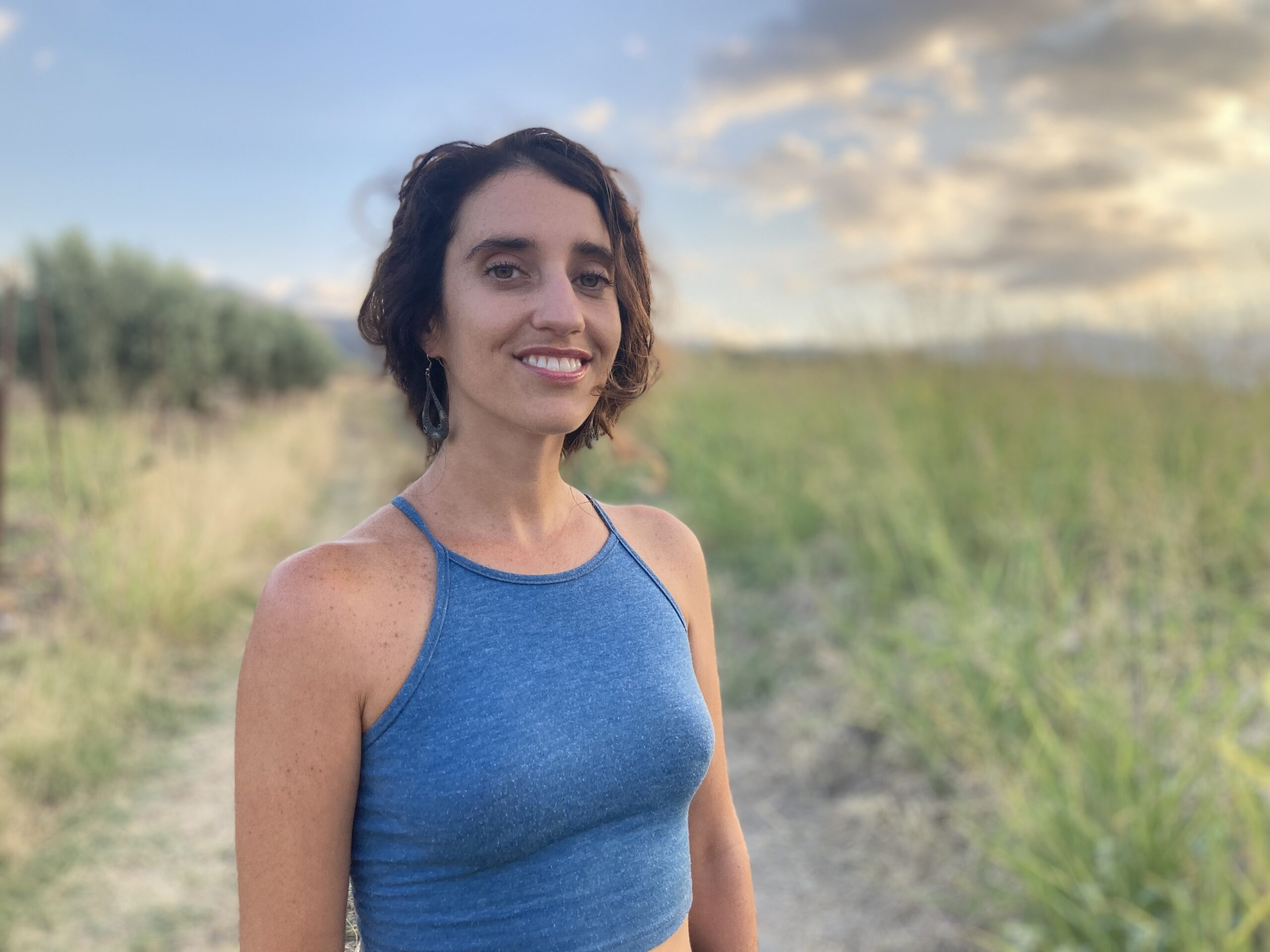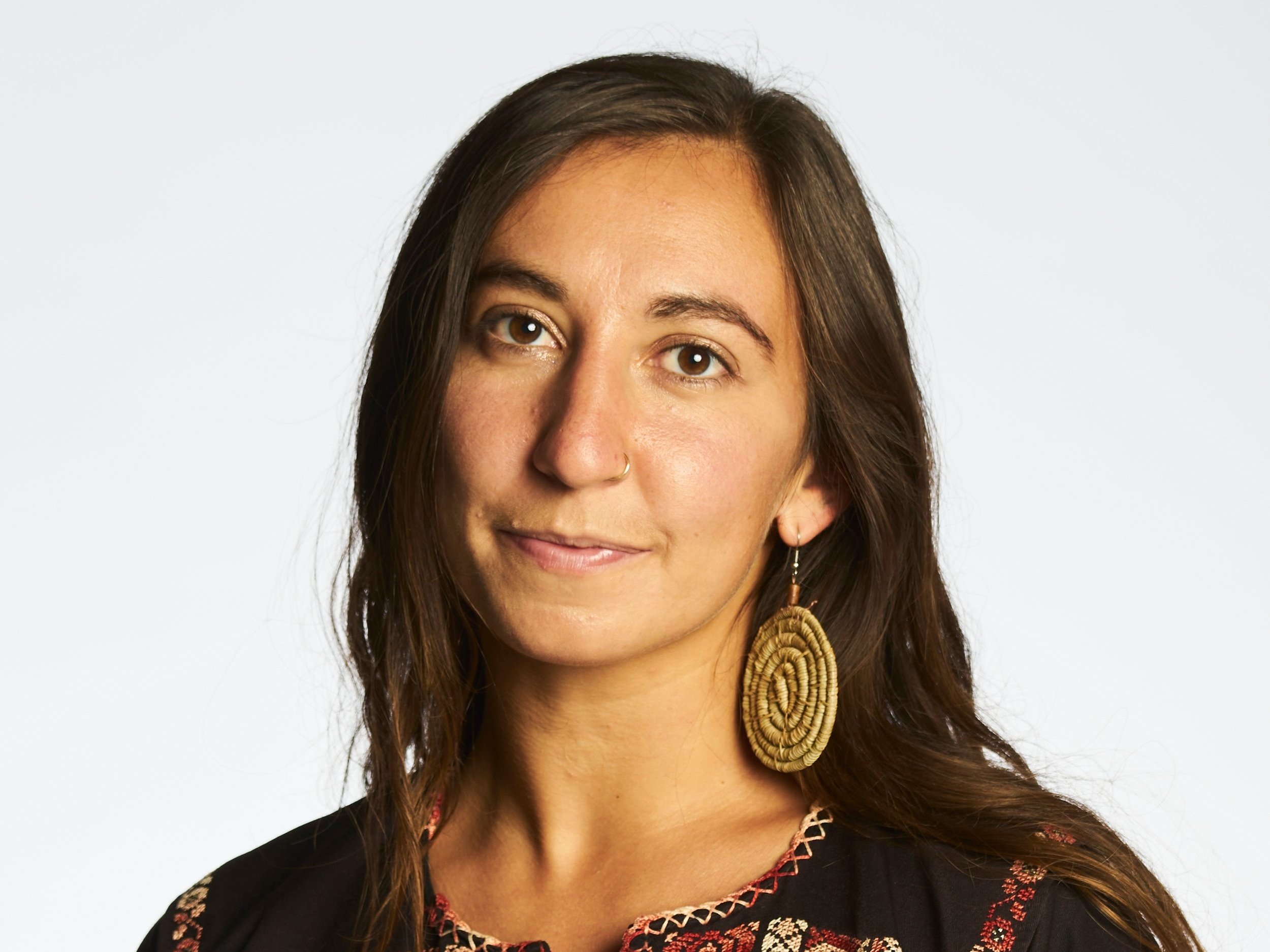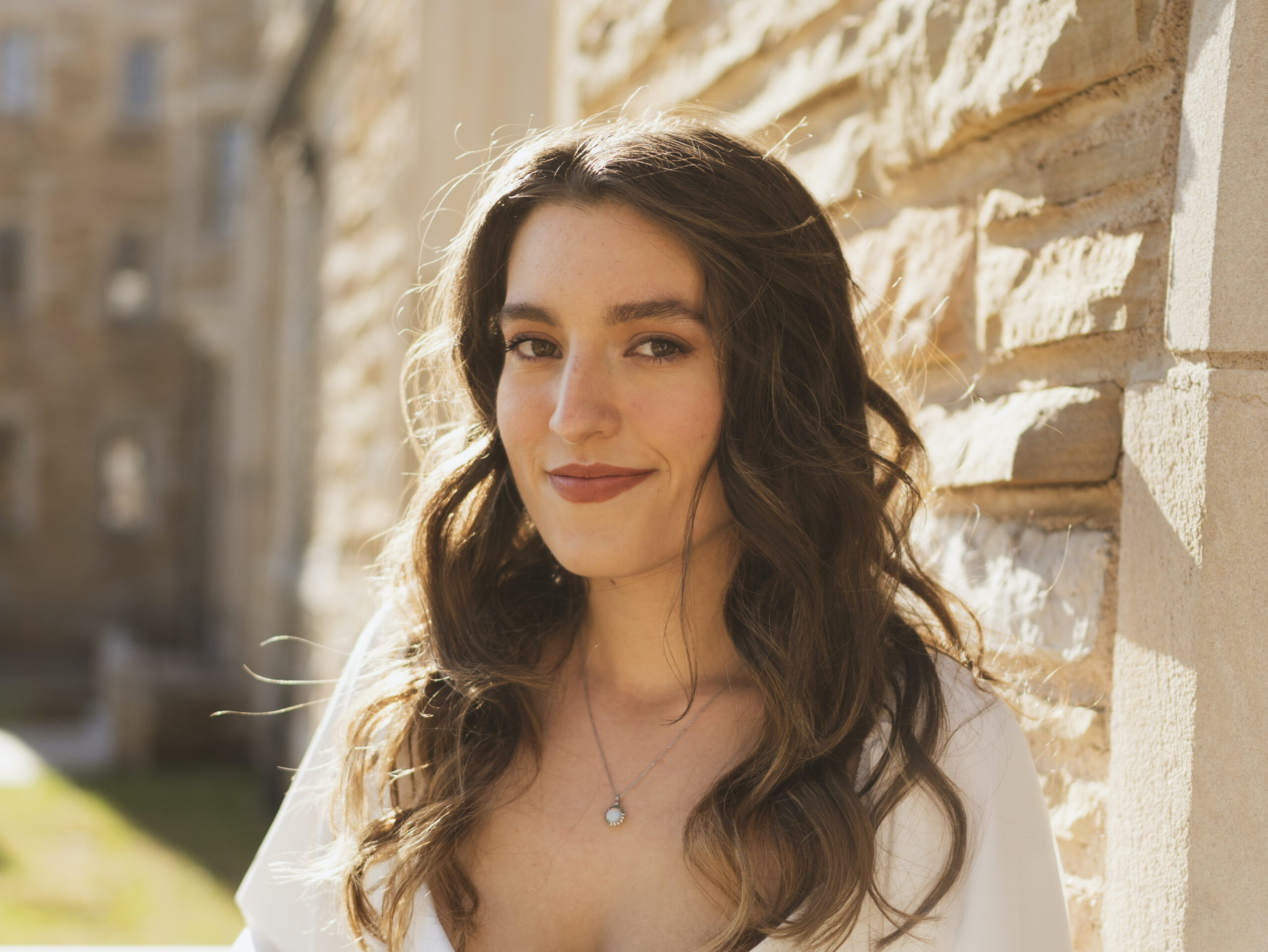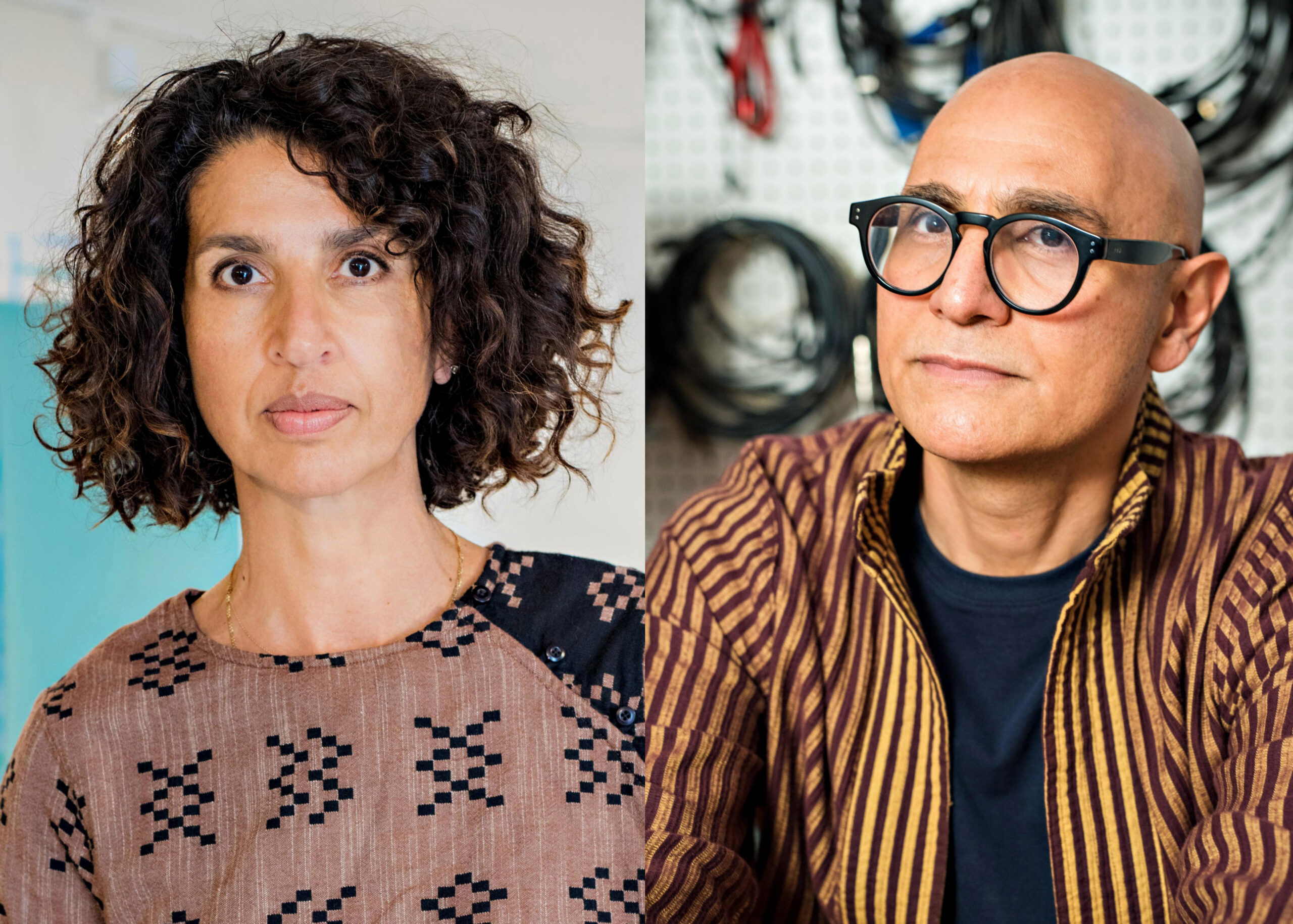Artists + Residents
The Arab American National Museum’s Artists + Residents program is a platform for established and emerging artists to cultivate and grow their practices while immersed in a supportive environment that encourages artistic collaboration and civic engagement in metro Detroit.
The residency welcomes diverse local, national and international artists with creative and critical projects related to the Museum’s mission, vision and values. With a studio apartment located ten minutes away from AANM, resident artists make Dearborn their home, delve into the everyday life of the most concentrated Arab community in the U.S. and connect with diverse communities from the metro Detroit area and the world for inspiration, dialogue and collaboration.
Subscribe to the Artists + Residents Substack!
Residents share reflections and updates on their residency projects.
Artists + Residents 2023-25 is generously supported by
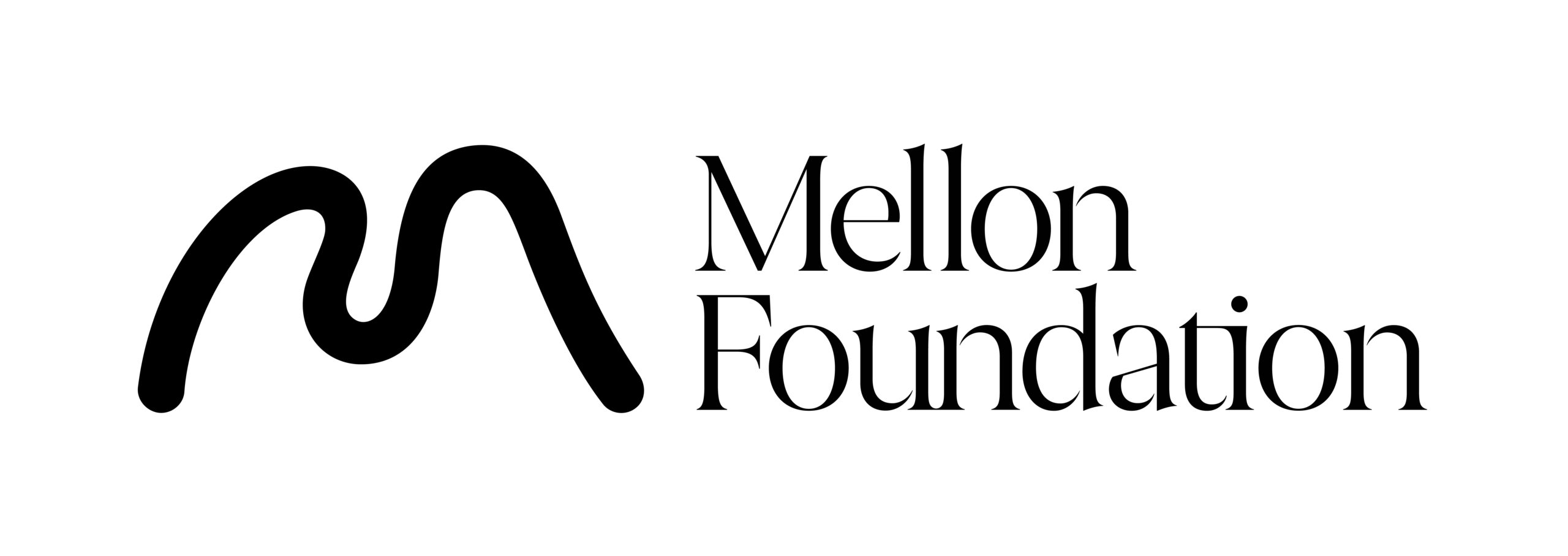
Made possible in part by

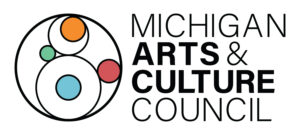
OPEN CALL
Artists + Residents applications are closed and will reopen in May 2026 for residencies in 2027. Watch the webinar, AANM Artists + Residents 101: Your Guide to Our Program, for more information about the residency.
Residency includes:
- Private, furnished studio apartment with live/work space, internet, kitchen, full bath and in-building washer/dryer
- Travel stipend for coming to and from the residency
- General stipend, including local travel, based on residency duration
- Access to AANM resources and community connections
For questions, contact aanmresidency “at” accesscommunity.org.
CURRENT & UPCOMING RESIDENCIES
PAST RESIDENCIES
Nadirah Mansour | Nov.-Dec. 2025

|
I Choose the Sparrow is a collection of speculative short fiction under contract with Hajar Press: the five short stories, five micro-fictions and novella are all interlinked. The themes of religion, history and nature thread through the collection; they reflect Mansour’s real-world experiences, from growing up in a Palestinian village to working as a historian/curator in a museum. The collection tells the story of a single family over two centuries. Each story is in a different genre –such as horror, folktale and adventure– or told with an experimental structure, including a story told largely through museum labels. The collection follows the characters as they navigate family ties, the Israeli occupation and Palestine itself, all the while realizing that they have special abilities that can change the way they live their lives. Additionally, Mansour will be working on workshops for the Dearborn community that tie together the themes of the writing project: nature, history and art.
N.A. Mansour (she/her/hers) is a Palestinian-Mexican historian, educator and writer. Her writing on food, culture, art and history has appeared in Eater, Bon Appetit, The Counter, Contingent Magazine, Vittles and more. Her first collection of fiction is under contract with Hajar Press, titled I Choose the Sparrow. Mansour’s historical research focuses on both the history of Muslim devotional manuscripts and Palestinian material history. She’s taught Palestinian history, archival science, Muslim contemporary literature, manuscript history and art history in both community and higher educational settings.
Andrea Shaker | Sept.-Oct. 2025
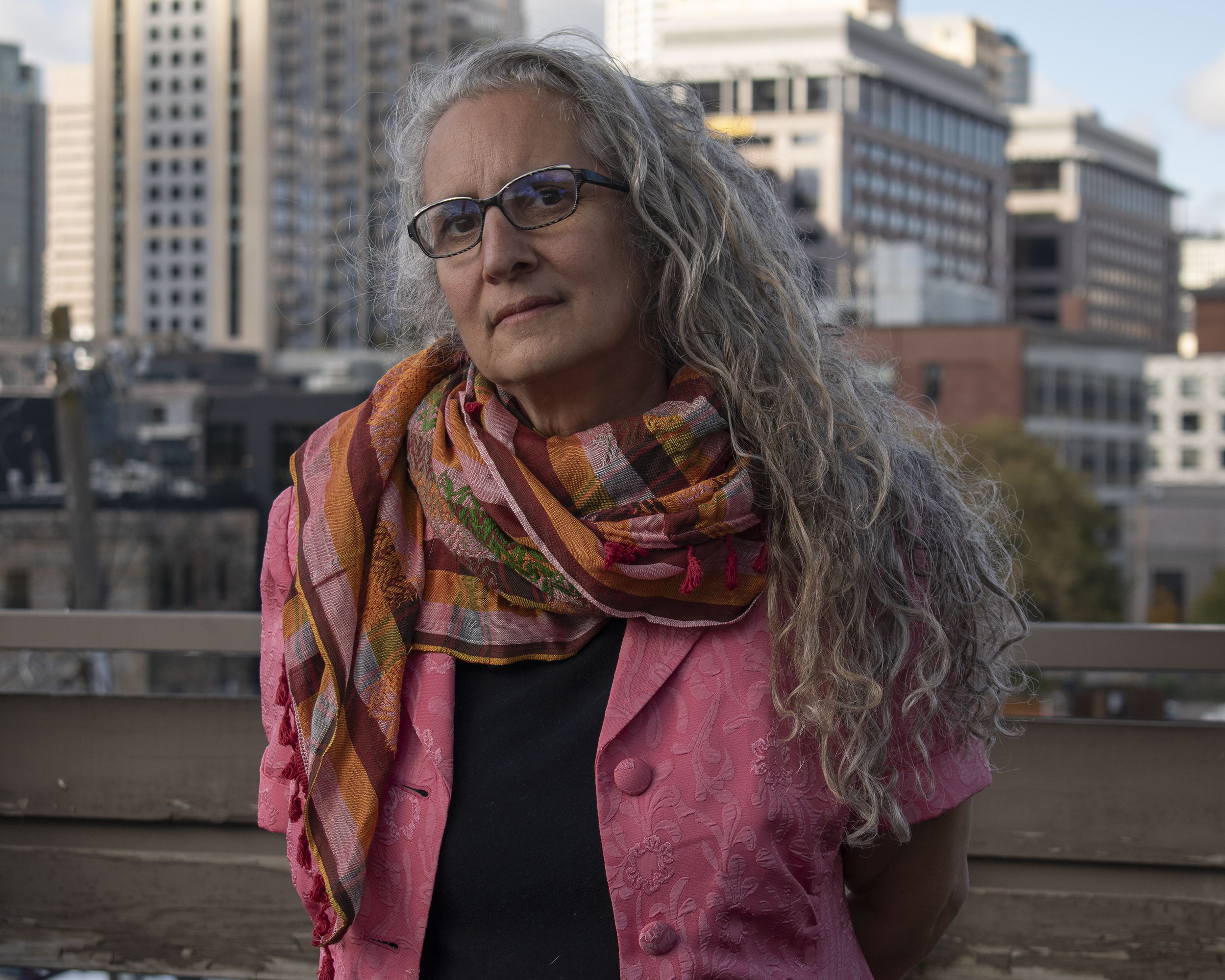
|
(re)claiming and (re)constructing my mother tongue is a series of accordion books that combine photographs, English and Arabic. The books explore Arab migrations to the US, specially focusing on experiences within transitory spaces, or those that are between homeland (land of origin) and new home (US). The books will also address the reclamation of the Arabic language lost to assimilation and the construction of a new mother tongue comprised of photographs. While in Dearborn, Andrea will be researching in the archives at the Museum and at the Center for Arab Narratives. During the first part of her residency, she will be writing, photographing and assembling artists’ books. During the latter part of the residency, she will be leaving copies of these books in public spaces for community members to discover and interact with. Along with a book, community members will also have a link to a Museum social media site to post responses and engage in a community dialogue.
Andrea Shaker is an Arab American artist living on Dakota and Anishinaable lands in mní sóta. Her creative work is interdisciplinary, spanning photography, experimental lm, installation, letterpress, artists’ books and writing. She has screened her lms at various venues including the Twin Cities Arab Film Festivals and the Walker Art Center. Andrea has published her written and image-based work in Mizna: SWANA Literature + Art (Issues 18.2 and 24.2) and in the anthology Home/land: Women, Citizenship and Photographies (Liverpool University Press). Her artists’ books are included in exhibitions such as: Poetry is Not a Luxury (MCBA, 2022), Mourning: Artists Books from the Arab World and Its Diaspora (upcoming, 2025), and Who Is America at 250: Artists’ Books on the State of Democracy (upcoming, 2026). She earned her BA from Georgetown University and MFA from the University of Illinois at Urbana-Champaign. She is a professor of art at the College of St. Benedict & St. John’s University and serves the vice president of the board of New Arab American Theater Works.
Raed | July-Aug. 2025
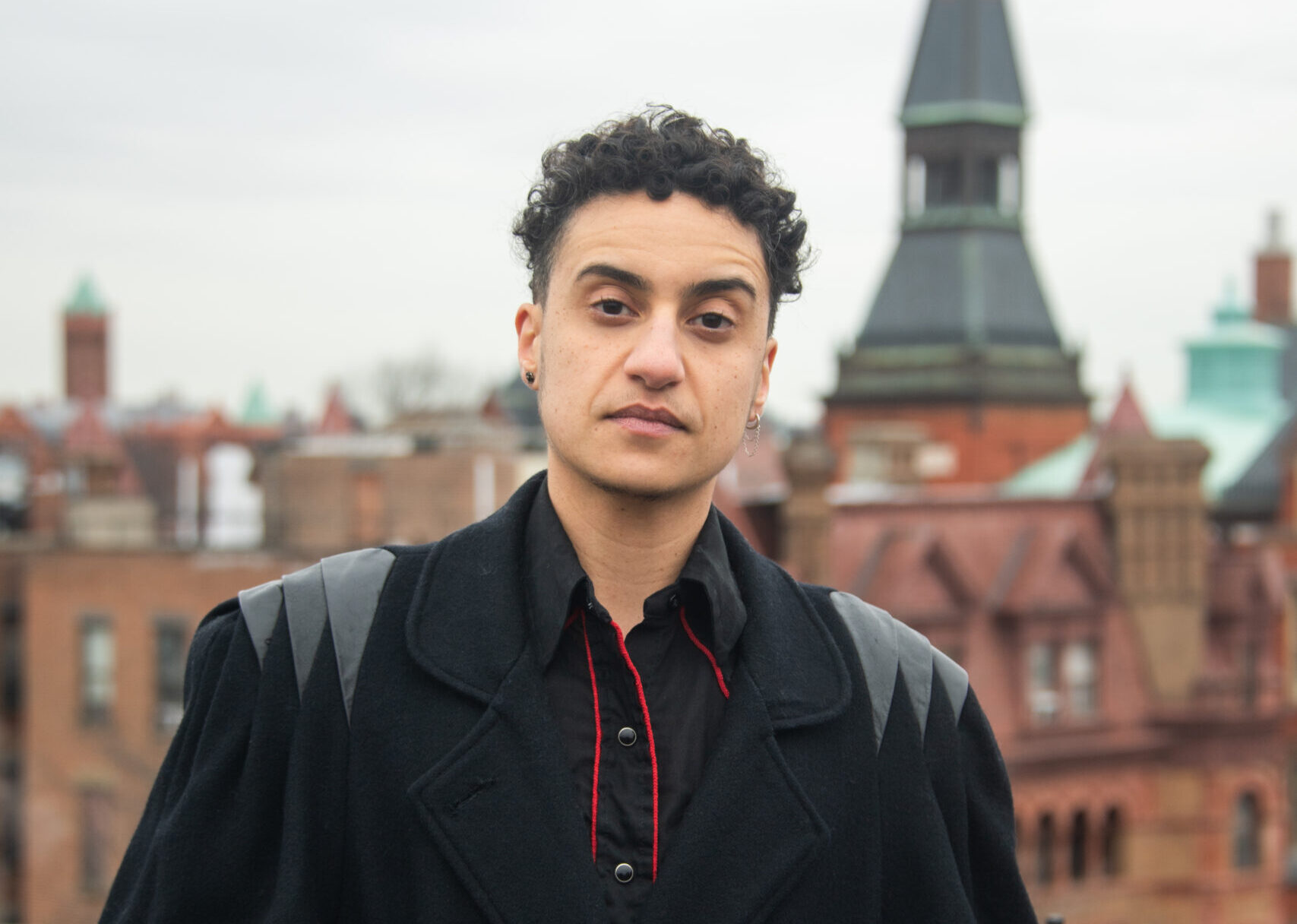
|
During their residency, Raed, primarily known as a DJ and curator, will delve into a series of sound experiments and noise studies to further expand their sound as Tagine Dream. This exploration will involve digitizing childhood tapes and researched SWANA music samples, incorporating these elements with synthesizers and drum machines. The SWANA music research will be crucial, as shifting legal media restrictions have made many of these tracks inaccessible on streaming services and music catalogues. Raed’s aim is to weave these found sounds into original goth and darkwave compositions, as a way of memorializing and preserving snapshots of music history. This residency offers Raed, whose focus has largely been on curation and community building, an opportunity to prioritize personal artistic development and production.
Raed‘s journey in music began in their teens, booking shows and honing their skills as a community radio DJ. This experience laid the groundwork for their studio production work with local bands and fueled a decade-long career spinning records on dancefloors, including iconic NYC venues like the Pyramid Club and Heathers. Their creative exploration also led to collaborations in short-lived bands, contributing synthesizer and vocals to the moody Chantaines and synthesizer to the noise outfit Lachrymatory. In 2019, Raed launched Tagine Dream, a project crafting guttural horror soundscapes that blend their love of new wave with subtle influences from SWANA music. Beyond performing, Raed is the founder and curator of YallaPunk, a queer and trans SWANA multi-disciplinary arts fest that has been reshaping the SWANA narrative since 2017. Their dedication to community arts was recognized in 2022 with the Transformation Award from Twelve Gates Arts. Raed also shares their expertise as a former adjunct professor in the Digital Media and Entertainment and Arts Management programs at Drexel University.
Photos are by Ashika Kuruvilla.
Andrea Assaf | July 2025
During her third residency, Andrea Assaf will present the first fully-staged production of DRONE, a new play by Joyce Award-winning playwright Andrea Assaf, with performances at Detroit Public Theatre. The multimedia play explores the drone as a metaphor for how we become desensitized to daily violence, domestic and global, the question of Moral Injury, and the effects of remote-control warfare on the human soul.
The 2025 production of DRONE was commissioned by the Arab American National Museum (AANM) with support from the Joyce Foundation’s 2024 Joyce Award. Additional support includes: New England Foundation for the Arts (NEFA) National Theater Project; National Performance Network (NPN) Creation & Development Fund, Artist Engagement Fund, and Documentation & Storytelling Fund; the Ford Foundation, and the Mellon Foundation. Art2Action’s early development of DRONE was supported by AANM, Contemporary Arts Center (CAC) New Orleans, Network of Ensemble Theaters (NET) TEN exchange grant with ArtSpot Productions, and Alternate ROOTS.
Andrea Assaf is a Lebanese American writer, director, performer and cultural organizer. She is the founding Artistic and Executive Director of Art2Action Inc., and Co-Director of the National Institute for Directing & Ensemble Creation in partnership with Pangea World Theater. Andrea’s recent original works include: DRONE. Andrea has also created and directed numerous community-devised works with veterans, refugees and youth. Her most recent directorial work can be seen in The Seasoned Woman by Andrea “Vocab” Sanderson with Lubana Al Quntar. Awards include 2024 Joyce Award; 2021 Director, Best Experimental Feature, Silk Road Film Awards Cannes, 2010 & 2015 Princess Grace Awards, and more. DRONE was also a 2019 NEFA National Theater Project. Andrea is a thought-leader in the national arts field, as a founding Board member of the Consortium of Asian American Theaters & Artists (CAATA), founding Board member of the Middle Eastern & North African Theater Makers Alliance (MENATMA), and a voting member of Alternate ROOTS. She has a master’s degree in Performance Studies and a BFA in Acting, both from NYU. For more information, visit art2action.org/artists/Andrea-Assaf
Sarah Rose Dahnke | May-June 2025
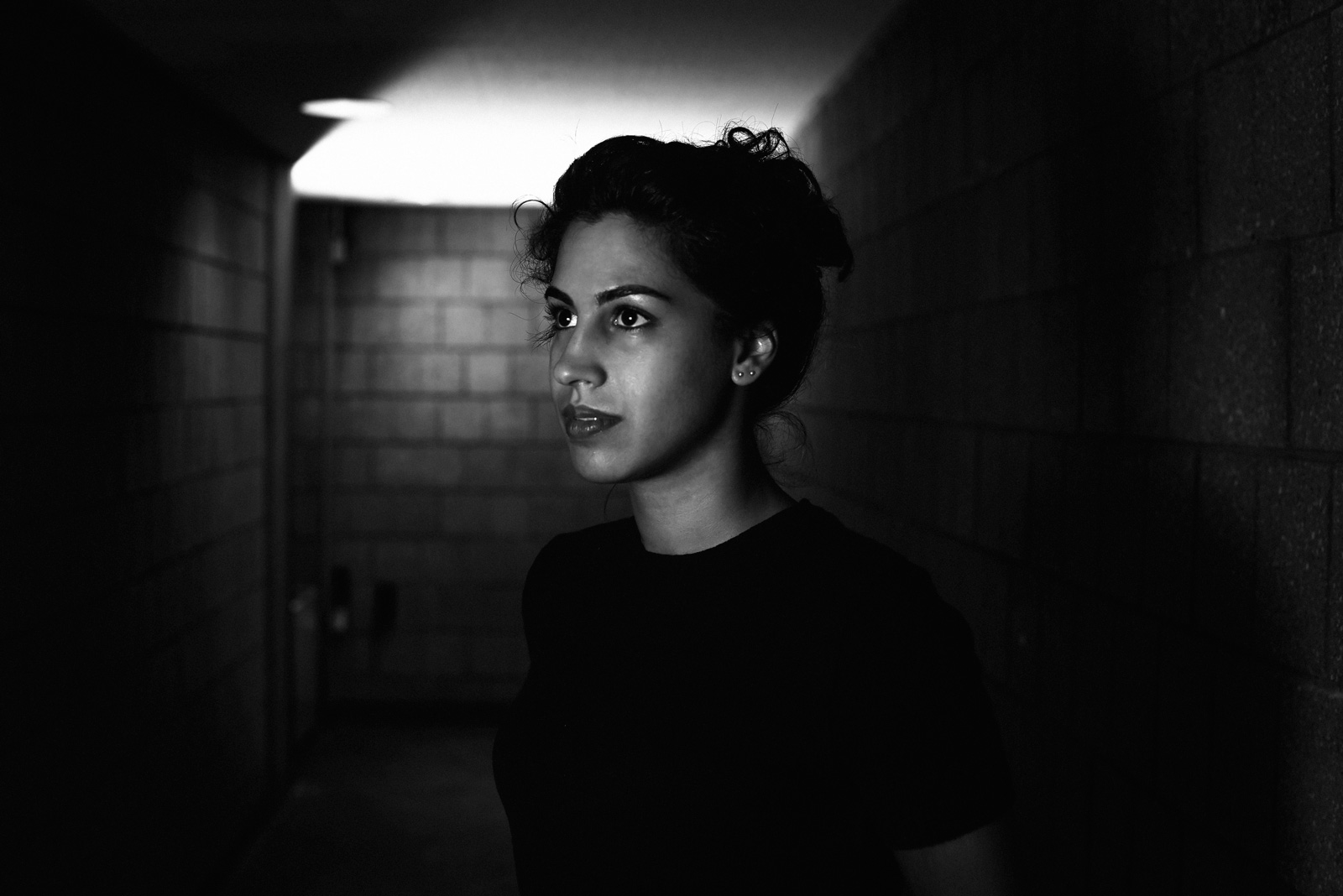
|
Blood Memory is a performance that investigates ancestral memory through movement, moving image and sound. It works to capture the fleeting, fractured experience of trying to understand where we came from when many of the ties have been broken. It asks: what memories are in our cells? What knowledge feels like it did not need to be taught? What does it mean to have a lineage, and what does it mean when that is fractured by displacement? Can we use the knowledge our bodies have to repair these fractures? Are the fractures repairable?
This project was born from Sarah’s own isolating experience as an Arab adoptee, raised in a non-Arab family and non-Arab community without knowledge of ancestral language, culture, religion or customs. Despite this, she has always felt a mystical connection to her ancestors. Sarah will be investigating stories of solo displacement in the Arab world and researching the often controversial topic of adoption in Islam. She will use these stories, in addition to her own, to create a series of movement scores, videos and audio recordings that will be woven together for a live performance. Through public workshops, Sarah will engage in communal dance making with participants to map out shared stories of displacement throughout the Arab world.
Sarah Dahnke is an Saudi-American choreographer, dance artist and arts educator deeply committed to empowering communities to use movement to reclaim narratives stripped away by colonialism. She’s a MAP Fund awardee, an NEA Our Town-funded resident artist, and a former awardee of fellowships from Gibney’s Moving Toward Justice, Target Margin Institute, New Victory LabWorks, and Culture Push. As a practitioner, Sarah specializes in devised performance and site-specific dance film. Her dance film work has been screened through the Dance Films Association, Tiny Dance Film Festival, DanceBarn Collective, BRIC, and Movies By Movers. In addition to making dances, she directs theater and opera. Sarah is a company member of New York-based theater company, Colt Coeur, and the second-ever recipient of the Crane Directing Fellowship at Opera Columbus. Sarah is also the artistic director of Dances for Solidarity, a project that co-creates choreography with people affected by the criminal legal system and performs for public audiences as advocacy toward prison abolition.
Leila Khoury | Jan.-March 2025
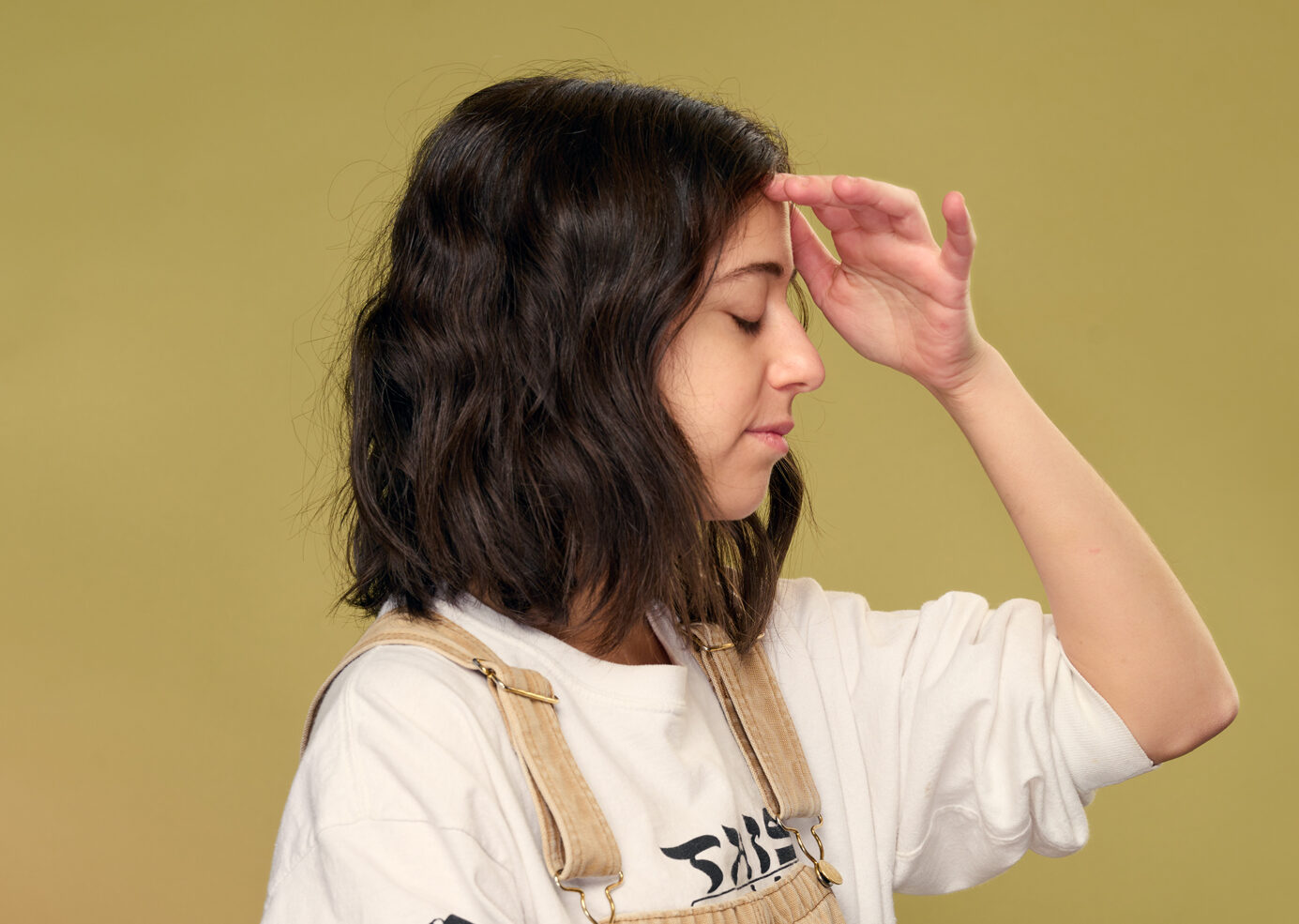
|
While in residence at AANM, Leila will be producing a box set of risograph-printed art books that highlight the Boycott, Divest, Sanctions (BDS) movement. These books aim to serve as a tool to educate US-based consumers, business owners, and cultural institutions on the specific goals of the movement, as well as to highlight the efficacy of boycott movements in recent history as forms of nonviolent protest. Through her design work, Leila intends to spend her time in Dearborn supporting the existing efforts of local organizers leading BDS campaigns throughout Greater Detroit.
Leila Khoury is a multidisciplinary artist based in Cleveland, Ohio. Khoury received her BFA in Interdisciplinary Sculpture from the Maryland Institute College of Art and her Master of Architecture and Certificate in Historic Preservation from the School of the Art Institute of Chicago. Khoury’s 3D practice engages sculpture, ceramics, installation, and set design. She has authored three fine art books; Complex Structures: Indelible Stories of Coming Home (2023), Among Relatives: Indigenous Voices in the Cuyahoga Valley (2022), and A Soulful Body: The Immigration and Placemaking of Arabs in Detroit (2020). Each of these books highlight the built environment of a respective Midwestern community and was made in close collaboration with members of that community. Khoury’s work has been featured in solo and group exhibitions in Cleveland and Columbus, OH; New York City and Troy, NY; Chicago, IL; Baltimore, MD; Washington, D.C.; Pittsburgh, PA; Waukesha, WI; and Subhan, Kuwait. Between June and September 2018, two works by Khoury were featured in the National Museum of Women in the Arts’ exhibition series, Women to Watch. She was recently awarded the PROOF Printmaking Fellowship at Zygote Press (Cleveland, Ohio) and has an upcoming artist residency with SPACES, Cleveland.
Bazeed | March-May 2025
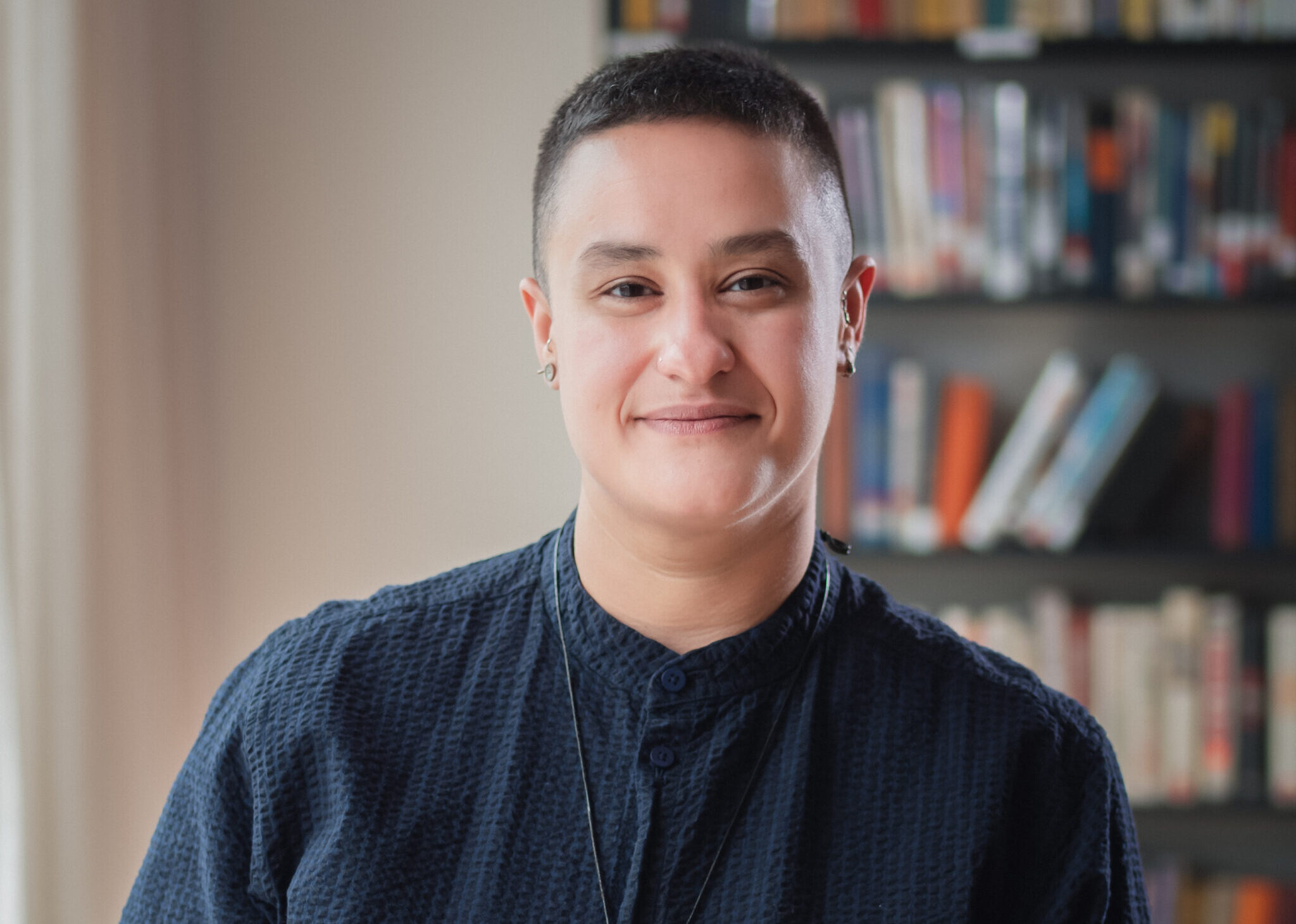
|
While in residence, Bazeed will be working on their multilingual play, Ceasefire Later, a piece of documentary, verbatim theater that narrates the machinations of propaganda, corrupt international governance, and capitalist conspiracy enabling the genocide of Palestinians since 1948, with a focus on the decimation of Gaza’s population and infrastructure since Israel’s latest assault, beginning October 2023. Utilizing various verbatim sources, such as social media reels, legacy media content, talk show roundtables, government press releases, official state addresses, and Palestinian poetry and prose, among others, Ceasefire Later attempts to write a biography of these complicities birthing the most shared, most witnessed, most spun genocide in the history of our species. Upon the completion of their residency in May, a draft of the play will be presented in June 2025 in NYC, as part of The Civilians’ Findings series of staged readings. During their residency, Bazeed will also offer a generative writing workshop on erasure and documentary poetics, open to any and all interested; no previous knowledge or experience with poetry required.
Bazeed is a multi–award winning Egyptian immigrant, playwright, poet, performer, plant-dad, editor, curator, masticator, medical school dropout, licensed massage therapist and very decent cook, living in Brooklyn. An alliteration-leaning writer of prose, poetry, plays and pantry lists, their work across genres is published in print and online, while their plays have been performed on both sides of the Atlantic. Their poetry and prose are published or forthcoming from Poetry, the Evergreen Review, Driftwood Press, Foglifter, and The Margins, among others. Their first play, peace camp org, is published by Oberon Books, UK, and won them the Spirit Award at the Fresh Fruit Festival in 2018, and the Dramatists Guild’s Lanford Wilson Award in 2021, among other accolades. Their bilingual play, Kilo Batra: In Death More Radiant, written with Kamelya Omayma Youssef, and co-created with A Host of People, was their first work to be commissioned and presented by the Arab American National Museum. They’re very excited to be back! To procrastinate from facing the blank page, Bazeed talks to the multitudes of plants they maintain in their Brooklyn hermitage, and is a slow student of Arabic music.
Eli Tareq El Bechelany-Lynch | Oct.-Nov. 2024
| 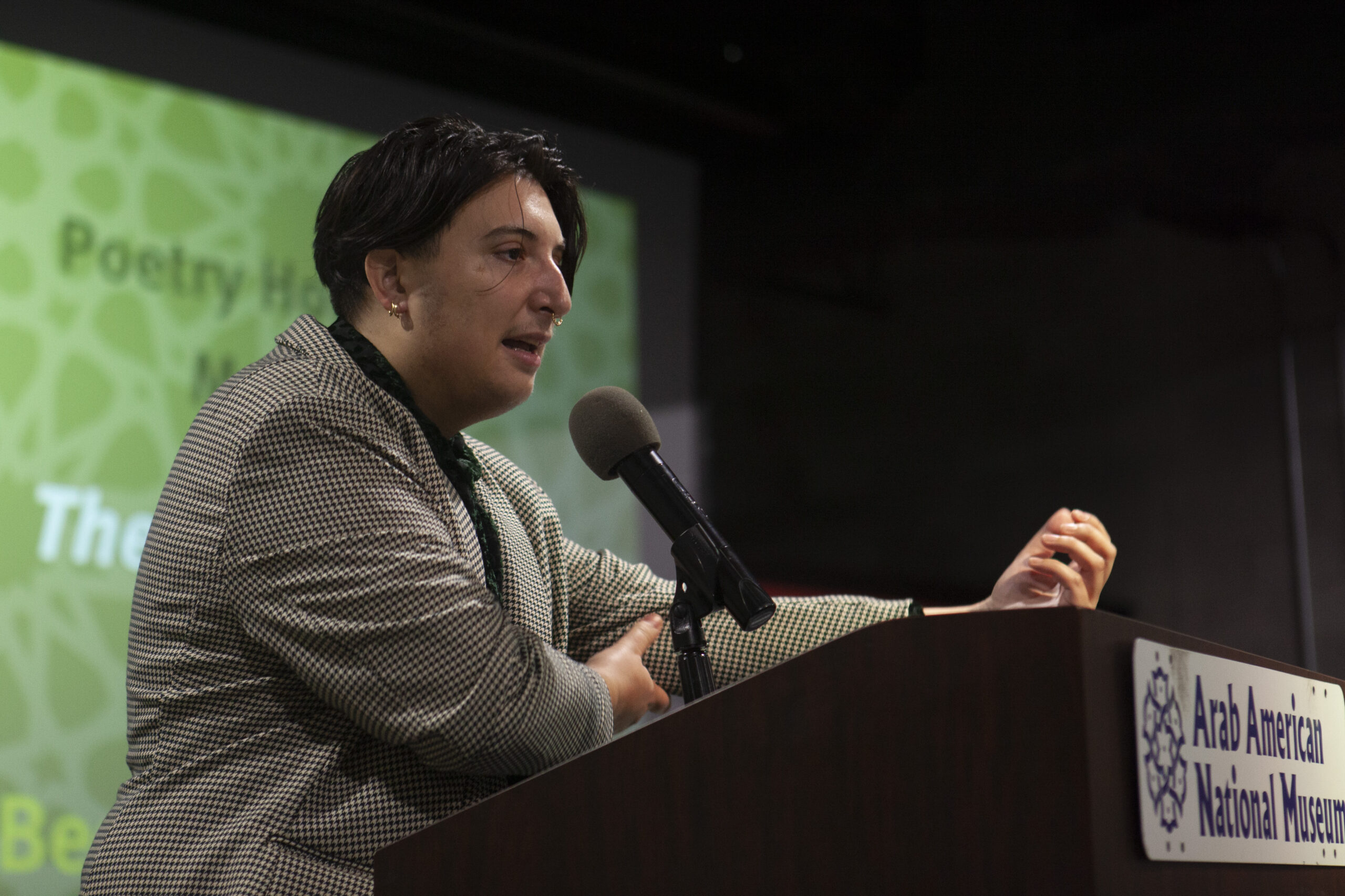
Primarily a poet, Eli Tareq El Bechelany-Lynch will use this residency in order to work on a first novel. Leila and the Oud is a novel-in-progress that deals with diasporic identity, queer identity, mixed-race identity, the narratives we build about ourselves, and what we inherit from our families and ancestors. After a friend mentions a new study to Leila, one that shows that certain skills might be inherited and passed down through one’s genes/ancestral lineage, Leila gets it in their head that they can master the oud easily and quickly, remembering stories of great grandparents and distance cousins who played the instrument. When Leila starts lessons with 3amo Fady, a family friend, they realize that playing the oud was an attempt at connecting to a familial history they know nothing about. Having to learn what it’s like to not be good at something immediately for the first time, Leila has to rethink the stories they’ve told about themself and discover who else they might be. Filled with queer friends and 6 step mothers, the novel also plays with humour and levity while contending with large questions. Inspired by multimetanaritive novels Koolaids by Rabih Alameddine and Notes of a Crocodile by Qui Miaojin, Eli Tareq will be using the residency to experiment with the novel form, and finding the balance between the poetic and the narrative.
Eli Tareq El Bechelany-Lynch is a mixed race (Lebanese/white settler) writer, translator, and acquisitions editor at Metonymy Press living in Tio’tia:ke. Their first book, knot body, was published by Metatron Press in 2020, and their second book, The Good Arabs, published by Metonymy Press in 2021, was granted the honorary mention for poetry by the Arab American Book Awards, the Khayrallah Prize honorary mention, and won the Grand Prix du Livre de Montréal. Their translation, Dandelion Daughter, of Gabrielle Boulianne-Tremblay’s La fille d’elle-même was published in Spring 2023. With co-editor Samia Marshy, they are editing El Ghourabaa, an anthology of queer and trans writing by Arab and Arabophone writers, forthcoming Spring 2024.
Ebti | Sept. 2024
|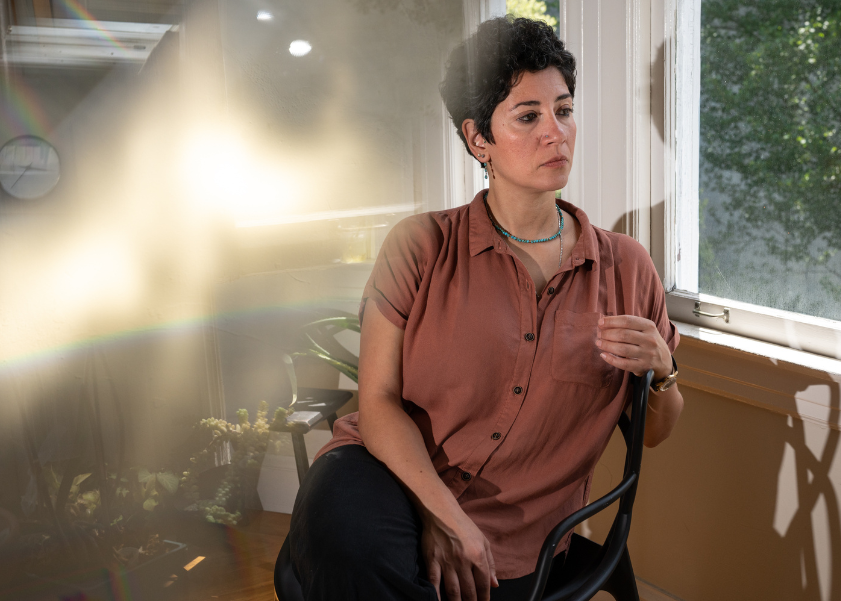
During her residency, Ebti will look into the archives at the Arab American National Museum and work with the community to create a storybook of objects, a literary archive of sorts that tells our stories through the object we may have been carrying around with us to feel like we belong. Borrowing the title of Sherihan’s Fawazeer, Ebti hopes to engage in a conversation around what unites us as people with different histories, coming from different countries and now being “united” by a common denominator and have this conversation through objects.
How do we make home using objects?
What do we put in our bags/luggage when we leave?
How do objects give us a sense of grounding and belonging?
What stories would the objects tell if they could speak, what language would it be in?
What memories do these objects and items hold?
Ebti is a multidisciplinary artist, a self-taught photographer and a translator living between Cairo and San Francisco. She has an MA in translation and intercultural studies from Johannes Gutenberg Universitat, Mainz, and an MFA in Fine Art from California College of the Arts. Ebti is part of “Right window” collective, “Off Hours” collective and is sitting on the curatorial council at Southern Exposure Gallery in San Francisco. Her work was shown in galleries around the US and Egypt. She currently teaches visual arts and photography at Performing Arts Workshop in San Francisco, Bay Area.
Noah Shankool | July-Aug. 2024
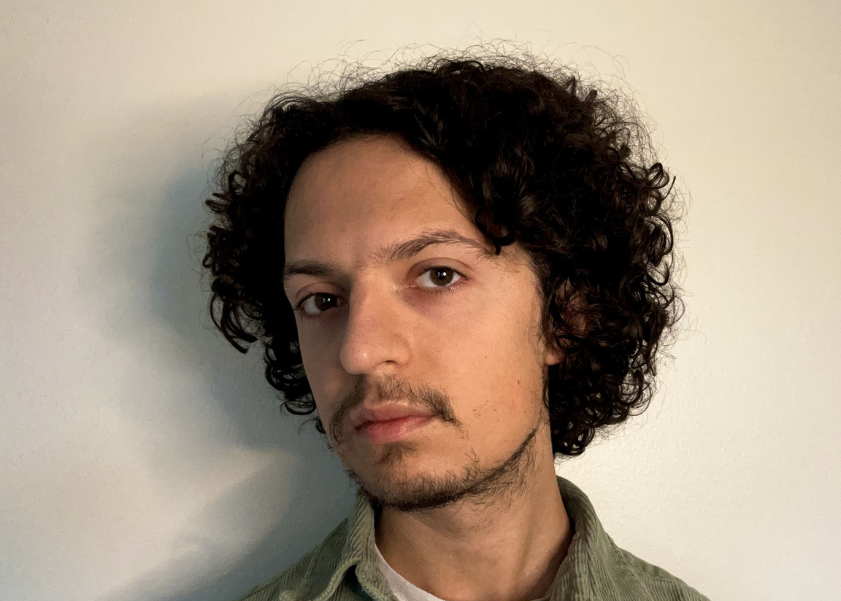
Arabizing The Digital Audio Workstation is a five song EP produced electronically and influenced by styles of Arabic music. Its focus is on the fact that audio mixing softwires, known as Digital Audio Workstations (DAWs), privilege the production of Western styles of music. These programs limit the user to certain instruments, scales, and keys that are default presets in most DAWs. This project will challenge these softwares through designing new instrument emulations, experimenting with rhythmic elements, and programming scales not present in the Western lexicon. Arab musicians within the community will contribute to the project by recording their “organic” playing to blend with the electronic process. These recordings will be used for sampling, overdubs, and to design synth patches that mimic the instruments’ sonic palette. The project will explore Arab American identity by creating compositions that honor tradition while simultaneously embracing the future.
Noah M. Shankool is a Chaldean musician, producer and audio engineer who’s been active since 2017. Since the release of his first EP, he’s been a part of numerous bands, recording projects, and live sound companies. Shankool’s work explores societal changes and inner struggle through playful grooves, juxtaposition of sonic palettes, and commentary focused lyricism. Combining an electronic workflow with organic sounds, his music constantly rides the line of familiar and refreshing. The thought provoking subject matter mixed with danceable rhythms makes the songs as engaging as they are fun. Shankool holds a BS in Multimedia Arts Technology from Western Michigan University and is currently based in Kalamazoo.
Zein El-Amine | June-July 2024
| 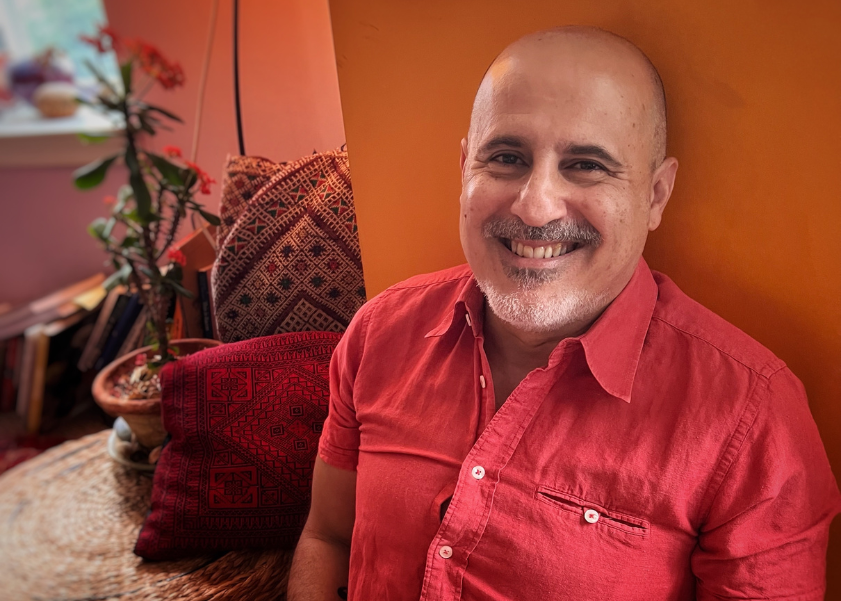
Remittance: The Internal Immigrant is a novel that will center around the lives of expats and immigrants in Saudi Arabia. It will focus on life in the compounds where the expats live and follow a triangular relationship between an American couple and a Lebanese youth. The novel will explore the dysfunction in these compounds, social pressure cookers in a country of social deprivation. During his residency, Zein will be writing in the morning and doing research in the afternoon, utilizing the resources of the Arab American National Museum for some of that research.
Additionally, Zein will hold a writing workshop and a final lecture, which will include reading excerpts from his short story collection, Is This How You Eat a Watermelon? The first lecture will be on revision and tension in writing, where Zein will share his favorite writing resources. The second lecture will be on travel writing, where Zein will talk about how to write stories with multiple settings that are geographically disparate.
Zein El-Amine is a Lebanese-born poet and writer. He has an MFA in Poetry from the University of Maryland. His poems have appeared in Wild River Review, Folio, Beltway Quarterly, Foreign Policy in Focus, CityLit, Graylit, Split This Rock, Penumbra, DC Poets Against the War: An Anthology, Ghostfishing: An Eco-Justice Poetry Anthology and We Call to the Eye & the Night: Love Poems by Writers of Arab Heritage. His latest poetry manuscript, A Travel Guide for the Exiled, was shortlisted for the Bergman Prize, judged by Louise Glück. Zein was awarded The Megaphone Prize by Radix Media for his collection of short stories titled Is This How You Eat A Watermelon? The book was nominated for the PEN/ROBERT W. BINGHAM PRIZE FOR DEBUT SHORT STORY COLLECTION. Zein lives in Washington, DC, teaching creative writing and global literature at Georgetown University.
Aneesa Shami Zizzo | May 2024
|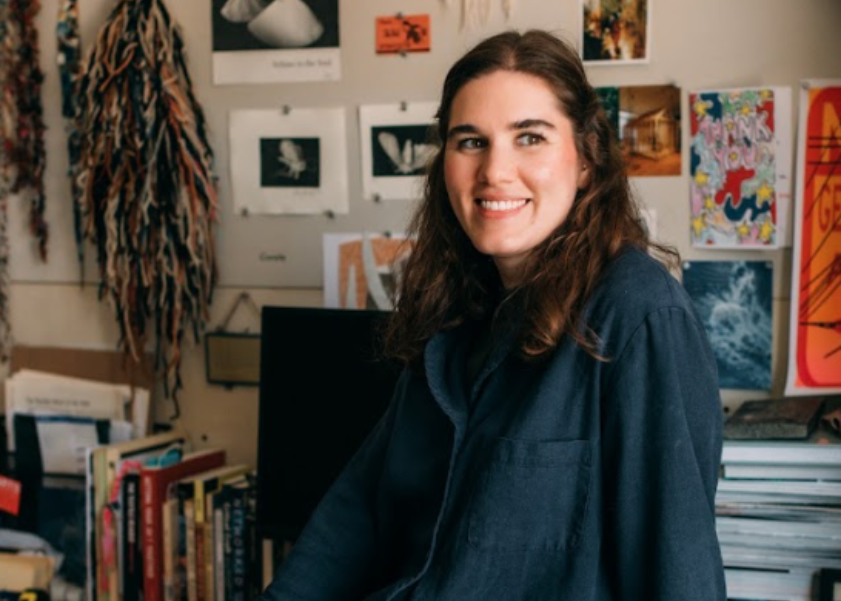
Bedtime Stories for Yuri is a series of appliqued tapestries Aneesa is creating for her two-year-old son, Yuri, which are visually inspired by vertical scrolls, Mughal paintings and Arabic calligraphy. These tapestries contain abstract illustrations referencing stories from her childhood and Arab ancestry that she wants to share with her son. This work is an emerging series exploring how one shares ancestral knowledge, life lessons and legacies with their children, both as a caregiver and an artist.
Recently, Aneesa’s practice has centered on explorations of her identity as a second-generation Arab American. She is interested in the innate human desire for storytelling, and much of her work revolves around the regenerative themes of life journeys, transformation and continual self reflection. Using reclaimed fabric samples from Los Angeles-based textile companies, Aneesa is able to create new worlds and stories with otherwise disregarded materials. Making while meditating is an important part of her practice as an artist and arts-based researcher, embedding her subconscious thought process into each piece while methodically hand stitching.
Aneesa Shami Zizzo is an artist and arts-based researcher in Los Angeles upcycling materials to create fiber art. Her work references the sublime and world mythologies to evoke a sense of the collective unconscious within her imagery. Zizzo holds Bachelor of Fine Arts degrees in both Fiber and Art History from the Kansas City Art Institute. She was the Textile Arts | Los Angeles AIR at Helms Design Center in 2018, and was a Fellow for the Mildred’s Lane Attention Labs: Order of the Third Bird in 2015. Zizzo’s work has been exhibited nationally in galleries and museums, including the Torrance Art Museum, the San Luis Obispo Museum of Art and the California Center for the Arts, Escondido Museum, among others. She is also the co-owner and director of Studio 203, an artist-run space in Los Angeles promoting fiber art, craft-based work and social practices.
During her residency, Aneesa will continue building on her body of work and create new tapestries for the Bedtime Stories for Yuri series. She will also host a series of workshops centered around themes of parenthood/caregiving and healing generational trauma through crafting, sharing her techniques and creative process with the AANM community.
George Abraham & Fargo Tbakhi | April 2024
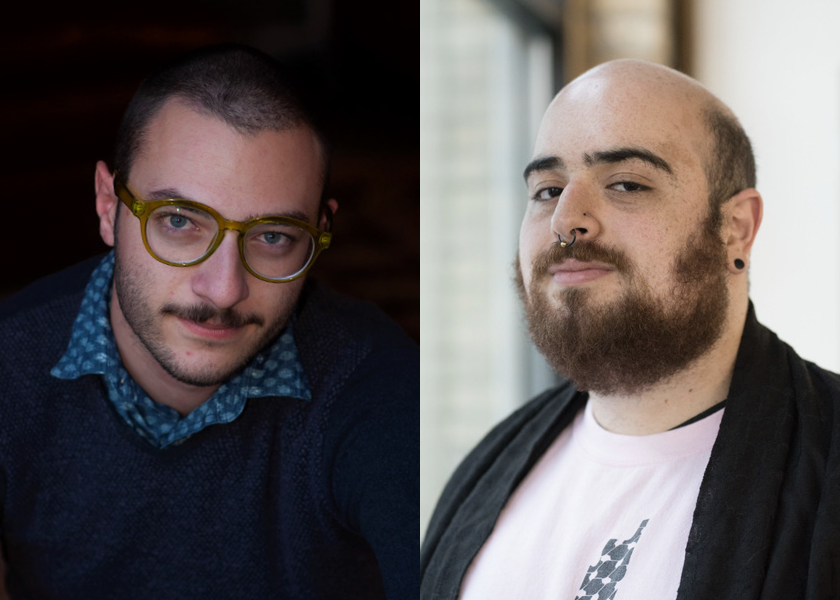
George Abraham and Fargo Nissim Tbakhi will continue the development of their collaborative performance project EVE. A National Performance Network co-commission with the Arab American National Museum, Mizna and Silk Road Rising Theater, as well as a 2022 MAP Fund recipient, EVE shatters John Milton’s Paradise Lost in order to build a liberatory, decolonial space of queer Palestinian subjectivity. Writing through the long middle of revolution, EVE combines Abraham’s rigorous experimentation in poetic form with Tbakhi’s abstracted performance practice to deconstruct and reconstruct Paradise Lost towards a queer Palestinian fabric of survival, revolution and divinity. Working across puppetry, song, poetry and conceptual multimedia performance art, Abraham and Tbakhi explore the emotional and textual landscapes of Paradise Lost, extracting and mutating its pieces into a Palestinian hymn.
During their second residency at AANM, George and Fargo will be rewriting the text of the performance as well as working to redefine its shape, after an initial draft which premiered at the Arab American National Museum in December of 2021. They will share a reading of a revised version of the work, followed by a feedback session with audience and community members, facilitated by Fargo. The reading will be hosted in partnership with the Arab American Studies Association.
Fargo Nissim Tbakhi is a queer Palestinian American performance artist and writer. He is the winner of the Ghassan Kanafani Resistance Arts Prize, a Pushcart and Best of the Net nominee, and a Taurus. He has received fellowships from Rhizome DC, VisArts, Desert Nights Rising Stars, Halcyon Arts Lab, Mosaic Theater and RAWI. His writing appears in Foglifter, Mizna, Peach Mag, Apex Magazine, Strange Horizons, the Shallow Ends, Prolit and select bags of Nomadic Grounds Coffee. His performance work has been programmed at OUTsider Fest, INTER-SECTION Solo Fest, the Rachel Corrie Foundation’s Shuruq Festival, the Alwun House Monster’s Ball, Mosaic Theater and has been supported by the Arizona Commission on the Arts. www.fargotbakhi.com
George Abraham (they/هو) is a Palestinian American poet. Their debut poetry collection Birthright (Button Poetry, 2020) won the Arab American Book Award and was a Lambda Literary Award finalist. They are currently executive editor for Mizna, and are a recipient of fellowships from Kundiman, the Arab American National Museum, Sewanee Writers’ Conference, National Performance Network and more. They are currently co-editing a Palestinian global anglophone poetry anthology with Noor Hindi (Haymarket Books, 2024) and are a Litowitz MFA+MA candidate at Northwestern University. www.gabrahampoet.com
Lubana Al-Quntar | March 2024
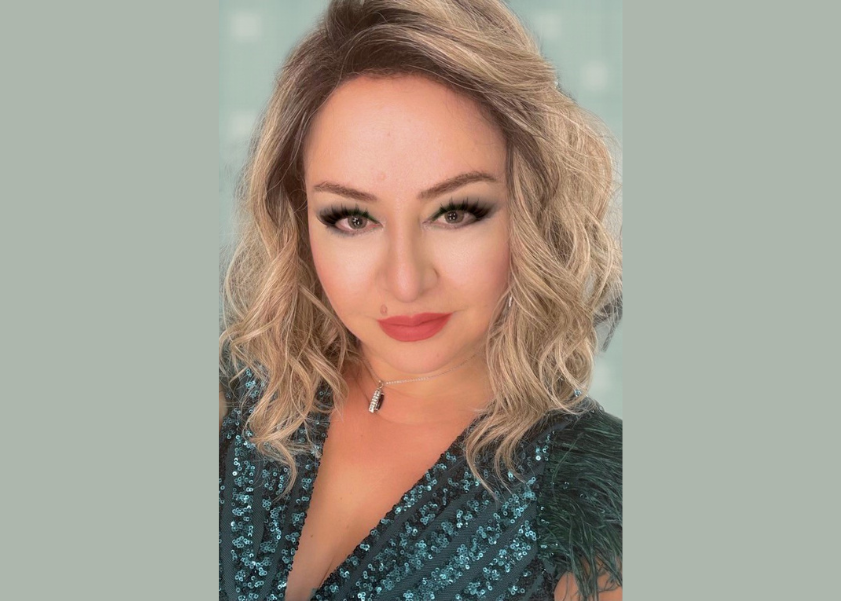
|
During her residency, Lubana will start an Arab American choir, where participants will dive into the intricate melodies of Arabic music. Lubana and the choir will perform at a concert in March.
Lubana Al-Quntar comes from a Syrian family that is deeply rooted in classical Arabic music. She is related to singer/actress Amal Al Atrash (known by her stage name, Asmahan) and her brother, renowned composer and singer Farid Al Atrash. These connections influenced her musical path and played an important role in her decision to seek a career as a professional singer. Born in Syria, she began singing at an early age and had an unusual gift for singing challenging sung poetry from childhood. Today, Lubana performs a wide range of repertoires in the Arabic music canon, including classical, contemporary, folk and pop genres. Her expressive voice allows her to add luster and richness to the various singing styles. In addition to traditional Arabic song, Lubana studied opera and became the first Syrian opera singer to attain international recognition, appearing in concerts throughout Europe. She returned to Syria to head the Department of Opera Singing and launched the Department of Classical Arabic Singing at the Syrian National Conservatory. She established the Arabic Music Singing Ensemble that performed across the Middle East. She came to the United States in 2012 and has since performed in numerous venues across the country in addition to her European performances.
LubDub Theatre Co. | Feb. 2024
|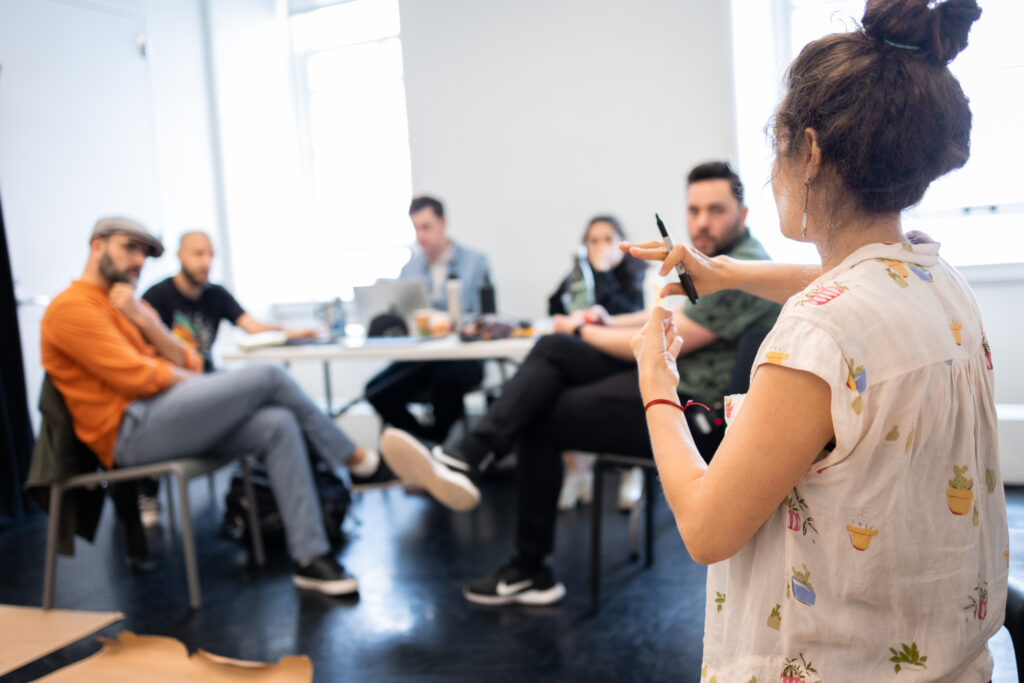
The Magic Bullet is a transdisciplinary performance about an ensemble of seven contemporary artists trying to tell the story of a French colonial magic show that took place at Algiers’ Bab-Azoun Theatre in 1856. As the ensemble attempts to confront the legacy of this historical performance, an overlapping, intersecting sea of stories unfolds across space and time, defying a global legacy of colonization and reclaiming the liberatory potential of magic.
The project is inspired by historical accounts of the marabouts—Sufi mystics who animated Algeria’s massive revolt against French colonial rule in the 19th century—and by the story of renowned French stage magician Jean-Eugène Robert-Houdin, who crossed the Mediterranean on an imperial mission to prove the superiority of European conjuring over the miracles of Algerian rebel mystics and indigenous spiritual leaders. Drawing on archival sources, ritual, original writing, stage magic and documentary filmmaking, The Magic Bullet offers an uncanny confrontation between the power of illusion and the illusion of power. AANM will host a share-out of The Magic Bullet as a work-in-progress on Feb. 23.
The Magic Bullet is created by LubDub Theatre Co. with the following ensemble of generative artists: Caitlin Nasema Cassidy, Noelle Ghoussaini, Pierre Jampy, Ismail Khalidi, Mohamed Yabdri, Geoff Kanick and Robert Duffley. The Magic Bullet is a National Performance Network (NPN) Creation & Development Fund Project co-commissioned by Pangea World Theatre in partnership with the Arab American National Museum, Noor Theatre, and NPN.
LubDub Theatre Co. is an NYC-based company of artists that animates stories of science, magic and myth. LubDub creates ambitious, athletic work at the intersections of new writing, music, movement and immersive performance. LubDub’s work has been produced around the world with translation into 10+ languages. Current projects include: To Tell A Story About the Earth (commissioned by Concord Theatricals), The Magic Bullet (co-commissioned by Pangea World Theatre in partnership with the Arab American National Museum, Noor Theatre, and National Performance Network), and A Play for the Living in a Time of Extinction (Susan Smith Blackburn Prize Finalist currently on a sustainable tour of Europe, Asia, and the UK). Learn more at lubdubtheatre.com
Yahya Ashour | Jan.-Feb. 2024
|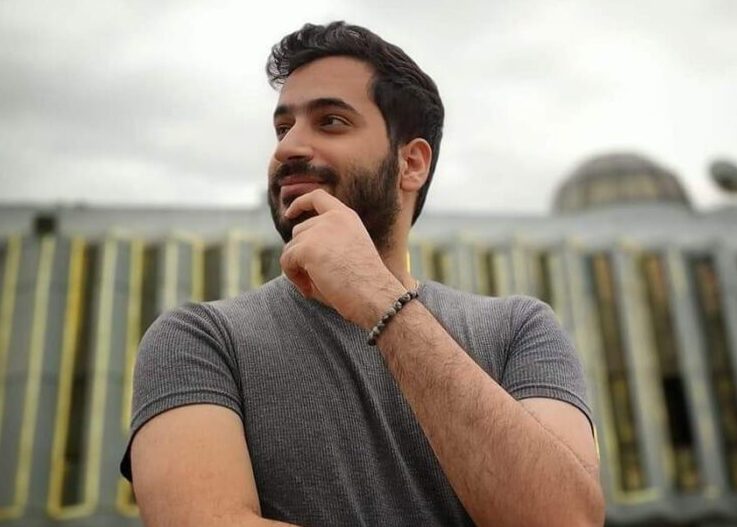
During his residency, Yahya will spend his time writing, editing and translating his own poems about Gaza. These poems will be part of a forthcoming collection. He will also be participating in several readings around the country.
Yahya Ashour was born in Gaza City on April 22, 1998. He’s a touring poet and an award-winning author. He’s a 2022 Fellow in Writing at the University of Iowa. Yahya has published one poetry collection, titled You’re a Window, They’re Clouds, and one children’s book, titled That’s Why Ryan Walks this Way, in Arabic and he has contributed to several printed anthologies and online journals worldwide. His writing has been translated into English, French, Spanish, Italian and Finnish. He has delivered several creative writing workshops for children and youth in Gaza. In 2020, Yahya earned a BA in Sociology and Psychology. Follow him at @yahyaashour98
Doris Bittar | Oct.-Nov. 2023
|
AANM premiers Doris Bittar’s Colonial Colonnade, initially supported by ArabAmp through the California Arts Council, the Puffin Foundation, and anonymous sources. Colonial Colonnade partners Arabic and English as a nonlinear and unsequenced format of words without start and end points. Facets of the exhibit include cutout curtains of grouped text, moveable words, steel footholds to swing and hang from, and an encounter with a menagerie of letters and symbols. Video shorts and photographs complete the project’s scope. Bittar’s residency in October and November 2023 will include community workshops on pattern-making, written and spoken word, and movement. The general public along with dancers, musicians, and poets could “test” the space for its improvisational possibilities. This project is made possible in part by a grant from Michigan Humanities, an affiliate of the National Endowment for the Humanities.
Arabs in the diaspora often experience Arabic as a set of mistranslations and transmogrifications perpetrated without consent or permission. Colonial Colonnade partners and entwines English and Arabic words to equalize their historical assertions. The immersive and interactive installation, scaled to the human body, reclaims Arabic by seating it with English on an Islamic star pattern. In 2021, during a six-weeks-long phenomena, Bittar recorded what she calls a “trance of utterances” where words ceaselessly swam in her mind. The phenomena probably arose from Bittar’s childhood of learning English as lists of words upon immigrating from Lebanon in the mid-1960s. “These words have long been floating in my mind and became too loud for me to ignore.” The coloration of the exhibit; its pinks, greens, off white, and rust, are extracted from the chassis of her family’s first car, a used 1950s model with fins that barely made it up the small hills of Union City, New Jersey.
Doris Bittar’s interdisciplinary art maps and explores migratory patterns that overlap national boundaries. She names her historically derived and migration patterns a form of “cultural DNA” as an invitation for interactive participation. Originally from Lebanon, Bittar received a BFA at the State University of New York and an MFA from the University of California San Diego where she has lived for three decades. She taught at the University of California San Diego, California State University San Marcos, and the American University of Beirut over a 25-year period and is a published writer on art and politics. With over 20 solo exhibitions, Bittar’s art has been in several prominent group exhibits including biennales in Europe and the Arab world. Housed in several public collections in the United States and abroad, she received awards and residencies at the Sharjah Biennial, Alexandria Biennial of Mediterranean Countries, Berlin-Stuttgart ifa gallery, Ravenna, Venice Biennale, and New York’s Alternative Museum, among others. Bittar is a core member of Gulf Labor and founded several nonprofits to promote Arab American community aspirations in Southern California. Bittar maintains the House of Palestine display in Balboa Park, has aided Syrian refugees in learning English as a second language, and is the founder of Protea Gallery, a nonprofit to promote Arab American art. www.dorisbittar.com
Sarah Farahat | Aug.-Sept. 2023
|
The Fierce Protection of Pleasure and Dreaming is a series that will examine subtle seasonal changes in local gardens, community spaces and on walks in the wild, blending organic images with atmospheric textures. These hand-cut collages from manipulated images point toward speculative futures where the more-than-human world proliferates with abundance. This work is an emerging series based on the fierce protection of pleasure and dreaming amidst uprisings, pandemics and climate catastrophe.
During her residency, Sarah will incorporate elements of plantcestral wisdom that is kept by many of us in our kitchens, our backyards, our balconies. Whether that’s a small zaatar plant on a front stoop, a cup of hibiscus tea in the afternoon, or a large lemon tree brought inside during a harsh winter, many SWANA people in the diaspora continue to travel to ancestral homelands through plant connections. Sarah will compile images based partially on conversations with people about their gardens and houseplants. By the end of her residency, Sarah will have printed a series of ten large-scale collages incorporating plants from the Dearborn area and carried over time from SWANA lands.
Sarah Farahat is a transdisciplinary Egyptian American cultural worker, abolitionist and educator dreaming of a more collective future amongst the rubble of capitalist empires. She holds a B.A. in Psychology from Occidental College in Los Angeles, Calif. and a B.F.A. in Intermedia Studies from Pacific Northwest College of Art in Portland, Ore. In 2011, she participated in the prestigious Homeworkspace Program, located in Beirut, Lebanon. She received an M.F.A. in Interdisciplinary Fine Art from California College of the Arts in San Francisco, California. Currently she is located in the traditional and unceded lands of the Multnomah, Clackamas, Kathlamet, Tualatin Kalapuya, Chinook, Molalla and many other bands and tribes that call “Portland” home. She teaches art at local colleges and universities, works with youth in her community and is a member of the Justseeds Artists’ Cooperative. For the past fourteen years, Farahat has monitored the body within the socio-political landscape in the U.S. and abroad, intervening with works exploring grief, connection, assimilation, storytelling and engagement. Learning about and participating in grassroots struggles for liberation, abolition and self-determination inform her work. In addition to her more traditional art and design practice, she spends her days reading speculative fiction, community organizing, working with plants, cooking and dj-ing.
Katherine Toukhy | June-Aug. 2023
|
Iteru is a community-based art piece that engages local BIPOC (Black, Indigenous, people of color) residents to explore their physical movements and knowledge of native plants to discover and uncover the rhythms and shapes that bring us together and express change, right now. What is the visual symbiosis between plant forms and human forms? How can we co-create spaces of trust, fun and freedom to let our bodies move to their own impulses? What stories do our physical movements tell us about our resistance and thriving?
Iteru will become a large-scale installation of free-standing flat pieces or a wall drawing done in figurative abstraction that emerges from community workshops. Using physical movement, community drawings and native plant forms, workshop participants will discover material for the final piece.
During her residency, Katherine will continue developing group processes that source embodiment and movement as material for visual art. This will happen through accessible community workshops that center local BIPOC and utilize free movement, group drawing and journaling to build a vocabulary of forms. These workshops will culminate in Iteru, a large-scale art piece created by Katherine for the grounds of AANM.
Katherine Toukhy is a visual artist and educator currently living and working in Flatbush, Brooklyn (unceded Lenapehoking). Her roots growing up as part of a small Coptic Egyptian diaspora in Rhode Island have informed who she is and how she works. In the studio, she draws upon movement, plant life, patterns and her intersectional reality to transform figurative shapes into mixed media pieces for installation, video and public art. She has worked with support from The Foundation for Contemporary Arts, BRIC, The Laundromat Project, The Rema Hort Mann Foundation, Brooklyn Arts Council and The Project for Empty Space, among others. Select artistic projects include her solo show “Breathing Through the Cracks of the Impossible Machine,” at Trestle Gallery (Brooklyn); a commission for “100 Years | 100 Women” (Park Ave Armory & The Laundromat Project); “The Khayamiyya Monument,” an anti-war monument created from the personal stories of those most affected by the wars on terror; and “For Eve’s Garden” a public mural for the Flatbush African Burial Ground, as part of the City Artist Corps. Between 2013-2015, she founded and ran RASMI, an arts empowerment program for local youth of Arab or Muslim descent. She has worked with NYC public school students from across the globe, immigrant adults, women’s groups and college students. In her art and teaching practices, Toukhy elevates equally the craft of making inspiring artwork and the social processes of working with people to build equity.
Meryl Zaytoun Murman | May-June 2023
The Eros Project: becoming-Fluid is part of an ongoing examination of myth, poetry, song and ritual devoted to female sexual energy as a restorative force ecologically and politically. Meryl’s research includes prehistoric feminine deities and symbols found in Paleolithic/Neolithic art in the SWANA/Mediterranean interpreted through a comparative mythology to better understand the complex puzzle of women’s role in prehistory and relationship to water/fluids; the social and transgressive function (particularly feminist/queer) of the Hammam, absorbed into the Islamic world via the Ottoman empire; and contemporary Arab feminist literary voices spanning the erotic poems of Wallada bint al-Mustakfi, the correspondences and cooperation of female Mahjar writers like Afifa Karam, and contemporary artists like Mai Ghoussoub for their feminist experiments/expressions.
During her residency, Meryl will facilitate a series of free workshops for women and female-identifying individuals to co-explore eros, sexuality, agency, holistic care and consent through somatic movement, ritual and creative collaborations with water. Participants will be invited to recreate the Hammam with Meryl as a site to examine becoming fluid and how relating through water affects our understanding of identities as shifting, various and in-flux. Some recordings will be integrated into a larger choreography presented at CAC NoLA from this research.
The workshops are intended as participatory gatherings of exchange, learning and attunement. Participants will share and explore the diversity of female experiences within their community while interacting with erotic feminine myth, art, poetry and song references from the SWANA/Mediterranean spanning 4000 BC to present and the cultural contributions of contemporary Arab and Arab American feminist artists.
Meryl Zaytoun Murman is a Lebanese American choreographer and filmmaker juxtaposing choreographic, cinematic and live art practices to create movement pieces that emphasize interactivity and intimacy. She is interested in how queerness, humor and performance entangle to become acts of resistance and medicine. She works often in and between communities and cultures, and her films and choreographies have been created and presented in various parts of the world. Her diasporic lineage informs her curiosities and practice emphasizing hybridity and the Levantine tradition of bridging cultures while insisting on the imagination as a site of resistance and liberation. Thematically, her work is engaged with moving bodies, particularly between borders and across binaries, and human rights in transitional spaces. She has twice received international fellowships through the U.S. Embassy to implement multi-faceted projects with female and LGBTQ+ refugee populations in Ukraine and Northern Greece exploring sexuality, gender and the effects of assimilation and migration on the body. These projects integrate trauma–informed pedagogy, a kinesthetic approach to media, ritual and public performance intervention. merylmurman.me
Leila Awadallah | April 2023
|
TERRANEA: hakawati of the sea is a dance performance searching for memories inside diasporic bodies to reflect on notions of home while simultaneously asking—what does the water of the Mediterranean Sea remember? In blurring researched realities and mythology-making, TERRANEA examines Palestinian experiences of occupation, refugee crisis (of land AND sea), and politics around movement and nation within this body of water; only to depart into dream. A sea spirit, Terranea, emerges as mother for those lost in waves—welcoming souls of migrants into a fluid and mythical shared space, and endeavors towards imagining a collective home.
In October of 2020, Leila Awadallah first researched and performed TERRANEA as a solo during her first residency with AANM. Since then, the work has grown with a transnational ensemble of collaborators from Turtle Island (USA) and Beirut (Lebanon). TERRANEA has gathered dance performers rooted across lands, original music compositions igniting sounds and songs of the region and incorporated above and underwater dance film elements. The piece has received residencies at Amalgam and the Hammana Artist House (Lebanon), support from the Jerome Hill Fellowship, National Performance Network, Minnesota State Arts Board and the Goethe-Institute Libanon. Work-in-progress showings and excerpts of TERRANEA were performed at the Candy Box Festival (Minn.).
In November 2022, TERRANEA will premiere in Lebanon with a cast of artists from Beirut at the Hammana Artist House. Then in April 2023, TERRAENA will premiere for the first time in full form on Turtle Island, touring around the Midwest from Minneapolis to Dearborn to Chicago.
Leila Awadallah (she/her) is a dancer, choreographer and film wanderer based between Minneapolis and Beirut. Her work in movement centers the body and its relation to land/place/peoples, rooted in the context of her own skin as a Palestinian, Arab American, SWANA, Sicilian and mixed Mediterranean diasporic being. She is the founder of the Body Watani (body-as-homeland) dance project in collaboration with Noelle Awadallah. Body Watani’s first work, TERRANEA is supported by National Performance Network, Goethe Institute, MSAB, ARENA, Links Hall and the Arab American National Museum. She is a McKnight Dancer Fellow (2022), a Jerome Hill Fellow (2021-2023), and previously a Springboard 20/20 and Daring Dances Fellow. Leila’s work has been supported through research residencies and performances at the Hammana Artist House, Amalgam and Lebanese National Theatre (Lebanon), Camargo Foundation (France), Arab American National Museum (Michigan), and most widely across spaces and places in and around her home in the Twin Cities. Mentored by Ananya Chatterjea, she trained, taught and performed with Ananya Dance Theatre as a company member (2014-2019). Leila has a BFA in Dance from the University of Minnesota.
Heather Raffo | March 2023
|
From the Tigris to the Detroit River, The Migration Play Cycle is an epic map of a play, linking the world’s migration patterns to the daily transactions of our lives, inviting us to imagine a new relationship to human value, by first unpacking what we value.
An ambitions trans-local work researched across diasporic communities, The Migration Play Cycle centers local concerns into global contexts by offering a new theatrical platform for exploring migration and the global economy. Non-linear in form, and Brechtian in its value system, wherever audiences are on the map, economic interconnection means daily decisions impact people across the street, across town and across the world. By bringing theatricality to facts and figures, by entering border towns and heartland supermarkets, this play seeks to inspire an understanding of a planet on the move and our daily impact on it.
This theatrical experiment aims to be the first ever-evolving, cyclically structured play. Built as a series of interchangeable seasons (Summer, Winter, Monsoon, Wildfire) the play can expand and contract, be organized around new locations and be unique to each production with bespoke scenes written for new locales. Building upon a network of global theatrical partners, live/local productions would cross pollinate with an immersive theatrical web platform where communities could then see their stories fitting into larger global patterns. Audiences could follow the play over years, becoming part of an evolving story, much like migration itself.
Heather Raffo is a singular and outstanding voice in the American theater whose work has been championed by the New Yorker as “an example of how art can remake the world”. Having helped forge a new genre of Arab American theater, she’s spent her career writing and embodying stories of Iraq: from the lives and dreams of Iraqi women in her seminal work 9 Parts of Desire (2003), to the suicidal ideation of an Iraq war veteran in the opera Fallujah (2012), to the restless longings of an Iraqi refugee architect, in Noura (2018). A multi award-winning writer and actor, she’s toured nationally and internationally: from the Kennedy Center to The Aspen Ideas Festival and from London’s House of Commons to the U.S. Islamic World Forum. Her newly released anthology, Heather Raffo’s Iraq Plays: The Things That Can’t Be Said, brings together two decades of her most groundbreaking contributions to the American theater and speaks to the bravery required to be at the forefront of a movement. Her newest Migration Play Cycle, her most ambitious theatrical imagining in scale and scope, situates themes around migration and the global economy. Being raised in the Midwest and the daughter of an Iraqi immigrant, Raffo has committed her artistic practice to working across all kinds of borders: on mainstages and in rural communities; with the military and in the Arab world; in swing states and in refugee facilities. She is uniquely positioned to explore what migration means for an ever-evolving American and global identity. heatherraffo.com
Headshot photo credit: Satya Tisman Photography
Hana Saad | Feb. 2023
|
Looking at Lebanon from a new perspective is part of Hana Saad’s project to create a collection of poems that stem from research about the unique flora of Lebanon. Drawing from her heritage as a Lebanese American, this project engaged with elements of culture and personal history as well as touched upon larger themes such as the overexploitation of natural resources, climate change and the role of activism in changing environments.
Beqaa Valley Violet aimed to showcase parts of Lebanon’s history and culture through the lens of nature. Conversations about Lebanon are often overshadowed by pressing political and social issues, but it is also important to draw attention to the beauty and strength of the natural landscape because it is the same beauty and strength that is inside its people. Hana hoped that this poetry collection resonated with people and encourages them to find a new appreciation for nature and a desire to preserve and protect the elements that make our homelands and/or ancestral lands so special.
Hana presented the poems at an open mic at the close of her residency, with a visual display of the flora that inspired the poems at the reading. Hana will also make the project public on a website, so it can reach a wider audience, such as her family at home. View a recording and photos from the event.
During her residency, Hana conducted a series of writing workshops for students. These workshops focused on the connections between nature, culture and history, be it personal or broader histories. The students created an original piece of writing in the workshop and were tasked with writing a poem outside of the workshop about the flora in their community.
Hana Saad is a poet, thinker and storyteller from Tulsa, Okla., which is on the traditional lands of the Ni-u-kon-ska (Osage), Kitikiti’sh (Wichita), Kadohadacho (Caddo), Mvskoke (Muscogee [Creek]) and Tsálăgĭ (Cherokee) Tribal Nations. She graduated from the University of Tulsa with degrees in Media Studies and English and currently works at the Oklahoma Policy Institute. Her poetry considers what it is like to grow up in the 21st century while navigating dual cultural identities as a Lebanese American. She is interested in themes of identity, cultural hybridity, and what it means to move in spaces with hyphenated identities. She explores these themes through narrative and confessional lenses. When she’s not writing poetry or daydreaming about her next projects, she volunteers at Puppy Haven Rescue, a local non-profit, where she serves on the team as the Volunteer Coordinator, among other things. She can be found making copious cups of tea, singing to her favorite songs or walking in a park somewhere. Say hello at www.hanasaad.weebly.com
Andrea Assaf | Nov. 2022
|
DRONE is a National Performance Network (NPN) Creation & Development Fund Project co-commissioned by the Arab American National Museum, Contemporary Arts Center (CAC) New Orleans, Art2Action Inc., and NPN. DRONE is an Art2Action production, made possible with funding by the New England Foundation for the Arts (NEFA) National Theater Project, with lead funding from The Andrew W. Mellon Foundation and additional support from the Doris Duke Charitable Foundation.
During her second residency, Andrea Assaf will continue developing the script and media for DRONE, a play co-commissioned by AANM, and a transdisciplinary performance project integrating theatre, live music, emerging technologies and artistic containers for public dialogue. It explores the drone as a metaphor for how we become desensitized to daily violence, domestic and global, the question of Moral Injury, and the effects of remote-control warfare on the human soul.
Community members will be able to engage with the work through DRONE – Work-in-Progress: Testimonies & Music. This performance of new work-in-progress will include excerpts of the play based on the true testimonies of survivors and witnesses of U.S. drone strikes, together with an original sound score exploring practices of “droning” in music traditions from the U.S. South to Southwest and Central Asia. Featured performers include: Ashley Wilkerson and Anu Yadav as the “Survivors,” and internationally acclaimed Syrian opera singer Lubana Al Quntar.
Andrea Assaf is a Lebanese American performer, writer, director and cultural organizer. She is the founding Artistic Director of Art2Action Inc. Her original work, Eleven Reflections on September, has been featured at Oregon Shakespeare Festival (OSF) as part of the National Asian American Theatre Festival, La MaMa, The Apollo Theatre, The Kennedy Center, and internationally. Awards and Recognitions include: 2019 Pushcart Prize Nomination, 2019 NEFA National Theatre Project, 2019 & 2011 NPN Creation Fund Commissions, 2017 Finalist for the Freedom Plow Award for Poetry & Activism, 2010 Princess Grace Award, and more. Andrea has a master’s degree in Performance Studies and a BFA in Acting, both from NYU. She currently serves on the Board of the Consortium of Asian American Theatres & Artists (CAATA), Alternate ROOTS, and is a Steering Committee member of the Middle Eastern/North African Theatre-Makers Alliance (MENATMA). www.art2action.org/artists/Andrea-Assaf
Amanda Ekery | Sept.-Oct. 2022
|
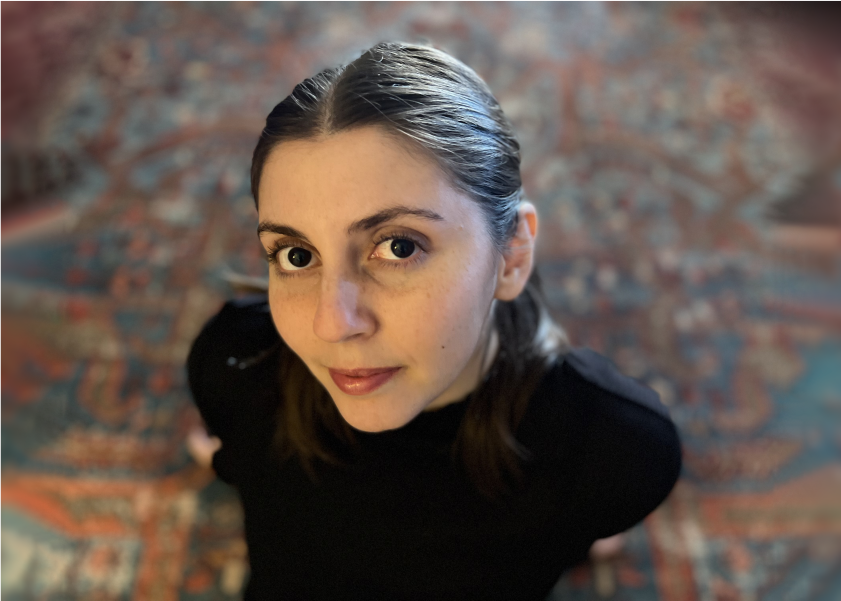
Árabe is Amanda Ekery’s ongoing genealogy composition/research project that focuses on Syrian immigration to El Paso/Mexico, her family’s history, and the influence these mixed cultures had on film, food, economy and music. She collaborates with community members to write lyrics, gather artifacts and interrogate multiracialism to create compositions and gatherings with others.
In working with the Syrian Ladies Club of El Paso, SWANA scholars, food anthropologists and her family, Amanda has heard commonalities across generations. There are shared feelings of belonging and isolation across cultures, and she is most interested in connecting personal stories to historical lineage.
During her residency, Amanda will be leading songwriting workshops focusing on themes of assimilation, identity, belonging, and love. Community members are integral in this process and are encouraged to participate in the workshops where they will share their experiences, personal histories, and family memories to write their own original music.
Amanda Ekery is a Syrian/Mexican American vocalist, multi-instrumentalist and composer from El Paso, TX. She weaves her experience in underground rock, improvisatory creative music, research, and jazz into her compositions, workshops, and performances. Amanda’s work has earned support from New Music USA, Chamber Music America, and the Jerome Foundation, and has been featured at the Portland Jazz Festival, Panama Jazz Festival and The Kennedy Center. Amanda is a dedicated teaching artist, working with students of all ages at the Metropolitan Opera Guild, Jazz at Lincoln Center, and is the founder of El Paso Jazz Girls, a non-profit organization committed to education equity for young female musicians. www.aekerymusic.com
Dahlia Elsayed & Andrew Haik Demirjian | July-Aug. 2022
In their collaborative work, Dahlia Elsayed and Andrew Haik Demirjian create immersive visual and sonic environments that pull from the past and anticipate alternative futures. Their interdisciplinary practice uses painting, sculpture, sound and language to construct experiential narratives based on contemporary and historical research and influenced by their Southwest Asian and North African backgrounds.
While in residence at AANM, they will develop Souvenirs from the Future, a speculative fiction presented as an ethnographic study that imagines the material culture of Mustaqbaaaahpolis, a future Arab city built on the premise of the interchange of ideas, aesthetics and knowledge. Pulling from traditional modes of ethnographic presentations, the artists will create a fictive survey of artifacts that tell the story of Mustaqbaaaahpolis, exploring print culture, rituals, everyday objects as well as its post-capitalist commodities, such as poetry, riddles and music. Rooted in the rich intellectual and cultural histories of cities such as Baghdad, Aleppo, Bukhara and Cairo, Souvenirs from the Future exists as a SWANA imaginary, with a future-history uninterrupted by the fractures of displacement.
Dahlia and Andrew will also host a hands-on artmaking workshop where participants design “found” items for the future museum. The workshop is an opportunity for an aesthetic pause and conscious connection for dialogue, modeling the process of spinning speculative fiction as a creative pathway for responding to the precarity and uncertainty of the present.
Dahlia Elsayed Dahlia Elsayed is an artist and writer who makes text and image-based work that synthesizes an internal and external experience of place, connecting the ephemeral to the concrete. She uses painting, installation and sculpture to make fictional landscapes that refer to east/west marginality in pictorial spaces that are simultaneously flat and real. Her work is based on pairing diasporan narrative with a terra firma, connecting internal and external sense of place and creating myth pictures for placelessness. Her work has been exhibited at galleries and institutions throughout the U.S. and internationally, including the 12th Cairo Biennale, Robert Miller Gallery, BravinLee Programs, The New Jersey State Museum and Aljira Center for Contemporary Art. Her work is in the public collections of the Newark Museum, the Zimmerli Museum, Johnson & Johnson Corporation, the U.S. Department of State, amongst others. Dahlia has received awards from the Joan Mitchell Foundation, the Edward Albee Foundation, Visual Studies Workshop, the MacDowell Colony, Women’s Studio Workshop, Headlands Center for the Arts, and the NJ State Council on the Arts. She received her MFA from Columbia University, and lives and works in New Jersey. Dahlia is Professor of Humanities at CUNY LaGuardia Community College in Long Island City, NY. www.dahliaelsayed.com
Andrew Haik Demirjian builds linguistic, sonic and visual environments that disrupt habituated ways of reading, hearing and seeing. His interdisciplinary artistic practice examines structures that shape consciousness and perception, questioning frameworks that support the status quo and limit thought. The works are often presented in non-traditional spaces and take the form of multi-channel audiovisual installations, generative artworks, video poems, augmented reality apps and live performances. Andrew’s work has been exhibited at The Museum of the Moving Image, The New Museum – First Look: New Art Online, Fridman Gallery, Transformer Gallery, Eyebeam, Rush Arts, the White Box gallery, the Center for Book Arts, The Newark Museum and many other galleries, festivals and museums. The MacDowell Colony, Nokia Bell Labs, Puffin Foundation, Artslink, Harvestworks, Rhizome, Diapason, The Experimental Television Center, The Bemis Center, LMCC Swing Space, the MIT Open Documentary Lab and the New Jersey State Council on the Arts are among some of the organizations that have supported his work. Andrew teaches theory and production courses in emerging media in the Film and Media Department and the Integrated Media Arts MFA program at Hunter College. www.andrewdemirjian.com
Donia Jarrar | April-June 2022
|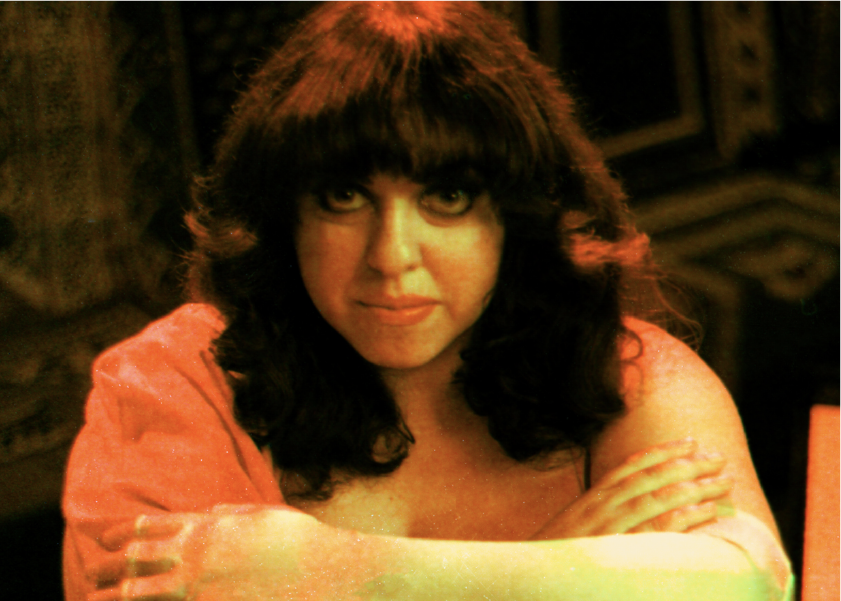
With few exceptions, North African women as figures of darkness have rarely been explored, much less so in music. BUTCHER is a loosely autobiographical concept album based on Donia Jarrar’s own experiences with domestic and intimate partner violence and sexual assault, in which she takes on the persona of a vigilante and antihero doling out punishments through the power wielded to her via a sonic cleaver. While her role is rooted in protecting victims and removing the social stigma in our community preventing survivors from claiming their rights, sexual freedom, and financial independence from their abusers, she is by no means just or angelic. Jarrar is not interested in playing nice. Rather, she aims to explore what is possible when women, non-binary people and queers of all genders defy, disrupt and destroy the patriarchy through violent means and without mercy, drawing inspiration from horror, science-fiction and the erotic.
BUTCHER will delve into the genres of noise, industrial and electronic all while maintaining Jarrar’s signature incorporation of oral histories and field recordings.
During her residency, Donia will be working with and interviewing survivors at ACCESS (Arab Community Center for Economic and Social Services) and hosting community jam sessions with local musicians. The residency will culminate in an evening-length performance of the new work.
Donia Jarrar is a composer, pianist, improviser,and producer known for her unique use of field recordings, working with oral histories and their relationship to the composition and shaping of new musical works across varying genres. She releases music under the solo moniker Phonodelica. HIDDEN ASSEMBLAGES, coming out on limited edition cassette in February 2022 on avant-garde Los Angeles based label Deathbomb Arc, is the first album in a trilogy highlighting the different sides of the artist’s spirituality and sexuality as a woman of Muslim heritage, both light and dark. In 2021, she was named Palestine’s Young Artist of the Year for her large-scale interdisciplinary project, album and sound installation Into the Ether and Out of Our Anguish /عبر الأثير, opening at the AM Qattan Foundation in Ramallah in March 2022. Born to an Egyptian mother and Palestinian father, Jarrar grew up between Kuwait City, Alexandria, Ramallah and New York. Her personal experiences have strongly shaped her compositional voice, leading her to explore themes of intergenerational memory, trauma, identity, exile, displacement, and cultural narrative. Jarrar holds a Doctor of Musical Arts degree from the University of Michigan. She lives in Los Angeles with her chihuahua Lily. www.doniajarrar.net
Suhad Khatib | Feb.-March 2022
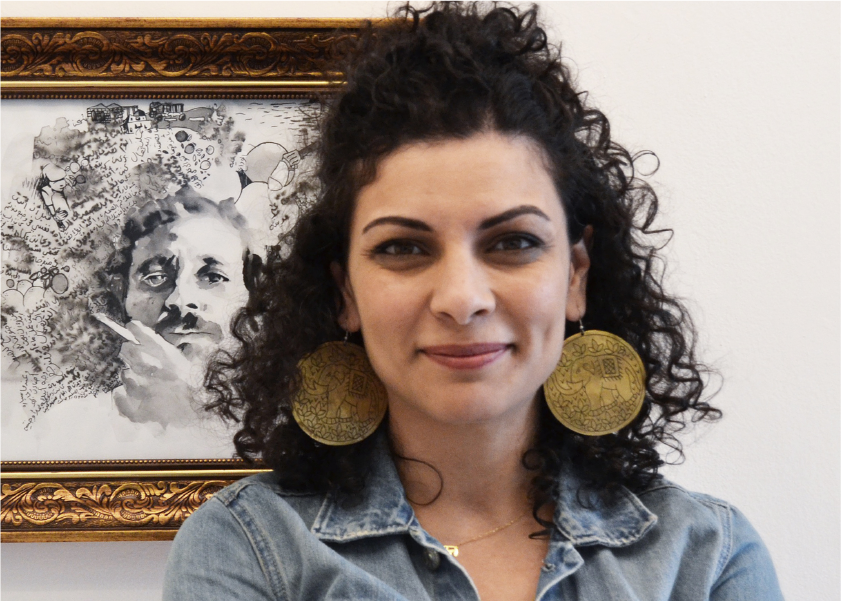
During her residency, taking place remotely, Suhad dove into a post-pandemic study that examines the ways those past years of the pandemic have changed her on a spiritual and artistic level.
She also led Meditation & Art: Virtual Painting Workshops, a 4-part online painting workshop to help students create 4 paintings a week, guiding students through meditation practices and experiments with ink to create a new art practice they can fall back into in a post-pandemic world.
Suhad Khatib (b. 1979) is a prominent activist and provocative artist and thinker. Her practice spans across design, art and film. Her work was published at Hyperallergic and she has been invited as speaker on issues of decolonizing feminism and liberation theology to universities like Berkeley, Harvard, San Diego State University and the University of Minnesota. Born in Oman. Based between Jordan, San Francisco and St. Louis. As the daughter of Palestinian massacre survivors, her art attempts to heal generational trauma and reverse the harm of war economy propaganda through art and philosophy, one painting/study at a time. suhadkhatib.com
Alia Ali | Oct. 2021 + Jan. 2022
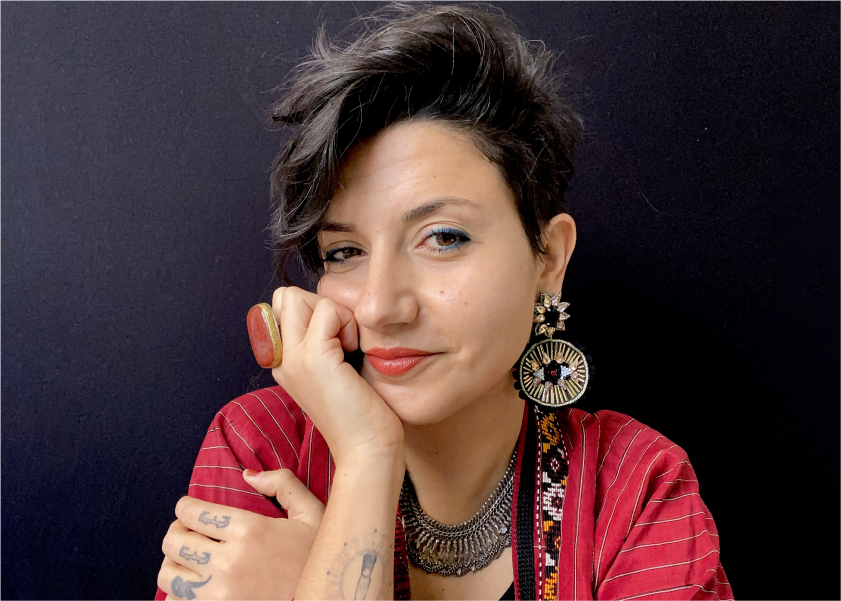
الفلق // al-Falaq by Alia Ali is a site-specific multimedia sculpture, commissioned by the Arab American National Museum, with the generous support of the Andrew Mellon Foundation.
A “museum within a museum” in the form of a Yemeni Futurist Starship named الفلق // al-Falaq, this starship is a manifestation of actively reclaiming looted Yemeni artifacts housed in famous collections in Europe and the U.S. It takes on the form of an octopus sculpture suspended under the AANM dome, with 81 digital screens along the tentacles, displaying a range of experimental videos. The result is an impressive constellation of multi-channel video installations that move vertically across the multiple stories of the Museum’s atrium. The content of the videos embraces a variety of objects, ideas and heritage that الفلق // al-Falaq takes back from Earth to carry into the galaxy towards the Red Star. This notion comes at a moment in time where Yemen is experiencing its seventh year of war and on Earth where there are less and less places for Yemenis to move and exist. By investigating histories of the distant past, Ali addresses the realities of the dystopian present in order to carve out spaces for radically imagined possibilities of the future in what has evolved to be Yemeni Futurism.
During her residency, Alia Ali worked with a team of Detroit-based artists and fabricators on the construction of الفلق // al-Falaq. Programming around this residency included Across Disciplines: Alia Ali & Tarek Yamani, a virtual artist discussion; and a Guided Tour + Artist Talk upon the الفلق // al-Falaq launch.
Alia Ali (Arabic: عاليه علي // Sabean: 𐩲𐩱𐩡𐩺𐩲|𐩲𐩱𐩡) is an award-winning Yemeni-Bosnian-U.S. multi-media global artist who has traveled to sixty-seven countries, lived in and between seven, and grown up among five languages. Her practice explores and rescinds accepted cultural binaries, challenges culturally sanctioned oppression, and confronts the dualistic barriers of conflicted notions of gender, politics, media, and citizenship. Recently her work has been acquired by the British Museum, Princeton University and the Tucson Museum of Art and her art is held in a number of private collections across the world. In 2020, Ali was given a solo exhibition at the prestigious New Orleans Museum of Art entitled FLUX (2019-2021). Recently, her work has been featured in the Financial Times, Le Monde, Art Review and Hyperallergic, and her work was presented at ZONAMACO Mexico City in February 2022. www.alia-ali.com
George Abraham & Fargo Tbakhi | Nov.-Dec. 2021

Fargo Tbakhi and George Abraham are working towards a collaborative poetry and performance project titled EVE — A Palestinian Necropastoral. This project is a re-imagining of Milton’s Paradise Lost through the lens of Palestinian liberation: a Queering and anti-colonial subversion of the many layers of expulsion present within Paradise Lost. Ultimately, EVE poses the story of Palestinian resistance not as a stagnant or tired narrative, but as a futurism that lives and breathes through us.
During their time with AANM, George and Fargo worked to craft a cohesive, self-contained section of EVE which they shared in a live, hybrid performance at the close of the residency period. View performance photos here.
This section will eventually be incorporated into the larger project, potentially to exist as both a book and a staged performance. George and Fargo also led a workshop during the course of the residency, Exploring Poetry through Performance.
Fargo Nissim Tbakhi is a queer Palestinian American performance artist and writer. He is the winner of the Ghassan Kanafani Resistance Arts Prize, a Pushcart and Best of the Net nominee, and a Taurus. He has received fellowships from Rhizome DC, VisArts, Desert Nights Rising Stars, Halcyon Arts Lab, Mosaic Theater, and RAWI. His writing appears in Foglifter, Mizna, Peach Mag, Apex Magazine, Strange Horizons, the Shallow Ends, Prolit, and select bags of Nomadic Grounds Coffee. His performance work has been programmed at OUTsider Fest, INTER-SECTION Solo Fest, the Rachel Corrie Foundation’s Shuruq Festival, the Alwun House Monster’s Ball, Mosaic Theater, and has been supported by the Arizona Commission on the Arts. www.fargotbakhi.com
George Abraham is a Palestinian American poet, writer, and engineer who was born and raised on unceded Timucuan lands (Jacksonville, FL). His debut poetry collection Birthright (Button Poetry) won the Arab American Book Award and the Big Other Book Award, and was a Lambda Literary Award finalist. He is a board member for the Radius of Arab American Writers, and recipient of fellowships from The Boston Foundation, and Kundiman. His poetry and nonfiction have appeared in The Nation, The Paris Review, The American Poetry Review, Mizna, and elsewhere. A graduate of Swarthmore College and Harvard University, Abraham is currently a Litowitz MFA+MA Candidate in poetry at Northwestern University. www.gabrahampoet.com
Zahra Almajidi | Oct.-Nov. 2021
|
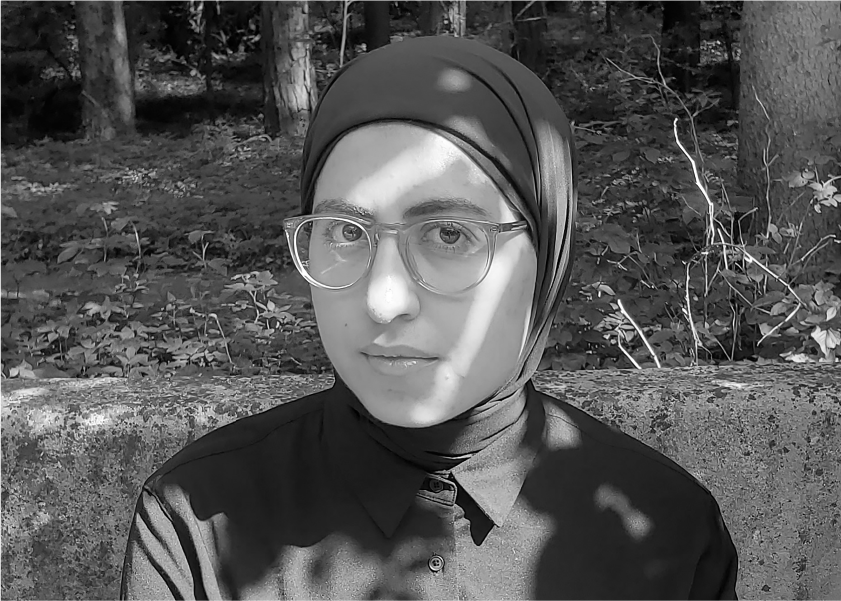
As an object maker, Zahra Almajidi has come to learn the power objects hold in their ability to tell stories, in her case linked, as they are, to a culture and land lost to forced displacement. These very stories are often the only connection people of the diaspora have to their parents’ or grandparents’ culture.
During this residency, Zahra continued her investigation of craft objects, influenced particularly by embroidered woven rugs made by crafts people from an ethnic group her parents belong to known as the Marsh Arabs. She is most interested in orchestrating a narrative, or a world of objects, inspired by her deep respect for the traditions of the village weavers and embroiderers, using individual elements one may encounter throughout their life. Much like the narratives woven and embroidered into the rugs of the Marsh Arabs, her goal is to create her own stories, influenced by her family’s experiences of war, forced migration, and resettlement—experiences familiar to many in the Arab American community.
Referencing traditional folk items in our permanent collection, she reframed motifs and their narratives into her own art, resulting in the exhibition reCRAFTED Histories, on view in AANM’s Second Floor Atrium in 2022.
Zahra also led Re/Crafted Histories, a two-part storytelling session and workshop centered around the mementos, family heirlooms, amulets and charms taken up by those in our local communities.
Zahra Almajidi is a visual artist and metalsmith raised and based in Detroit, MI. Utilizing both traditional metalsmithing techniques and CAD/CAM processes, her work explores the ways in which objects and adornment allow one to question and contend with what it means to exist and to resist within a culture that hesitates to recognize and accept one as they are. She has worked at several art fabrication spaces in Metro Detroit including Wayne State University where she received her BFA in Metalsmithing, Lawrence Technological University where she briefly served as shop co-manager, and Cranbrook Academy of Art where she was awarded the Cranbrook Art Director’s fellowship and recently received her MFA in Metalsmithing. During her last semester at Cranbrook Academy of Art, she was the recipient of several awards and grants including the Red Bull Arts Detroit Microgrant, the Adornment + Theory BIPOC Seed Grant, and the Cranbrook Academy Director’s Award. Select pieces from her thesis installation were purchased by the Cranbrook Art Museum and accessioned into their permanent collection. She regularly participates in fabrication demos and workshops, and exhibits work both locally and nationally. www.zahraalmajidi.com
Leyya Mona Tawil | Sept. 2021
|
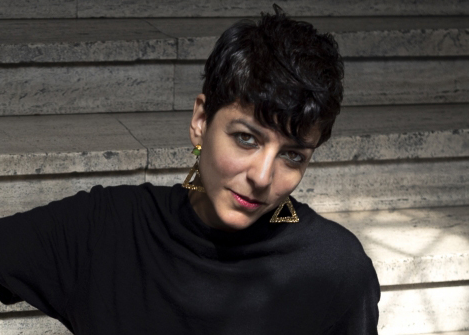
MALAYEEN Voices is an interactive digital project by Leyya Mona Tawil hosted during her residency at the Arab American National Museum, and structured through the MALAYEEN.SPACE web-based audio work.
Throughout the residency, MALAYEEN Voices invites participants to sing their family, folk and homeland songs, which become transformed in the Malayeen.Space based on participants’ unique answers about time, origin, and subject of diasporic experience.
As Lime Rickey International, Leyya performed at AANM’s JAM3A music and arts festival with a set incorporating community songs gathered through the MALAYEEN Voices project, and excerpts from her upcoming work City & World. Leyya also hosted a panel at JAM3A on contemporary Arab dance music and the communities that it creates.
MALAYEEN.SPACE was conceived/designed by Leyya Mona Tawil [Lime Rickey International] and developed in collaboration with Andrej Hrončo (code/design). It exists as part of Lime Rickey International’s Noise & Nation — an accumulation of transmissions that attend to migration, temporality and a post-border dream.
An interactive audio experience in itself, MALAYEEN.SPACE also generates a community sound archive of the diasporic imagination. The song that plays back is modulated by the participant’s unique answers. The audio transformations are governed by the distance (in km) between you and the location of your song’s origin, your distance in time to this place, and the song’s intent.
MALAYEEN.SPACE was created during Leyya’s Net//Work Residency, and was exhibited in May 2021 by the British Council in partnership with Wysing Arts Centre and Digital Arts Studios. It is also supported by the East Bay Community Foundation (Oakland) and the California Arts Council.
Leyya Mona Tawil [Lime Rickey International] is an artist working with sound, performance and hybrid transmissions. Tawil is a Syrian, Palestinian, American engaged in the world as such. Her 25-year record of performances have been presented in the US, Europe, Russia, and the Arab world. She was the 2020 ISSUE Project Room Suzanne Fiol Curatorial Fellow (NYC), 2018 Saari Fellow (FI), and was nominated for a 2019 Bessie Award in Music. Current year residencies include Net//Work @ Wysing Art Centre/British Council (UK), Sharjah Art Foundation, and the Arab American National Museum. She is the director of TAC Temescal Art Center in Oakland-CA, and founder of Arab.AMP — a platform supporting futurist art and ideas from the SWANA diaspora. The work of Lime Rickey International slips between codes of fiction, concept and embodied action in a manner that challenges cultural legibility. Tawil transmits nomadic knowledge through distortions of sonic, digital and physical form in order to cue ways of future building.
Dana El Masri | Aug. 2021
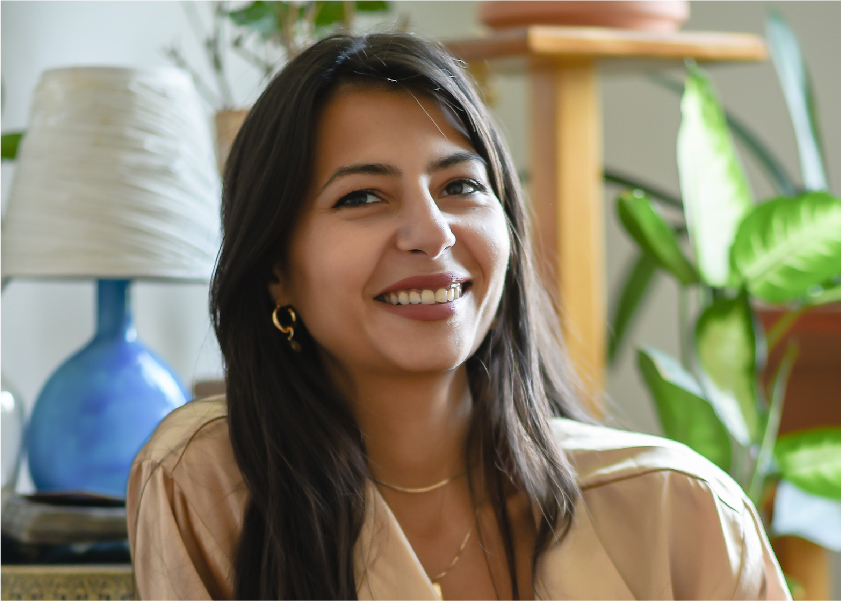
Dana El Masri’s work encompasses bridging different cultures and mediums to create multi-sensory and immersive experiences. Focusing on the importance of our sense of smell in social interaction, cultural belonging and how scents make us feel. Her ultimate goal is to swap the euro-centric lens of perfumery with a multi-faceted, multicultural, flourishing universe of narratives.
During this residency, Dana continued her research on the connections between scent and culture, how it connects us to our memories of home, our sense of identity and living in diaspora. Oral histories can be passed down through scent and food, herbs and plants. In addition to researching olfactory traditions throughout the Southwest Asia and North African regions, and translating and creating a glossary of indigenous plant names, Dana also led two programs connecting people to their own memories with smell: A Scent-Memory Workshop with raw materials from the region, as well as a Smell Walk* in and around Dearborn.
*(based on “Three categories of smells” public smell intro kit, originally created by Kate McLean. The findings of the smell walk will be sent for her Sensory Maps project, adding to a global city database)
Read a reflection on the scents of Dearborn from Dana on the Artists + Residents substack:
Dearborn, through our sense of smell
Dana El Masri is a perfumer, interdisciplinary artist, educator and storyteller whose unique perception is inspired by the sights, scents and sounds of our current contemporary landscape as well as her deeply rooted Egyptian-Lebanese cultures and global life experience. She is the owner of Jazmin Saraï, an artisan line of small-batch, unisex perfumes and scented products handmade in Montreal, Canada. www.jazminsarai.com
Deena Mohamed | July 2021
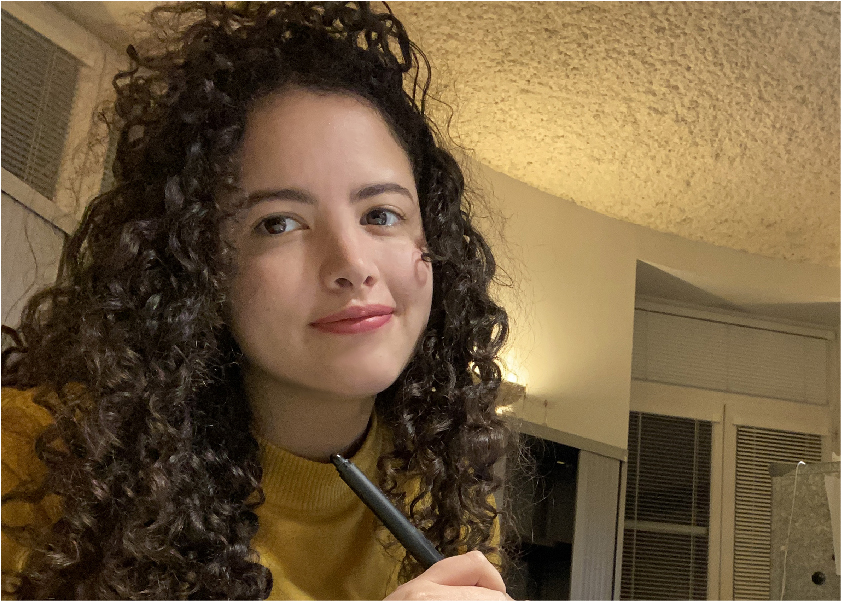
Deena Mohamed’s graphic novel trilogy شبيك لبيك Shubeik Lubeik is an urban fantasy set in Cairo where wishes are literally for sale, and the more expensive they are the more powerful their ability to fulfill your dreams. Shubeik Lubeik tells the story of three first-class wishes and how they affect the lives of three characters trying to achieve their dreams in a wildly stratified society. Originally written and published in Arabic in three volumes, it is now set to be published in one combined English volume in 2022.
During this residency, Deena worked on the translation and adaptation of the English language volume of Shubeik Lubeik, including revisions and redrawing of parts of all three volumes. She also worked on planning a video essays/presentations series about Arab comics, to be available free online, with the intention of creating an entry point for anyone wanting to learn more about comics or get into making comics.
As a comics creator working in both Arabic and English, Deena’s writing process involves keeping in mind potential challenges that could impede translation and thinking carefully about cultural references and words without clear equivalences, as well as visual planning strategies for sequential art in multiple languages (particularly, two languages read in opposite directions). As part of her residency she hosted a workshop about the process of translating comics open to all languages, as well as engaging in a live interview and Q&A.
Read coverage of Deena’s translation workshop in the Detroit Metro Times
Deena Mohamed is an Egyptian illustrator and graphic designer who first started creating comics at 18 with the viral satirical webcomic starring a Muslim superheroine, Qahera. Her graphic novel trilogy, Shubeik Lubeik, is an urban fantasy set in Cairo about a world where you can buy and sell wishes. The first volume of the trilogy was awarded Best Graphic Novel and the Grand Prize of the Cairo Comix Festival (2017). All three volumes are published by Dar el Mahrousa in Arabic, and the English translation of all three volumes combined has been acquired by Pantheon (U.S.) and Granta (U.K.), due to be released in 2022. She lives and works in Cairo, Egypt. www.deenadraws.art
Denmo Ibrahim | May-June 2021
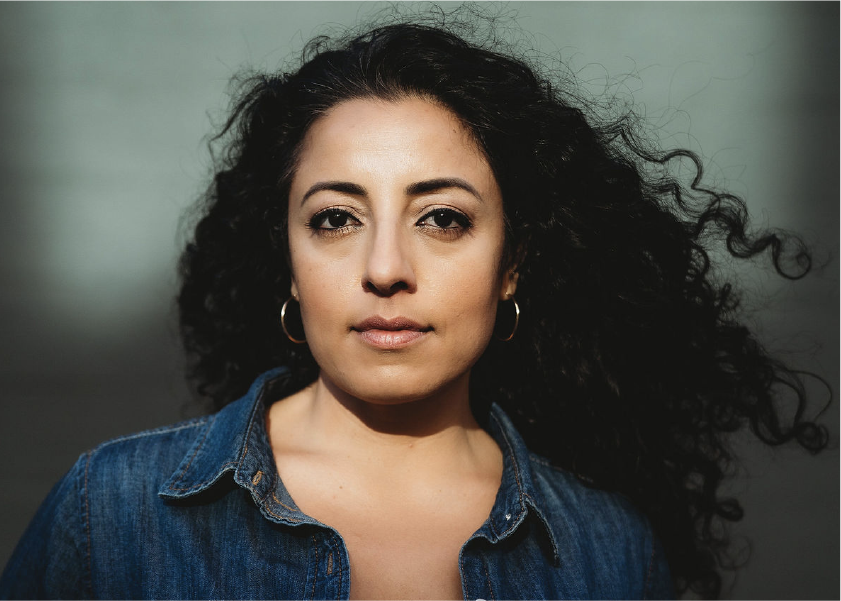
As a first generation Egyptian American, born and raised in New York by immigrant parents with family in Cairo, Denmo Ibrahim often felt conflicted about her own identity and notions of home. In examining the connection between Chekhov’s play Three Sisters and Middle Eastern culture, she found many common themes illuminated, among them the tension of old world and new world mentality, the pressure to marry, the nostalgia for an unrecoverable home, classism, the colonial centering of European culture and the politics of family status.
During this residency Denmo worked on an adaptation of Three Sisters under the working title TALATA, which seeks to challenge racist notions of culturally specific work and caricatures of Arabs, Muslims and those from the Middle East on stage. By working with a classic text and re-imagining it in Dearborn, Michigan, working directly with the local Arab community, TALATA aims to explore classism, misogyny, colonialism and Islamophobia from an interior perspective of being Arab, Muslim, female and American.
AANM held a live virtual conversation with Denmo moderated by Assia Boundaoui; in advance of the presentation of Brilliant Mind by Denmo Ibrahim, a live and interactive digital theatre experience. Denmo also hosted, alongside past AANM artist-in-residence Heather Raffo, a virtual dialogue and workshop around SWANA women’s stories.
Denmo Ibrahim is a first generation Egyptian American actor, playwright, short story author and screenwriter. A Sundance Theatre Lab Finalist, the SF Chronicle called her “a tower of strength in the Bay Area theatre scene.” Regional credits include Berkeley Repertory, American Conservatory of Theatre, The Old Globe, Seattle Rep, Marin Theatre Company and California Shakespeare Theatre. Her devised work has toured to international festivals in Egypt, France and Germany. In the U.S., her work has been supported by New York Theatre Workshop, Under St. Marks, Playwrights’ Center, Noor Theatre, University of Oregon, Golden Thread Productions, EXIT Theater, Alter Theatre and Zawaya. She is the creative director of Storykrapht, a founding artistic director of Mugwumpin, a resident artist of Golden Thread and a founding member of MENA Theatre Makers Alliance. Denmo holds an MFA from Naropa University and BFA from Boston University. A pilot of her new interactive film, The Brilliant Mind of Yusef El Musri, will have its world premiere at Marin Theatre Company (Spring 2021). She lives in San Francisco and Brooklyn. www.denmoibrahim.com
Lara Atallah | April 2021
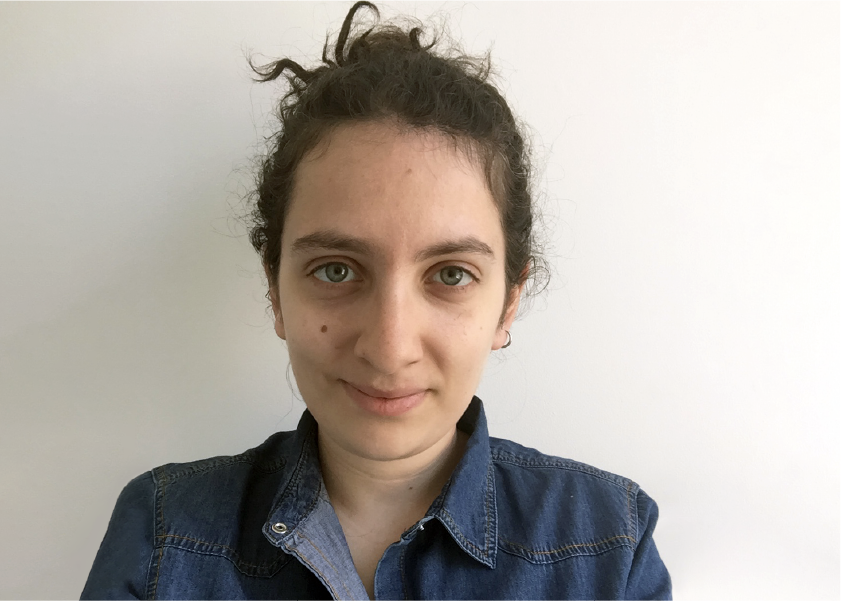
The Sun That Stood Still is an artist book that examines a shifting relationship to a shifting landscape. The book’s title is a reference to the winter solstice, the time at which Lara Atallah flew back to Beirut, Lebanon in 2019 to her recently deceased grandmother’s house. The book is about her grandmother, but also about loss, the Mediterranean, and living in a perpetual state of uprootedness while paradoxically finding grounding by the sea. Bringing together archival photographs and images made during yearly visits to Lebanon, the visuals are held together by a text that weaves a letter that is part ode, part elegy to a place that is perpetually disintegrating.
During her residency, which took place remotely, Lara focused on writing the text for The Sun That Stood Still and building out its layout, going through dozens of photographs made between 2012 and 2019 on her annual visits to Lebanon. Read two contributions from Lara to the Artists + Residents substack reflecting on her process and progress:
Reflections on grief and belonging
Weaving a story using words and images
Lara hosted What’s On Your Plate? a virtual open mic and iftar event, in celebration of Poetry Month and Arab American Heritage Month; a space for writers and musicians to share — what’s on your plate? — both literally and figuratively where writers of poetry, prose, music and more gathered to share their work and reflections.
Lara also paid a virtual visit to students of AANM’s SURA Arts Academy, sharing her experience as a photographer.
Lara Atallah is a New York-based artist and writer. Her practice is informed by her interest in the political nature of landscape, and the power it holds to reshape our perception of borders. Her work has been exhibited in the U.S. and internationally. Her work is part of the Onassis Cultural Foundation’s collection in Athens, as well as the NYU Langone Art Collection. Recent exhibitions include the American University Museum, Trestle Gallery, ON CANAL. Her first book, Edge of Elysium, Vol.1 was published by Open Projects Press in September 2019. Her writing has appeared in Artforum, Camera Austria, Flash Art Italia and The Brooklyn Rail among others. www.lara-atallah.com
Andrea Assaf | Feb. 2021
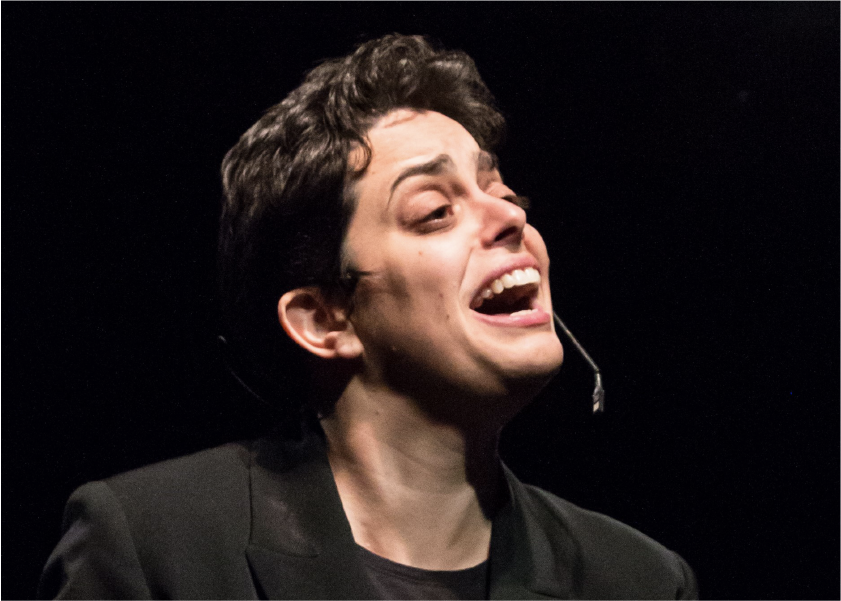
DRONE is a National Performance Network (NPN) Creation & Development Fund Project co-commissioned by the Arab American National Museum, Contemporary Arts Center (CAC) New Orleans, Art2Action Inc., and NPN. DRONE is an Art2Action production, made possible with funding by the New England Foundation for the Arts (NEFA) National Theater Project, with lead funding from The Andrew W. Mellon Foundation and additional support from the Doris Duke Charitable Foundation.
During her residency, taking place remotely, Andrea Assaf will develop the script and media for DRONE, a new play co-commissioned by AANM, while exploring new directions necessitated by the virtual world we now inhabit. The process will include online ensemble-building, and collaboration with interactive website and media designers. Script development will culminate on an online reading of the first full draft, for feedback from theatre professionals.
Community members will be able to engage with the creative process in several ways throughout the residency. The creative team will share research and visual ideas through a blog, and invite audiences to participate in an online Reflection Session exploring themes of surveillance and drone technology in the post-9/11 era. Andrea will also launch an open call for video submissions, responding to specific themes, and offer a workshop for those interested in submitting on how to develop the story you want to tell.
Andrea Assaf is a Lebanese American performer, writer, director and cultural organizer. She is the founding Artistic Director of Art2Action Inc. Her original work, Eleven Reflections on September, has been featured at Oregon Shakespeare Festival (OSF) as part of the National Asian American Theatre Festival, La MaMa, The Apollo Theatre, The Kennedy Center, and internationally. Awards and Recognitions include: 2019 Pushcart Prize Nomination, 2019 NEFA National Theatre Project, 2019 & 2011 NPN Creation Fund Commissions, 2017 Finalist for the Freedom Plow Award for Poetry & Activism, 2010 Princess Grace Award, and more. Andrea has a master’s degree in Performance Studies and a BFA in Acting, both from NYU. She currently serves on the Board of the Consortium of Asian American Theatres & Artists (CAATA), Alternate ROOTS, and is a Steering Committee member of the Middle Eastern/North African Theatre-Makers Alliance (MENATMA). www.art2action.org/artists/Andrea-Assaf
Almigdad Aldikhaiiry | Jan. 2021
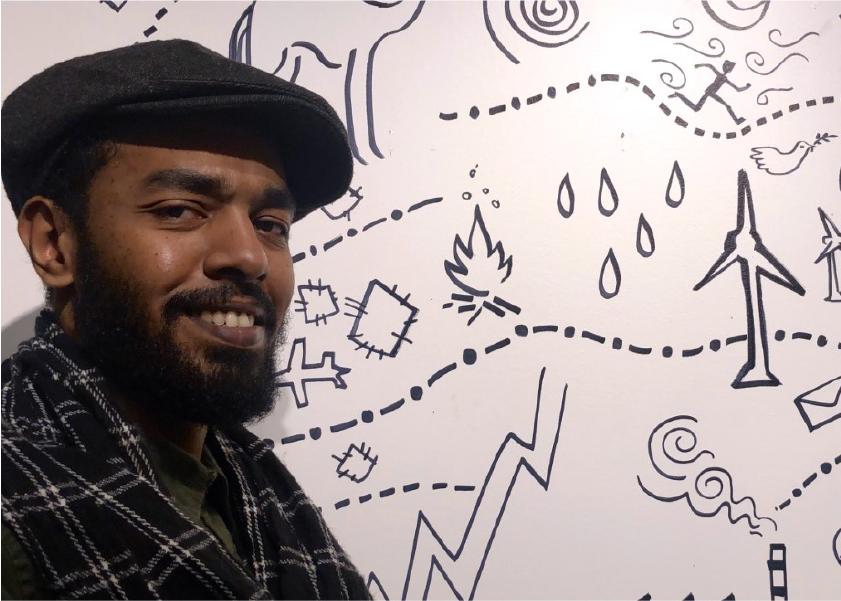
Almigdad Aldikhaiiry is an environmental artist who has devoted his artistic expertise to nature and climate change for over ten years. He also looks at his art as a means to fight crises, especially in this time of the Covid-19 pandemic. Whether long-term, significant changes in our environment happen naturally or in response to human activities, the evidence for rapid climate change is compelling, and Almigdad believes art can make a difference in the way we, as a global community, respond to it.
This residency was spent developing on an oil painting series related to the environment, pollution and climate change, for a future exhibition at AANM, titled كینونة – Existence, including works commissioned by the Museum.
Almigdad Aldikhaiiry is a Sudanese artist currently based in the U.S. Since graduating from the Fine Arts College in Khartoum, he has travelled across the globe working as a painter and contemporary artist for several years. Aldikhaiiry has shown in a variety of prominent galleries across the Middle East. His work has recently been featured in galleries in Los Angeles, New York, Chicago, Denver and Detroit with overwhelmingly positive reception. His most passionate subject continues to be tackling climate change and environment, spending much of the last decade focused on expressing his thoughts and feelings on pollution and the environment through his art, as he firmly believes the work of artists and his contribution can make a difference by creating attention and awareness.
Zahir Janmohamed | Nov. 2020
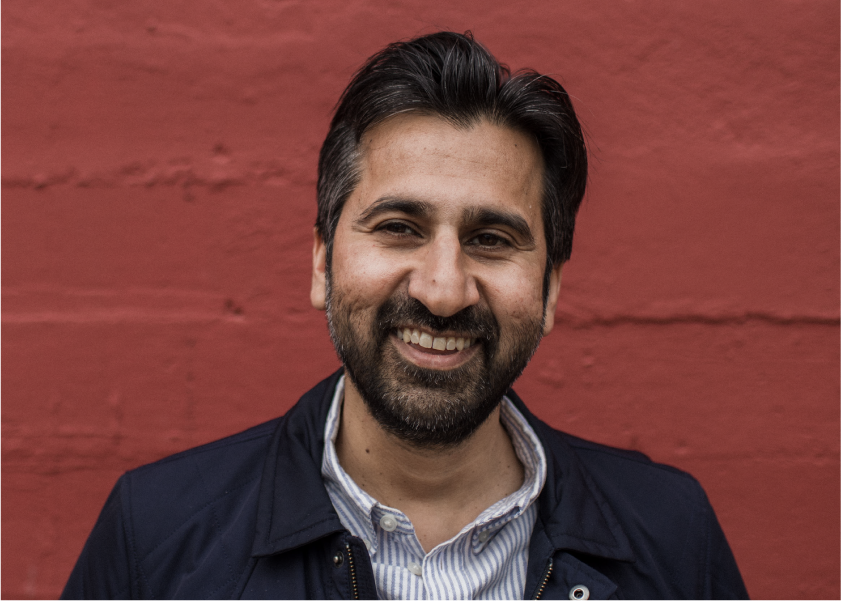
From the coronavirus pandemic to the Beirut blasts to the U.S. elections, 2020 has been intense. Writer/journalist Zahir Janmohamed’s focus with this residency was on telling and documenting 2020 stories.
Zahir led Telling Our 2020 Stories, an online interactive writing workshop series to help participants write and develop their own stories about what they are going through the pandemic and this intense year, with sessions focusing on personal essay writing, poetry and visual storytelling and food writing. Each workshop featured guest speakers from the metro Detroit area who are experts in their field. The series concluded with an online Share-out & Discussion in which participants were invited to share their writing and stories.
Zahir is also spent his residency looking at the impact of the Coronavirus pandemic on Arab and Arab American communities in the U.S. with a focus on Dearborn, sharing blog posts around the election, pandemic-related domestic violence spikes and more through a substack newsletter. This culminated in a piece for Eater Detroit focused on how Dearborn’s Arab American food scene has been coping amid the pandemic.
Zahir Janmohamed is a Zell Writing Fellow at the University of Michigan, where he received awards in fiction, nonfiction, poetry and playwriting. His articles have been published in The New York Times, The Guardian, The Washington Post, Foreign Policy, Guernica and many other publications. He has received fellowships and scholarships from MacDowell, Tin House, Bread Loaf, Kundiman, VONA and Djerassi. He is also the co-founder of the James Beard nominated podcast Racist Sandwich and now serves on the James Beard Journalism Committee. Prior to beginning his writing career, he worked as a senior foreign policy aide to Keith Ellison in the U.S. Congress and as the Advocacy Director for the Middle East and North Africa at Amnesty International.
Leila Awadallah | Sept.-Oct. 2020
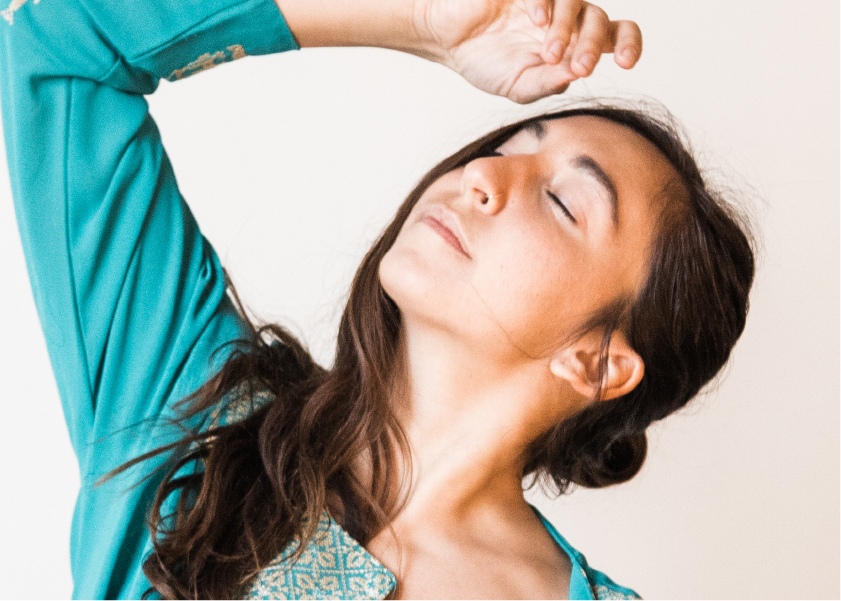
TERRANEA: hakawati of the sea is an interdisciplinary dance performance developed by dancer/choreographer Leila Awadallah, rooted in dance-making that weaves historical, cultural and mythological archives of the Mediterranean region.
During this residency, Leila worked on weaving together stories centering SWANA bodies in relation to the sea while developing TERRANEA, in collaboration with the community through Mediterranean: Mythology, Migration, Memory, an open call for audio recordings to be incorporated into the performance.
Along with dancers Anurima Kumar and Elisandra Mairym Rosario, Leila conceived and performed in Body Watani: soul speak, a drive-in dance performance that took place in the parking lot behind AANM, amid a circle of car headlights; each short performance a unique meditation on ancestral roots, internal and collective healing, and finding fire within our body soul.
Leila also put out a call for dance video submissions for Distance Dance!, a film project to find ways to dance together from our own homes. Videos were edited together and presented as part of Move American: Screening & Discussion w/ Leila Awadallah & Zaquia Mahler Salinas, an online dance screening event as one of 7 presentations in DISCO RIOT’s Move American series. In addition, she was a panelist/performer at AANM’s annual Forum on Community, Culture & Race, this year titled Community Self-Determination.
Leila Awadallah; LeilAwa is a Palestinian American artist working with embodied research and storytelling through dance performance composed within a human rights and social justice focus. Her artistic practice begins with ‘body watani’—centering the body as a sacred living archive of genetic/cellular memories of histories, lands and roots—a pathway towards healing and connectivity. LeilAwa’s projects and collaborations merge dance with mediums such as film, live music, theatre and durational installation performance pieces primarily in the Twin Cities and Beirut / Sour, Lebanon. RAS ABU AMMAR IS HERE—a collaboration between 3 Palestinian artists (Leila, Noelle Awadallah and Lamia Abukhadra)—was created in and shared through the Daring Dances Fellowship, premiering at AANM in November 2019. LeilAwa performed with Ananya Dance Theatre for 5 seasons, and is a dance teacher and cultural activist, born and based on Dakota land. www.leilaawadallah.com
Mona Kareem | July-Aug. 2020
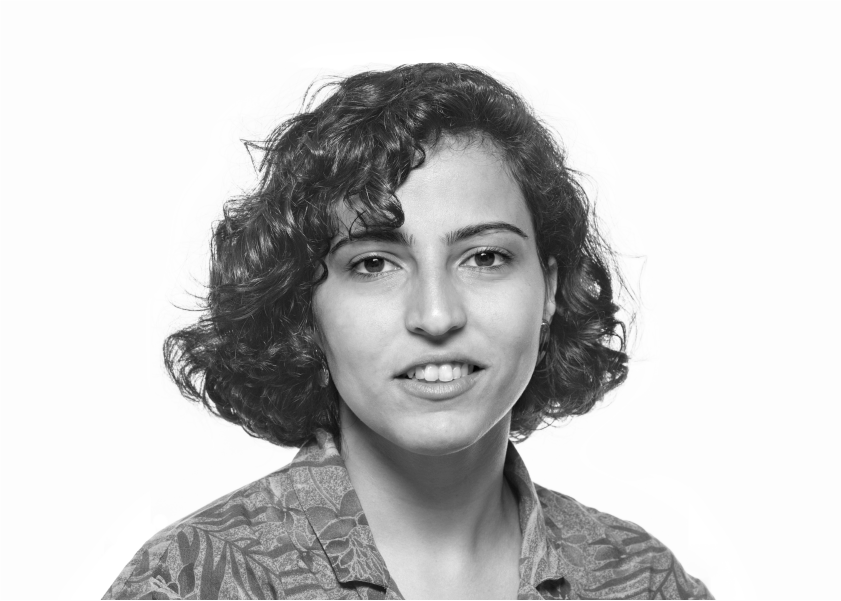
Crossover by writer/translator Mona Kareem is a poetry collection that touches on themes particular to Arab experience/s in the United States: the loss or gain of language, the weight of a marked body passing through airports, the lingua of immigration and bureaucratic violence, and the fetishization of Arab sexuality in visual culture and colonial imaginary. The poems cross a range of narratives, working beyond the typical family-story, as many of us have arrived alone to this continent. They explore what this loneliness entails, especially for the bilingual artist.
Mona’s residency, taking place remotely, was spent finalizing Crossover, also sharing work-in-progress from it during a live reading and conversation with AANM director Diana Abouali. In addition, Mona hosted a virtual workshop on using poetry as a medium to explore and intertwine the personal with the political, centering on themes, practices, theory and/or poetics of translation in relation to expression and narrative. Participants were provided with two texts selected by Mona to review and complete a writing prompt prior to the workshop, which then took place over Zoom, with a close reading of selected texts and open reading and discussion of participants’ poems.
Mona Kareem is the author of three poetry collections, most recently Femme Ghosts (Publication Studio, 2019), a trilingual chapbook. Her work has been translated into nine languages and published in anthologies and periodicals, including Brooklyn Rail, Michigan Quarterly Review, Ambit, The Los Angeles Review of Books, Asymptote, Words Without Borders, Poetry International, PEN English, Modern Poetry in Translation, Two Lines and Specimen. She has held fellowships with Poetry International, BANFF Center, Norwich Center and Forum Transregionale Studien. Kareem has been a featured writer at festivals and conferences in Cairo, Istanbul, Berlin, Amsterdam, Brussels, Seoul, Copenhagen and across the United States. She holds a PhD in Comparative Literature from SUNY Binghamton, and has taught at SUNY Binghamton, Rutgers, Bronx Community College and the University of Maryland. www.monakareem.blogspot.com
Ibi Ibrahim | July-Aug. 2020
|
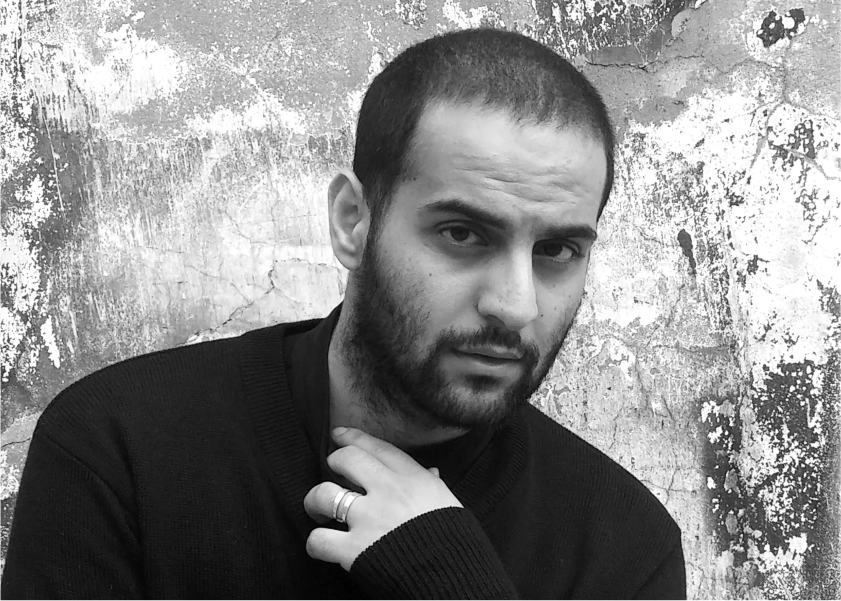
What does it mean for one to be a stranger in their own birthplace/city? Ibi Ibrahim was born in Dearborn in summer 1987, but left with his family shortly after. His connection to Dearborn remained somehow relevant over the years, as it houses the largest Yemeni American community.
During this residency, Ibi sought to examine the Yemeni American experience through interactive activities with young Yemeni Americans living and working in Dearborn today, working with photography and multimedia components to reflect on various elements of the diaspora experience, the war in Yemen and Yemeni American identity.
In his first month stay in Dearborn, in the midst of the city adapting to new norms of Covid-19 policies, it became challenging to undergo certain elements of this proposal. Through meeting a few Yemeni women, Ibi came to realize that the struggle of being a Yemeni woman in Dearborn is far greater than one can imagine, and somehow making a path for ‘their’ dreams takes a village. This took him down the route of developing two projects:
Work #01: Reclaiming Realities | Video
A video work that will consist of audio interviews with three Yemeni American women; each holding her own narrative and story of struggle in becoming, and reclaiming, her reality. The video will address the Yemeni American experience from the perspective of these women, and be accompanied by video footage from Dearborn/Detroit captured by Ibi during the residency period.
Work #02: How do you want to be portrayed? | Photography
A new photography series that deals with the image of the Yemeni American woman within her own environment. Based on initial interviews, the notion of how women are portrayed within the Arab American community in Dearborn was a constant topic. This photo series is an invitation to Yemeni women living in America to work collectively with the artist on how they want to be portrayed/presented in a photo. They control the narrative and story, and by doing so, confirm ownership of their own body/image while confronting stereotypes and perceived notions of Yemeni Women living in America.
AANM also partnered with Ibi and Romooz Foundation to present two film screenings: Yemeni Stories Told by Yemeni Filmmakers, a showcase of documentary short films from various Yemeni filmmakers along with a post-film talkback with some of the filmmakers; and the hit Yemeni film 10 Days Before the Wedding, with Ibi hosting a talkback with director Amr Gamal.
Ibi Ibrahim is a Yemeni American visual artist, filmmaker and art practitioner. He works and lives in Sana’a, Yemen. He is the director of Romooz Foundation, an independent, non-profit foundation dedicated to support emerging Art and Literature in Yemen. In late 2019, he co-founded ARSHEEF, a contemporary art gallery based in Sana’a dedicated to emerging talent. www.ibiibrahim.com
Mariam Bazeed & Kamelya Omayma Youssef | June 2020
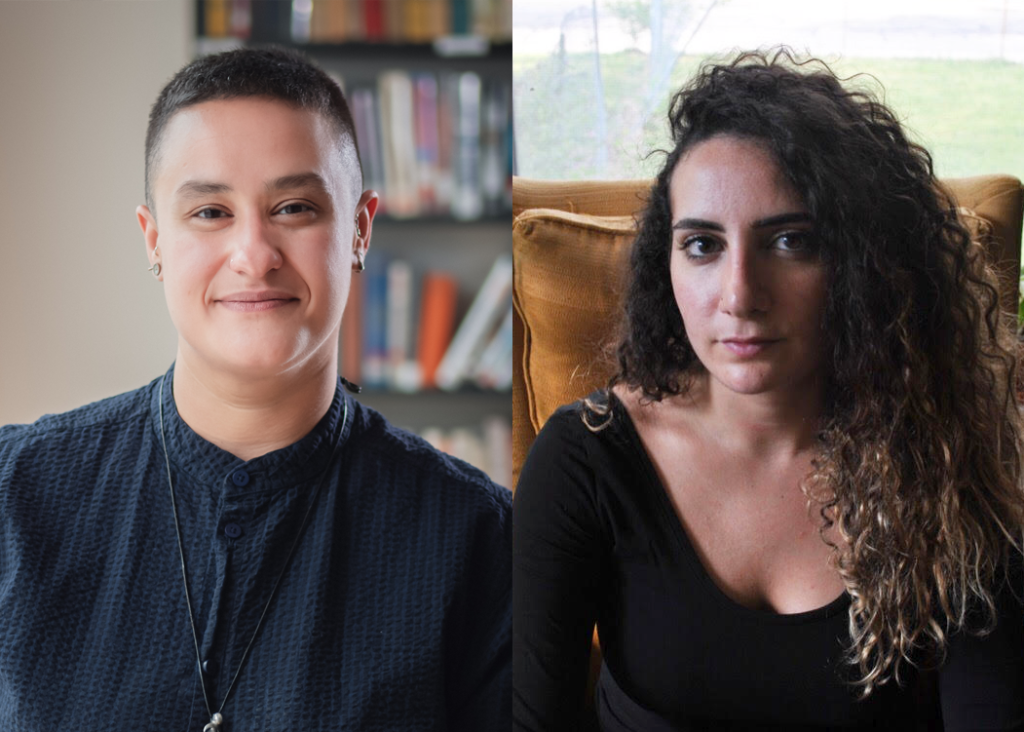
This project is a National Performance Network (NPN) Creation & Development Fund Project co-commissioned by AANM in partnership with NPN. The Creation & Development Fund is supported by the Doris Duke Charitable Foundation, the Andrew W. Mellon Foundation and the National Endowment for the Arts (a federal agency).
Mariam Bazeed and Kamelya Omayma Youssef are co-writing a new play titled Kilo Batra (a play on an Arabic/Egyptian transliteration of “Cleopatra”) in collaboration with Detroit-based theater ensemble A Host of People and its co-director Sherrine Azab. A Host of People creates original, multimedia theater that looks to the past, to speak to the present, in order to imagine and create a better future. The seed of this work is being reimagined from the world in and around Egyptian poet and playwright Ahmed Shawki’s 1927 play The Death of Cleopatra, putting it directly in conversation with issues of contemporary Arab culture and beyond.
AANM and A Host of People later presented an in-person + livestreamed theatrical production of Kilo Batra for four nights in November 2021.
Mariam and Kamelya also hosted a two-part online workshop in conjunction with AANM’s Virtual Book Club, bringing community together for timely and crucial discussions about white supremacy and racism within each of ourselves and within the Arab American community, with exercises from and dialogue around the book Me and White Supremacy by Layla F. Saad.
Mariam Bazeed is a nonbinary Egyptian immigrant, writer, and performer living in a rent-stabilized apartment in Brooklyn. An alliteration-leaning writer of prose, poetry, plays, and personal essays, Mariam received an MFA in Fiction from Hunter College in 2018. M’s work has been supported by fellowships from the Asian American Writers Workshop, the Center for Fiction, the Hemispheric Institute of Performance and Politics at NYU, the Lambda Literary Foundation, Trans Lab, and by Sound Lab at The Brick; and with residencies from Hedgebrook, Marble House Project, the Millay Colony, and the Kimmel Nelson Harding Center for the Arts. M’s first play, Peace Camp Org—available in anthology from Oberon Books, UK—has been presented at La Mama Theater, NYC (2017) in the Squirts Festival of Queer Performance Art; the Arcola Theatre, London (2018), in its inaugural festival of International Queer Playwrights; and The Wild Project, NYC (2018), in the Fresh Fruit Festival, where it won that year’s Spirit Award. To procrastinate from facing the blank page, Mariam curates and runs a monthly(ish) world-music salon and open mic in Brooklyn, and is a slow student of Arabic music.
Kamelya Omayma Youssef is a writer from Dearborn, Michigan. She tends to blur the borders between forms and she hopes that one day borders are obliterated entirely. Her poems and lyric essays have been published in Mizna, the Michigan Quarterly Review, Cordite Poetry Review, Bird’s Thumb, the captions on her instagram posts, an anthology of Arab American creative nonfiction, on the theater stage with A Host of People. Her recent years have consisted of study and formal academic pursuits, including an M.A. in poetry and aesthetic theory, with a specific focus on Etel Adnan’s poetics, at Wayne State University where she also received several poetry awards. Currently, she is an M.F.A candidate in poetry at New York University, where she is working on several manuscripts. She has also developed and presented ongoing research projects on Arab American ecopoetics, Arab American nostalgia, and collaborative SWANA Futurism. Teaching is as central to her life as writing is; Kamelya has been a college instructor for both English and Creative Writing, a high school English teacher, an education coordinator for LEAP at Borj al-Shamaly, an English teacher for immigrant adult learners, and a youth poetry teacher with Detroit’s Inside Out Literary Arts—all the while developing social-justice-centered curriculum for her own classroom and others.
Yasmine Nasser Diaz | March 2020
|
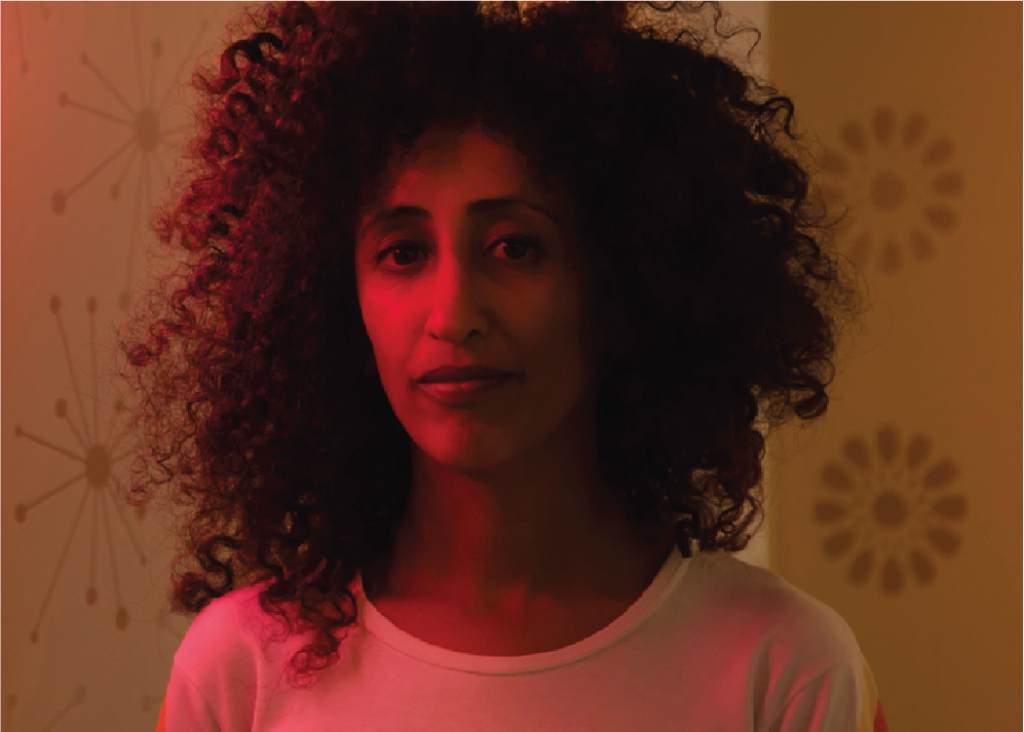
soft powers by Yasmine Nasser Diaz is a solo exhibition that reflects on coming-of-age nostalgia and Yemeni American girlhood, featuring never before shown fiber etchings and a site-specific installation that is a continuation of her “Teenage Bedroom” series. It addresses subjects familiar to many children of immigrants including code-switching, plural identities and conflicting loyalties.
Yasmine worked on development and installation of this exhibition during her residency, including the creation of AANM commissioned pieces.
Yasmine Nasser Diaz navigates overlapping tensions around religion, gender and third-culture identity using personal archives, found imagery and various media on paper as well as installation. Born and raised in Chicago to parents who immigrated from the highlands of southern Yemen, her mixed media work often reflects personal histories of the opposing cultures she was raised within. She has exhibited and performed at spaces including the Brava Theater in San Francisco, the Torrance Art Museum, Charlie James Gallery, and Station Beirut. Diaz is a 2019 California Community Foundation Visual Artist Fellow with works included in the collections of the Los Angeles County Museum of Art, The University of California Los Angeles, and The Poetry Project Space in Berlin. She lives and works in Los Angeles. www.yasminediaz.com
Alia Taqieddin | Feb. 2020
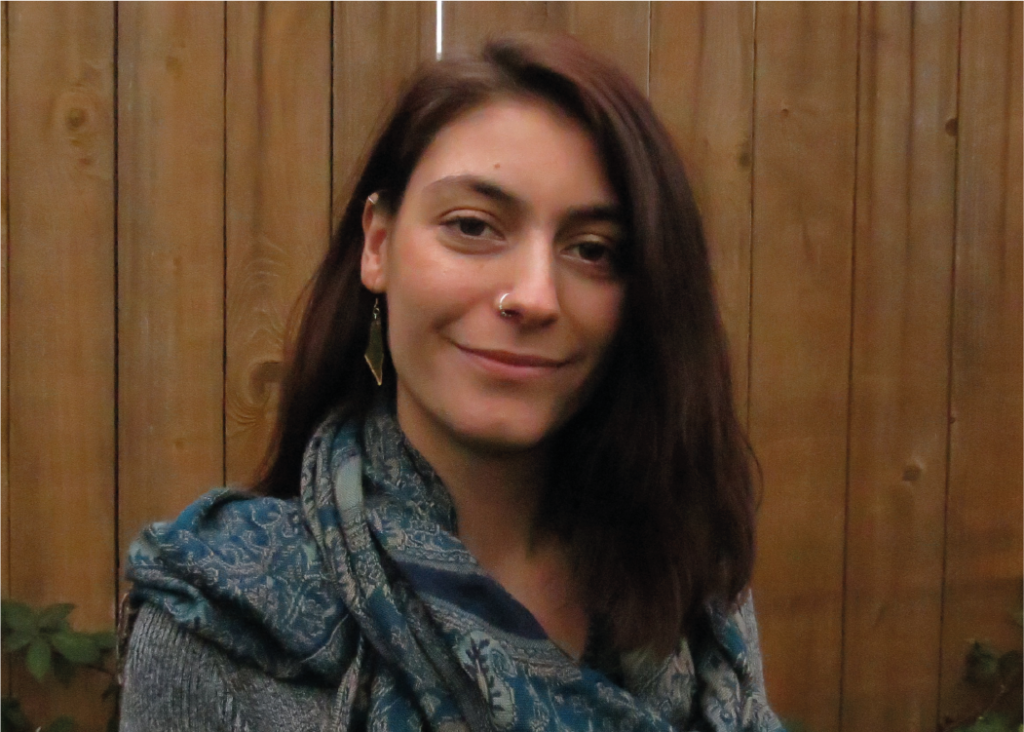
Alia Taqieddin’s residency focused on the curation of a collective memory of Dearborn that is constructed by those who are most intimately tethered to its past, present and future. Through a series of facilitated and recorded conversations, this project explores the complexity of immortalizing a collective imagination. When we choose how memories of Dearborn past are shared, and explore an imagination of future Dearborn, what theses, antitheses and syntheses arise? This project intends to curate a collective memory, which, through the process of recording and archiving, cannot be rewritten, erased or manipulated.
Alia hosted an open conversation with community members at AANM with the goal of collecting memories to create and solidify a narrative for Dearborn; these now form part of AANM’s Oral History collection. This culminated in a DJ audio showcase by Alia incorporating the collected stories, as part of a community reception in conjunction with a theatre performance of And Then We Met… by Masrah Cleveland Al-Arabi at AANM.
Alia Taqieddin is a Seattle-based facilitator and DJ of mixed Shami and western European descent. Her practice explores alternative archival methods as tools for narrating individual and collective ownership of change. She draws from transnational women of color thought, and the stories and imaginations of her family in Syrian diaspora. Her work has appeared as workshop curricula, poetry and audio. Taqieddin graduated in 2018 from Western Washington University with degrees in Critical Arab Diaspora Studies and Community Health. She currently works for the Rachel Corrie Foundation, a non-profit remembering the Washington-based human rights activist through Palestine-centered political and cultural resistance.
Baraa Ktiri | Jan. 2020
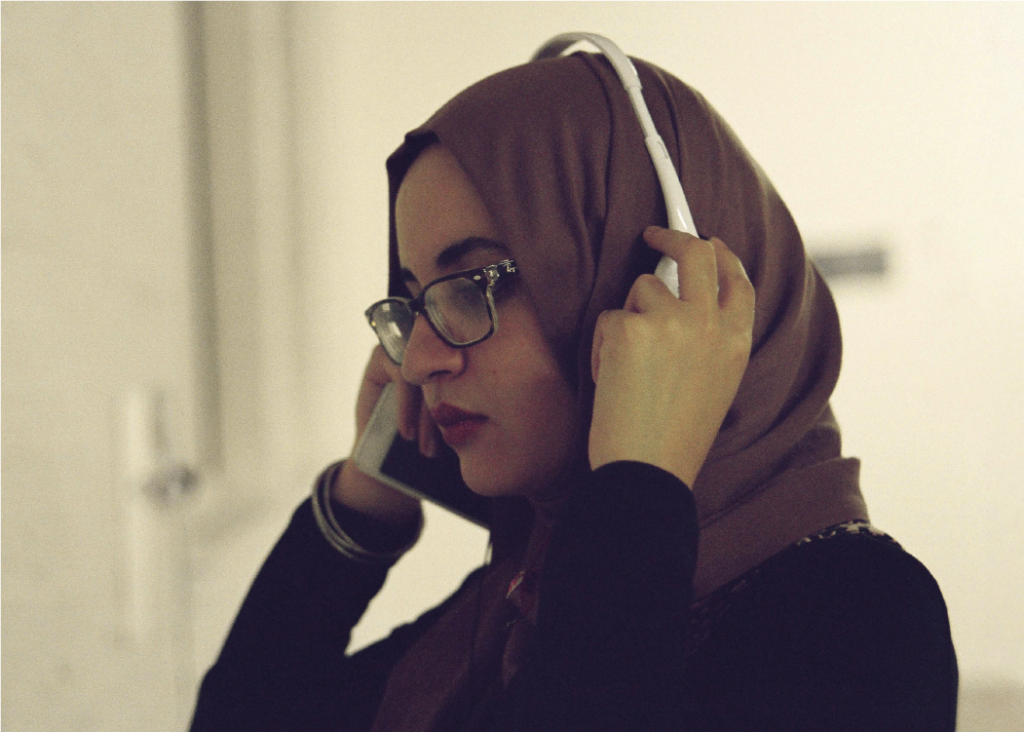
Baraa Ktiri spent her residency working on her documentary series about hijab, For Covered Girls. “I started wearing the hijab when I was ten, and have long since worked towards creating a piece that would highlight the conversations Muslim women and girls have with each other regularly when it comes to this practice of our faith. I see this project both as a love letter to those within my community, and a resource to remind and teach ourselves and others of what came before.” For Covered Girls explores the way hijab operates and exists within the metro Detroit area, specifically from a commercial perspective.
Baraa hosted a filmed roundtable discussion at AANM with Muslim women and girls of all ages and backgrounds, centering on the hijab in all aspects: personal, professional and political, where participants were able to open up about their experiences and complex relationships with hijab. Read coverage of this event by the Detroit News
Baraa Ktiri is a Moroccan American photographer, writer and filmmaker. Often told through a vérité, and conversational style, her personal work centers on religion, immigration and identity. She loves to explore language within her art, and the way those living between cultures blend it. Ktiri began her technical education in photography and video at Oakland Community College, and completed her studies at NYU’s Tisch School of the Arts. www.baraaktiri.com
Maya James | Nov.-Dec. 2019
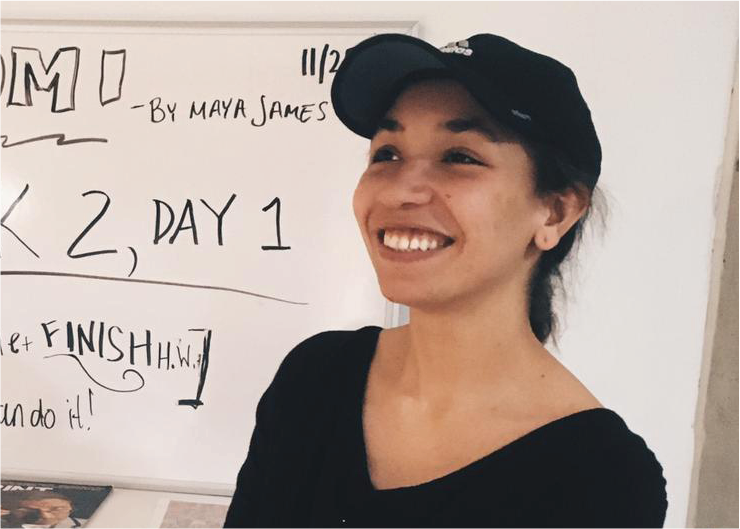
During her residency, Maya James worked on art for her upcoming graphic novel, LUKUMI (Maamoul Press, 2020), which explores the relationships between black women and their environment, history and ancestry, and Afro-Atlantic faith. It follows the relationship between Aida and Clarisse, two best friends of different backgrounds who lose each other before a tragedy which changes Aida’s life forever.
Maya hosted an art talk at AANM on art as business and navigating the marginalized art community in Michigan, discussing her own experience and subjects of resilience, black power, feminism and the next steps for art liberation.
Maya James is a storyteller, spoken word poet, organizing activist, political multimedia artist and president of the NMC Black Student Union. Her work includes storytelling on “Risk!” episode #639 ‘Survivors’, a feature in The New York Times, spoken word at the Portland Poetry Slam of 2013 and with the infamous Climbing PoeTree during their Hagerty Center performance in 2015, art exhibition Hybrid at Twisted Fish Gallery in Elk Rapids, Michigan, and organizing and hosting “What’s Real: Being Gay in Black America”, a night of comedy that united, publicized and funded local social justice groups. She regularly organizes and delivers speeches at community organizations about all forms of social injustice, but particularly the #BlackLivesMatter movement. www.mayamjjames.weebly.com
Levon Kafafian | Sept.-Nov. 2019
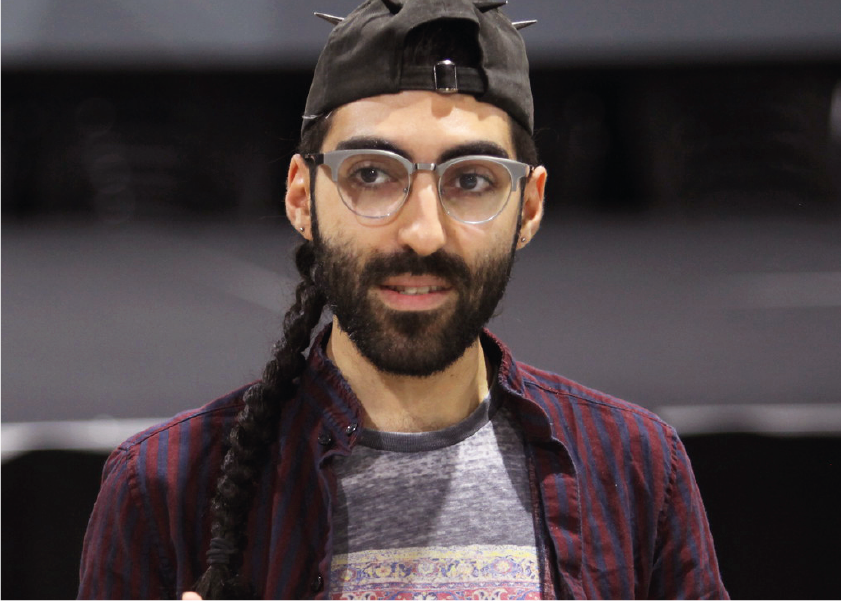
Levon Kafafian used AANM’s historical archives to research ways of life across Southwest Asia during the late Ottoman era in conjunction with the Museum’s Library & Resource Center to research future-facing narratives for a new graphic novel, Portal Fire. It tells the story of an orphan named Maro, their journey through old prophecies and the team of archaeologists who begin excavating remnants of Maro’s city 1,000 years later. Portal Fire is a story born of a desire to see future-facing/speculative narratives and queer representation in graphic arts media depicting Southwest Asian and North African (SWANA) cultures outside of an Orientalist lens.
Levon’s residency culminated in a multimedia exhibition as part of AANM’s Fall/Winter Gallery Pop-up Series. The opening line to the quintessential Armenian folktale, Once There Was and Once There Was Not is an invitation into the speculative past, the incredibility of reality and the fantastic within the mundane.
Levon hosted two workshops during this residency: Weaving Worlds, a workshop exploring the relationship between the crafts of weaving and creative writing, and Reading Coffee, Writing the Future, an informal salon style discussion and workshop on the social and divinatory practices of coffee serving/fortune reading.
Levon Kafafian creates tactile and sensory works on the threshold of transition, applying the process of weaving beyond thread into visual, performative and social practice. Kafafian practices in the Detroit community through the use of textile craft, ancestral lifeways and magical experience, and is co-creative director of Fringe Society, an artist collective that creates hybrid, experimental works toward a more just and equitable future. They hold a BFA in Crafts: Fibers from the College for Creative Studies and a BA in Anthropology from Wayne State University. www.levonkafafian.com
Jacqueline Reem Salloum | Aug. 2019
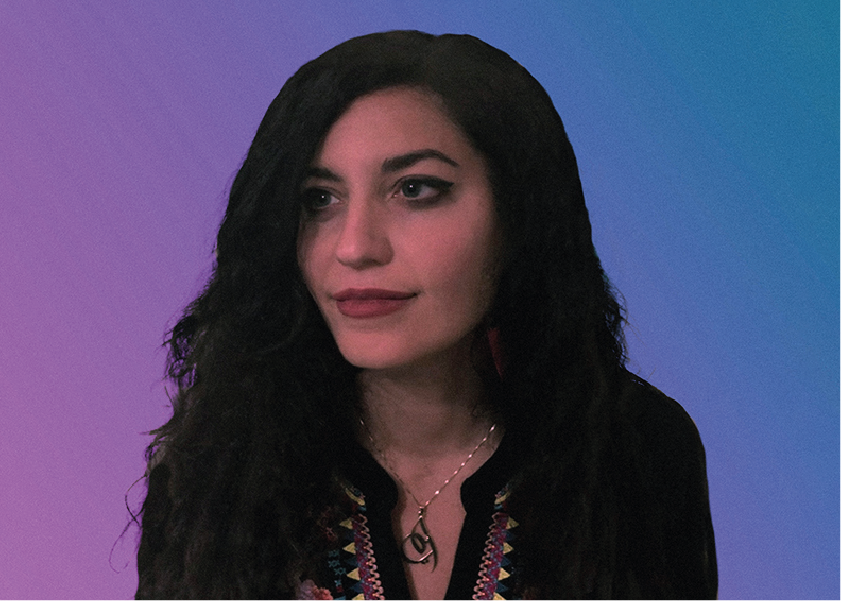
In Memory Metamorphosis & Memory Modulations, an upcoming exhibition at AANM curated by Jacqueline Reem Salloum, memories establish a connection between personal and collective past, heritage and history. They give shape to identity that has been fragmented by displacement, exile and immigration.
During her residency Jacqueline interviewed community members, primarily of an older generation who immigrated to the U.S. in their teens or as adults, using music from a curated playlist based on background info provided before the interview to evoke autobiographical memories. The project aims to document, explore and preserve diasporic memory of Arabs through these video recorded interviews, which are then transformed into various art forms (i.e; sculpture, painting) in addition to being preserved in AANM’s Oral History collection. The art pieces inspired by these memories, along with a selection of works from other artists curated by Jacqueline, will form the exhibition.
Jacqueline Reem Salloum is a Brooklyn based artist and filmmaker of Palestinian and Syrian descent. Her multi-media based artwork focuses on documenting histories and memories of people, including her family, that have been fragmented by displacement, exile and immigration. Salloum’s film work includes experimental video pieces like Planet of the Arabs, which screened at the Sundance Film Festival. She directed the award-winning feature documentary on the Palestinian Hip Hop scene, Slingshot Hip Hop, which premiered at the Sundance film festival. Salloum’s art and video work have been exhibited in solo and group shows in the U.S. and internationally including Mori Art Museum, Japan; Reina Sofia, Spain; Museum of Contemporary Art Taipei, Taiwan; Institute of Contemporary Arts, London; Palazzo Papesse Centre for Contemporary Art, Sienna, Italy, Wallspace Gallery, New York and Void Gallery, Ireland as well as film festivals; IDFA, New Directors New Films, Tiff kids, DoxBox Syria and Beirut International Film Festival. As Artist-in-Residence at New York University (where she also received her MFA) Salloum co-taught the class, Memory Metamorphosis. www.jsalloum.com
Farah Al-Qasimi | July-Aug. 2019
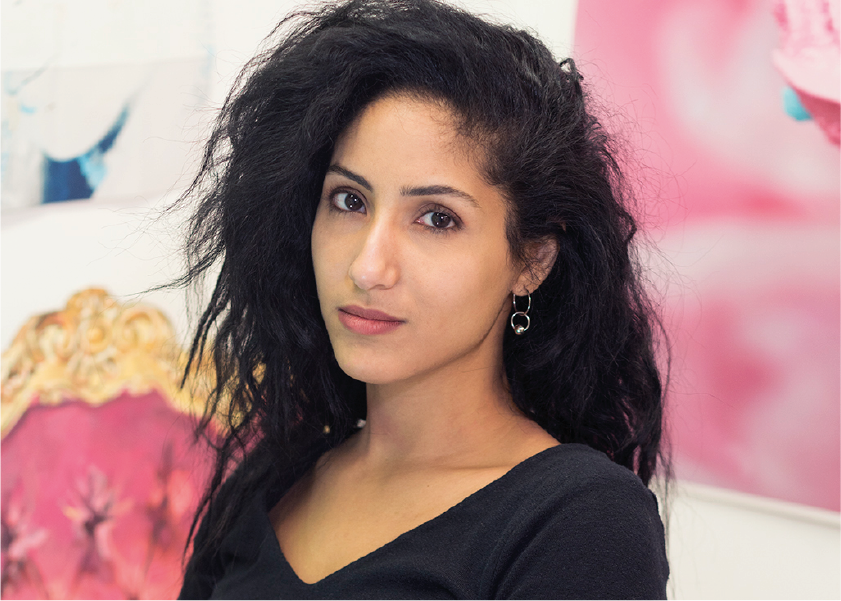
Farah Al-Qasimi’s Between Two Worlds: Arab Americans in Detroit is a photo and video project focusing on the metro Detroit Arab American community, in partnership with Wayne State University and with support from the Knight Foundation.
Farah spent her residency creating a photographic and video-based body of work with the aim of using art as a tool to influence the perception of culture, race and belonging, as well as to reflect the richness of metro Detroit’s Arab American communities. This project culminated in her solo exhibition Brotherville at Wayne State University in Detroit.
Farah also presented a lecture to students of AANM’s SURA Arts Academy, speaking about her journey in becoming a professional photographer and her process.
Farah Al-Qasimi is an artist and musician. She received her BA from Yale University and her MFA in Photography from the Yale School of Art. Selected exhibitions include More Good News at Helena Anrather (NYC), No to The Invasion: Breakdowns and Side Effects at CCS Bard (Annondale-on-Hudson, NY), Coming Up Roses at The Third Line (Dubai), the first Biennial for Arab Photography at Institut du Monde Arabe (Paris), Walls and Margins at the Barjeel Art Foundation (Sharjah) and Emirati Expressions at Manarat al Saadiyat (Abu Dhabi). She has participated in residencies at the Skowhegan School of Painting and Sculpture, the Delfina Foundation, and at the Burren College of Art. In 2014, she participated in the Sheikha Salama Foundation Emerging Artist Fellowship in Abu Dhabi. Her work is housed in public collections including the Barjeel Art Foundation and Maraya Art Centre (both Sharjah, U.A.E.). She is currently based between NYC and Dubai. www.farahalqasimi.com
Frank Waln | April-May 2019
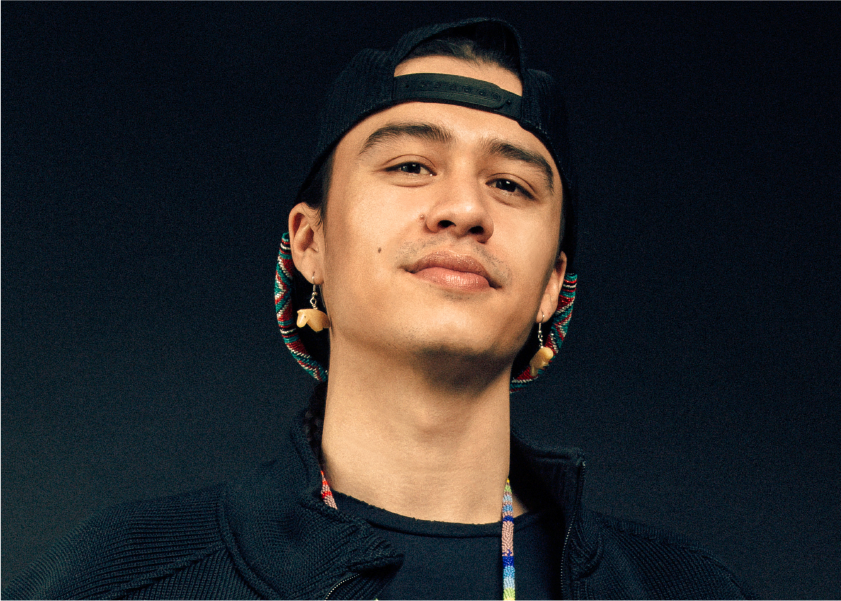
This residency was in partnership with American Indian Health & Family Services (AIHFS) and Palestinian Youth Movement (PYM), and made possible in part by the National Performance Network (NPN) of which AANM is a partner.
Frank Waln first performed at AANM in 2014 and has gone on to earn great acclaim for his artistry and activism, which has focused on the Keystone XL pipeline among other issues affecting Indigenous Peoples. With this residency, he returned to AANM to share stories and music connecting his experience as an Indigenous artist to his 2017 trip to Palestine for the first time publicly.
Frank hosted a community dialogue event at the Museum titled Living Under Occupation: From Turtle Island to Palestine alongside PYM’s Lenna Zahran Nasr, entailing an introspective presentation and discussion on settler-colonialism and solidarity. He later visited a Fordson High School music class, where he shared personal experiences, information on the brutality and genocide against Indigenous Peoples that is not often detailed in schools, as well as some music, encouraging students to find their outlets for expression.
Frank expressed that this residency finally allowed him the time and headspace to fully begin processing, talking about and writing about what he experienced on his artist delegation trip to Palestine. He wrote two new music pieces about Palestine during his time in Dearborn, which he debuted at the culmination of his residency, a concert at AANM. Listen to Frank’s interview with CJAM radio conducted ahead of the concert.
Frank Waln is an award-winning Sicangu Lakota hiphop artist and music producer from the Rosebud Reservation in South Dakota. A recipient of the Gates Millennium Scholarship, Waln attended Columbia College Chicago where he received a BA in Audio Arts and Acoustics. Waln’s awards include three Native American Music Awards, the National Center for American Indian Enterprise Development 2014 Native American 40 Under 40, the 2014 Chicago Mayor’s Award for Civic Engagement and the 2016 3Arts Grant for Chicago Artists. He has been featured in Buzzfeed, The Fader, Playboy, Vibe, NPR, ESPN, and MTV’s Rebel Music Native America. Waln has written for various publications including Decolonization: Indigeneity, Education, and Society and The Guardian. Waln travels the world telling his story through performance and doing workshops focusing on self-empowerment and expression of truth. www.frankwaln.com
Zeyn Joukhadar | March-April 2019
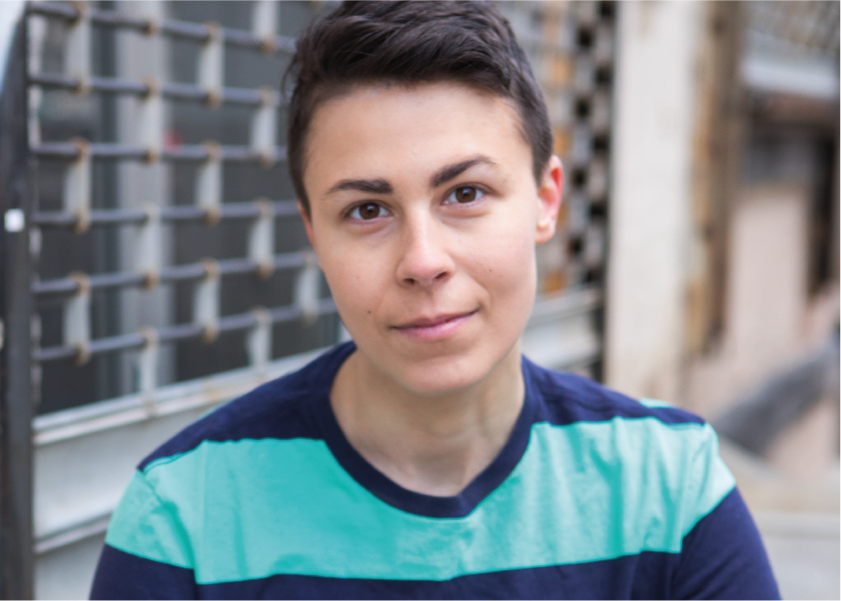
Zeyn Joukhadar used AANM’s archives to research the history of the Syrian American community over the last century for a new novel, which tells the story of two friends separated in the 1930s when one of their families leaves Syria for New York and the contemporary descendant who seeks, against a backdrop of American racism, Islamophobia, and violence, to reunite them before it’s too late.
Zeyn also presented a 7-week workshop series for writers in the community interested in generating new work, developing their writing craft and strengthening their work for publication; and gave a reading and author discussion at AANM’s Book + Print Fest.
Zeyn Joukhadar is the author of novels The Map of Salt and Stars (Touchstone/S&S, 2018) and The Thirty Names of Night (Atria/S&S, 3 Nov 2020) and a member of the Radius of Arab American Writers (RAWI). His work has appeared in Sukoon, Salon, The Paris Review Daily, The Kenyon Review and elsewhere, and has been nominated for the Pushcart Prize. The Map of Salt and Stars, currently being translated into twenty languages, was a 2018 Middle East Book Award winner. He has received fellowships from the Montalvo Arts Center Lucas Artists Program, the Arab American National Museum, the Bread Loaf Writers’ Conference, the Camargo Foundation and the Josef and Anni Albers Foundation. www.zeynjoukhadar.com
Leila Abdelrazaq | Jan.-March 2019
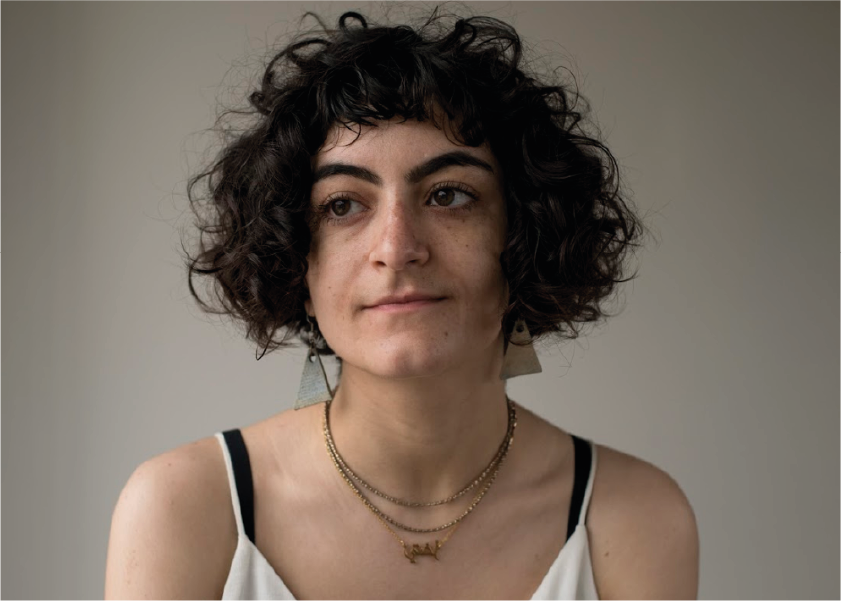
Leila Abdelrazaq utilized her residency to develop an in-progress graphic novel, as well as give an 8-week comics workshop in conjunction with Maamoul Press (of which Abdelrazaq is a co-founder), co-taught by Aya Krisht, geared towards participants of Middle Eastern and North African descent. This workshop provided an intensive theoretical and hands-on learning experience about all aspects of comics and comic-making via lectures, demos, exercises, access to a comics and zines library, studio time and feedback sessions as participants created and self-published their own 8-16 page comics zines. The artists then had the opportunity to share and sell their work at AANM’s 2nd annual Book + Print Fest. Leila and Maamoul Press raised funds to provide each participant with a print and production stipend, in addition to one participant being selected as a RAWI fellow and receiving a grant from RAWI to produce their work.
Leila Abdelrazaq is a Palestinian author and artist born in Chicago and currently living in Detroit. Her debut graphic novel, Baddawi (Just World Books 2015) was shortlisted for the 2015 Palestine Book Awards and has been translated into three languages. She is also the author and illustrator of The Opening (Tosh Fesh, 2017) as well as a number of zines and short comics. Her creative work primarily explores issues related to diaspora, refugees, history, memory and borders. She is co-founder of Maamoul Press, a multi-disciplinary collective for the creation, curation, and dissemination of art by marginalized creators whose work lies at intersections of comics, print making and book arts. Leila earned her MA in Modern Middle Eastern & North African Studies from the University of Michigan in 2020, where she was a two-time FLAS Fellow. Her research focused on Palestinian futurist art and literature and post-national imaginaries. She is currently a contributing writer at Palestine Square, the blog of the Institute for Palestine Studies. www.lalaleila.com
Maria Del Carmen Montoya + Ghana ThinkTank | June-July 2018
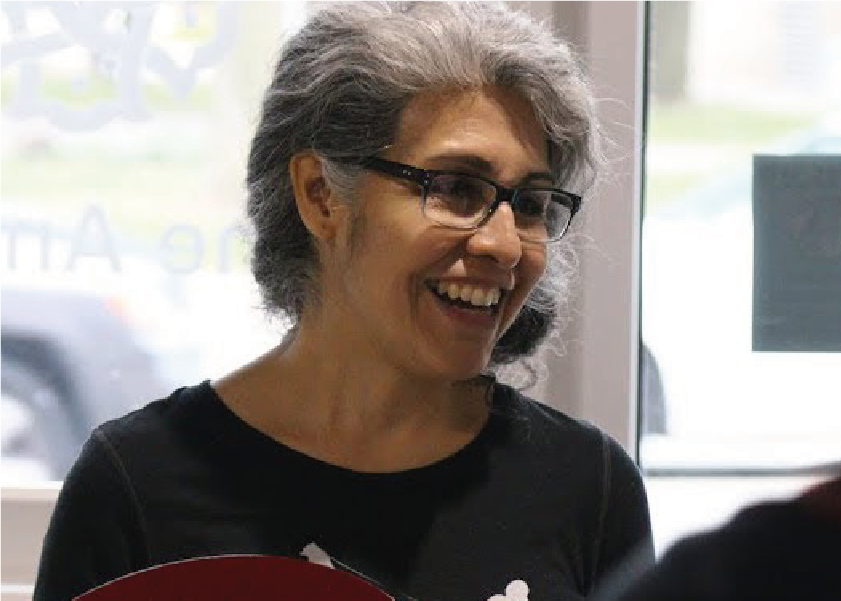
Maria del Carmen Montoya is one of three U.S.-based facilitators for the international arts collective, Ghana ThinkTank, who along with other organizations formed a partnership with a think tank in Morocco to work on American Riad, a three year project of skill-shares and public art between Morocco and Detroit to build a community of affordable homes and businesses with Detroiters.
While in residency at AANM, Maria worked on a Viral Language Lab project to explore different soundscapes in Dearborn with the community. She developed a Viral Language Lab Mobile Unit to create screen prints with community members centered around the language they use. Maria led workshop participants through the process of printing their own words and creating cultural talismans for use in their daily lives. The Viral Language Lab creates a context for critical conversations about subjects including the trauma of gentrification, the urgent need to create safe spaces for women and girls, and strategies for ensuring access to clean drinking water. This mobile unit made stops at the Museum’s Arab Film Festival as well as other community locations, later traveling to California and Washington, D.C. after its launch at AANM.
Watch a video of the Viral Language Lab
Maria del Carmen Montoya operates in the contested ground between art and social activism. Her primary medium is the communal process of making meaning. As an artist, she seeks ways to catalyze this natural social phenomenon with situations that insist on the power of human-scale intervention in the presumed inevitability of everyday life. She believes that art can be a potent crucible for social change. She has lived and worked throughout Latin America where she served as the sole interpreter for an assembly of rural farms in San Salvador, an advocate for battered women in Ciudad Juarez, Mexico and an English teacher for a craft cooperative in Quetzaltenango, Guatemala. Her work has been shown at SIGGRAPH, PERFORMA, New Museum Festival of Ideas, ZKM | Museum of Contemporary Art, Venice Biennial of Architecture and Centro Mexicano para la Música y las Artes Sonoras, in Morelia, Mexico, where she co-founded an artist residency for multimedia performance art. Montoya is an assistant professor in sculpture and spatial practices at the Corcoran School of Art and Design at George Washington University. www.lajunkielovegun.com/MariaDelCarmenMontoya
Ping Chong & Co. + Sherrine Azab | April-May 2018
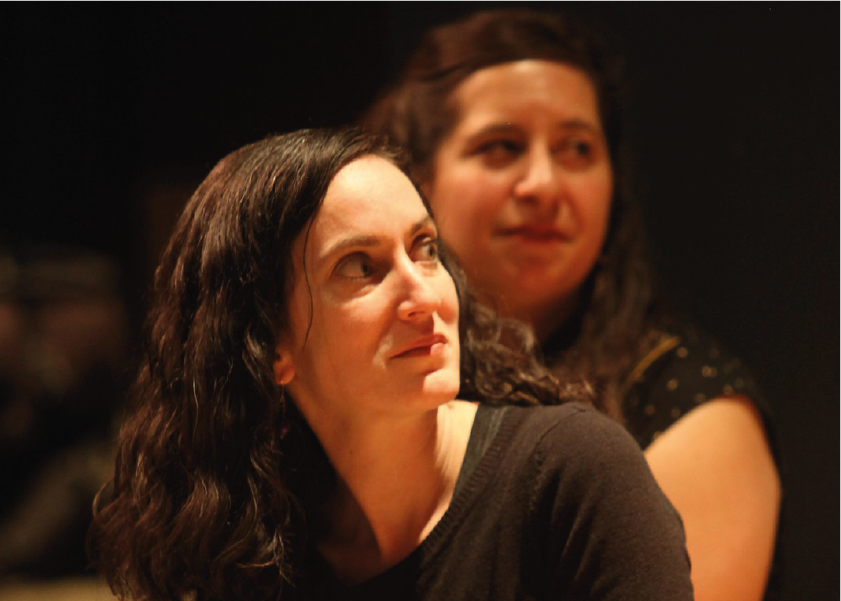
The pioneering site-specific community theater project Undesirable Elements is an ongoing series of interview-based theater works by the world-renowned Ping Chong + Company, examining issues of culture and identity in specific communities. Rather than a traditional play or documentary-theater project performed by actors, Undesirable Elements is presented as a chamber piece of story-telling; a “seated opera for the spoken word.”
During this residency, Ping Chong + Company worked with Arab American women from Dearborn to reclaim their stories and dispel stereotypes and misconceptions, creating the theatrical production Undesirable Elements/Dearborn, co-written and directed by Ping Chong + Company associate director Sara Zatz and A Host of People co-director Sherrine Azab. Interviews—adapted and occasionally theatricalized—formed the basis of a script weaving participants’ individual experiences together in a chronological narrative, connecting the personal to the political. The interviewees retained the final right of review and approval on the script, which was performed by them in a live theatrical production accompanied by a livestream.
Ping Chong + Company produces theatrical works addressing the important cultural and civic issues of our times, striving to reach the widest audiences with the greatest level of artistic innovation and social integrity. The company was founded in 1975 by leading theatrical innovator Ping Chong with a mission to create works of theater and art that explore the intersections of race, culture, history, art, media and technology in the modern world. Today, Ping Chong + Company produces original works by a close-knit ensemble of affiliated artists, under the artistic leadership of Ping Chong. Productions range from intimate oral history projects to grand scale cinematic multidisciplinary productions featuring puppets, performers, and full music and projection scores. The art reveals beauty, precision, and a commitment to social justice. www.pingchong.org
Noor Theatre + Ismail Khalidi | Dec. 2017
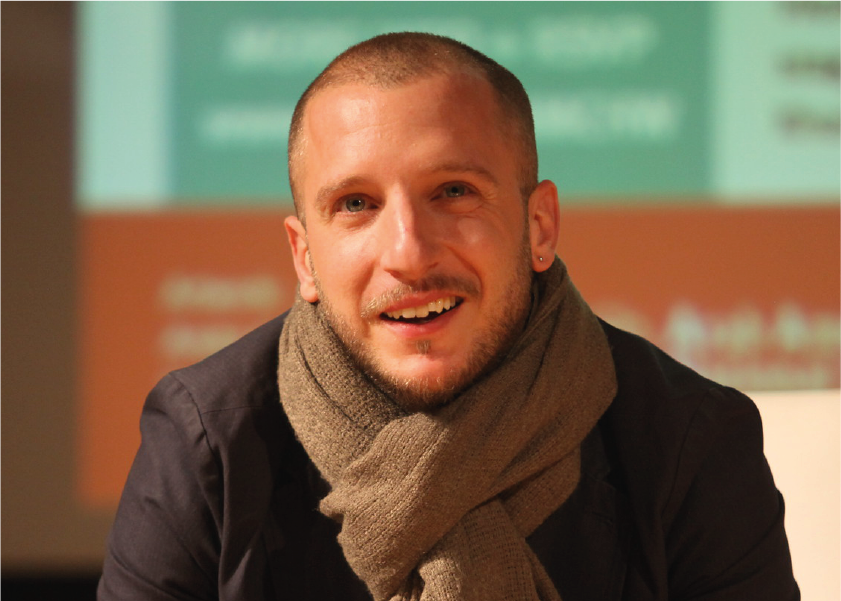
This residency was made possible in part by the National Performance Network (NPN) of which AANM is partner, and MAP Fund.
During his residency Ismail Khalidi along with Noor Theatre worked on the development of a new theatrical work, Dead Are My People. The story follows Nicola, who having fled the famine-stricken mountains of Lebanon for the U.S. during WWI, hopes to track down his uncle Tanios who emigrated years before. Finding few traces of Tanios besides his peddler cart, and conflicting information of townspeople, Nicola must ultimately navigate the treacherous terrain of the Jim Crow South.
A staged reading of Dead Are My People was performed at AANM, with music by Hadi Eldebek. The performance was presented in conjunction with AANM’s exhibition THEM: Objects of Separation, Hate and Violence, a project created by the Jim Crow Museum to highlight hurtful stereotypes.
Ismail also participated in a panel discussion titled White Supremacy: Arab and African American Experience in the Jim Crow South at the Charles H. Wright Museum of African American History in Detroit. Watch the panel here.
Ismail Khalidi, born in Beirut to Palestinian parents and raised in Chicago, is a playwright and director who has written, directed, performed, curated and taught internationally. Khalidi’s plays include Tennis in Nablus (Alliance Theatre, 2010), Truth Serum Blues (Pangea World Theater, 2005), Foot (Teatro Amal, 2016-17), Sabra Falling (Pangea World Theater, 2017), Returning to Haifa (Finborough Theatre, 2018) and Dead Are My People (Noor Theatre, 2019). Khalidi’s plays have been published in numerous anthologies. His writing on politics and culture has appeared in The Nation, Guernica, American Theatre Magazine and Remezcla. His poetry and plays have been published by Mizna, and he co-edited Inside/Outside: Six Plays from Palestine and the Diaspora (TCG, 2015). Khalidi has received commissions from the Actors Theatre of Louisville, Noor Theatre, Pangea World Theatre and The Public Theatre, and has been a Visiting Artist at Teatro Amal in Chile. He holds an MFA in Dramatic Writing from NYU’s Tisch School of the Arts. www.ismailkhalidi.com
Noor Theatre is an Obie-winning Company dedicated to supporting, developing and producing the work of theatre artists of Middle Eastern descent. its programming supports work at different stages of development, whether early drafts of new plays or world premiere productions. Through its Highlight Reading Series, co-presentation partnerships with universities and other organizations, and Premiere Productions or 48 Hour Forum, its aims to create exceptional work that transcends cultural boundaries and speaks to all people. Noor Theatre is a Company-In-Residence at New York Theatre Workshop. www.noortheatre.org
National Arab Orchestra (NAO) + Mohannad Ghawanmeh | July-Oct. 2017
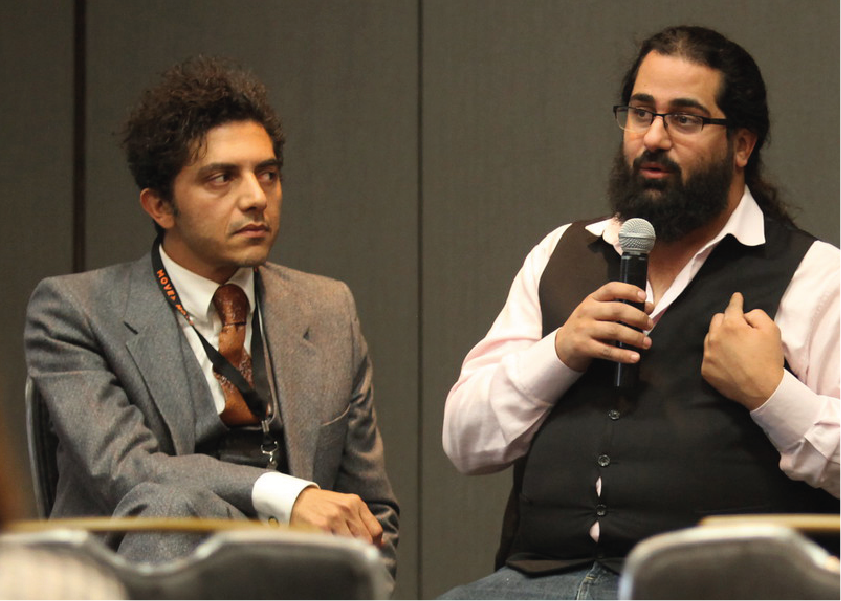
This project is a National Performance Network (NPN) Creation Fund Project co-commissioned by AANM, the City of Chicago and NPN, in partnership with the National Arab Orchestra (NAO), with additional support from the Detroit Institute of Arts (DIA).
In this residency, National Arab Orchestra founder/director Michael Ibrahim created an original score to accompany rarely-seen silent films from the 1920s and 1930s by pioneering Egyptian director Mohamed Bayoumi, in consultation with Egyptian history and film scholar Mohannad Ghawanmeh.
A screening of The Films of Mohamed Bayoumi featuring the world premiere of the live score by the National Arab Orchestra—with nine musicians of the NAO Takht Ensemble playing both traditional Arab and contemporary instruments—was held at the DIA, as the Friday Night Signature Event of the first annual MOVE Arab American Summit, of which AANM is a co-host. This first of its kind in North America combination of historical instrumentation and silent film was enmeshed with narration by Ghawanmeh preceding each film segment.
Ibrahim and Ghawanmeh also participated in a panel discussion at MOVE, discussing the creative process behind the project, the historical significance of the films, how they relate to the music and modern interpretation.
The National Arab Orchestra is a nonprofit organization dedicated to preserving and integrating Arab culture by creating memorable musical experiences through education and performance, with emphasis on the musical traditions of the Arab world. The NAO is dedicated to preserving and performing the classical and contemporary traditions of Arab music, and provides opportunities that will bridge social and cultural barriers through music. www.araborchestra.org
Michael Ibrahim is a dynamic conductor and a recognized innovator in the Arab music circuit. He began his musical studies on the ‘Ud, later studying the Bassoon and Nay as his musical training progressed. Ibrahim studied under renowned musicians Simon Shaheen, Johnny Sarweh, Nadeem Dlaikan, Douglas Bianchi, Anthony Iannaccone, Dr. David Pierce, Robert Williams and Victoria King. He earned a bachelor degree in music from Eastern Michigan University, and a Master of Music degree in conducting from Wayne State University. His role as an educator, providing instrumental and ensemble instruction, lectures and demonstrations on Arab music, privately and in the classroom at university and grade school levels, ultimately brought him to founding the National Arab Orchestra, where he currently serves as Music Director. www.arabmaestro.com
Mohannad Ghawanmeh is a film scholar and cineaste. He has produced, acted in, curated for, written about and lectured on film. His expertise is centered on Arab cinema, but thoroughly extends into silent cinema, non-fiction cinema, transnational cinema, religious cinema and more. He is a PhD candidate in Cinema and Media Studies in the University of California, Los Angeles. Mohannad is recipient of the Teshome Gabriel Memorial Award, the Dr. Jack Shaheen Memorial Scholarship, the Otis Ferguson Memorial Award for Critical Writing, and the Kemp R. Niver Scholarship in Film History. He was a 2017/18 fellow in the American Research Center in Egypt where his dissertation investigated the political economy of silent cinema in Egypt, 1896–1932. www.cinemaarabiata.com
Ayman Yossri Daydban | June-July 2017
|
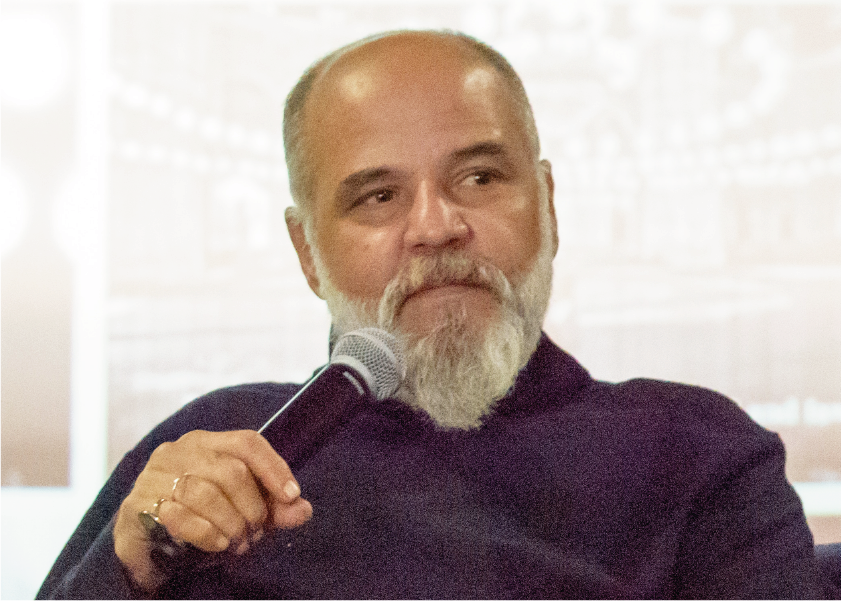
This residency was in conjunction with the AANM exhibition Epicenter X: Saudi Contemporary Art in Dearborn, MI, the first exhibition of its kind from the Kingdom of Saudi Arabia to appear in Michigan.
Ayman Yossri Daydban contributed three works to Epicenter X from his Subtitles series, comprising subtitled film stills reproduced through different mediums. This series emerged from a moment of personal crisis, where Ayman locked himself away and watched films for months on end alone. A non-English speaker, the experience was mediated through subtitles, and although intended as a tool of direct and literal translation, a surreal dissonance manifested. As his immersion in the films consumed him, he increasingly felt the subtitles become unmoored from the image. A gap formed, and the fragments became a productive space for the creation of meaning. Removed from its narrative, each still is transformed; what emerges creatively in the gap between still and text cannot be condemned by the censor nor understood by the audience, but it unleashes a host of powerful new meanings.
Ayman engaged in a live discussion on his work during a community program in conjunction with the opening of Epicenter X and in partnership with CULTURUNNERS.
Throughout the course of his residency Ayman also worked on a series of interventions, entailing extreme censorship, on rare and original Arab film posters, informed by the work of cinema historian Mahmoud Qasim on film poster censorship in the Arab world. He used diverse materials and methods to censor objects in the posters, changing their meanings and form to such a degree as to render them ineffectual. These manipulated posters were displayed in the Museum’s Second Floor Atrium.
Watch a video on Ayman Daydban’s residency and involvement with Epicenter X
Ayman Yossri Daydban was born in Palestine with Jordanian nationality, and now lives in Jeddah, Saudi Arabia. His multidisciplinary practice evolves around the deconstruction of various national narratives with the approach of a watchman or guard. This term translates into English from the artist’s Arabic last name, and mirrors his approach to questions about existence, identity and belonging relating to cultural heritage, national integration, the East/West global melting pot of influence and inter-dependence and the difficulties in assimilation and translation of divergent customs and traditions. Daydban has had numerous solo exhibitions, including Give Me The Light, Jeddah (2016), Common Grounds, Madrid (2014), I am Anything, I am Everything, Jeddah (2012) and Identity, London (2011). He launched his first public art project Change on billboards across Dubai and Sharjah during Art Dubai (2013). Daydban is part of the permanent collections of the Guggenheim Museum, Centre Pompidou, British Museum, Al-Mansouria Foundation, the Abdul Latif Jameel Foundation, BASMOCA, the Salsali Private Museum in Dubai and the Greenbox Museum in Amsterdam.
This residency was made possible in part by the National Performance Network (NPN) of which AANM is partner.
In this residency, Heather Raffo developed her theatrical work Noura, a re-imagining of Ibsen’s A Doll’s House that examines the story of an Iraqi refugee family in New York, highlighting an acutely relevant awakening of identity that tackles the notions of shame, violence, assimilation, exile and love.
This play comes from over three years of Heather’s research in the Middle Eastern American communities in New York City, working with Middle Eastern women on both the telling of their stories and the re-imagining of the many Nouras in their personal lives. This time in Dearborn allowed to her to further conduct research within the local Arab American community and workshop the play, meeting with local artists and community members through various dinners and events, as well as spending considerable time with local Chaldean nuns to hear their stories. Heather expressed that this residency happened at exactly the right place and time to help morph Noura into what it needs to be.
A staged reading of Noura—directed by Joanna Settle and starring Heather Raffo—was performed at AANM, presented in conjunction with AANM’s What We Carried: Fragments & Memories From Iraq & Syria exhibition, which showcases the personal objects carried by immigrants and refugees and their stories. The performance was preceded by an open mic reading and followed by an audience talkback with discussion and feedback on the work.
In collaboration with Detroit’s Matrix Theatre Company, Heather gave a theatrical storytelling workshop at the Museum titled Places of Pilgrimage: Identity & Belonging in America. She also engaged in a talk and dialogue with a group of over 100 theatre students on a visit to Edsel Ford High School.
Heather Raffo is an award-winning Iraqi American playwright and performer. She is the solo performer and writer of the Off Broadway hit, 9 Parts of Desire which details the lives of nine Iraqi women. For her creation and performance of 9 Parts and its national and international tour, Heather garnered many awards including a Lucille Lortel Award, and the prestigious Susan Smith Blackburn and Marian Seldes-Garson Kanin playwriting awards, as well as Helen Hayes, Outer Critics Circle and Drama League nominations, for outstanding performance. She has taught and performed at dozens of universities and arts centers both in the United States and internationally, engaging students about the politics and arts of Iraq and about her own experience as an Iraqi American playwright and actress. Raffo received her BA in English from the University of Michigan and her MFA in acting performance from the University of San Diego. She also studied at the Royal Academy of Dramatic Art, London. Originally from Michigan, Raffo currently lives in New York. www.heatherraffo.com



